U.S. News takes an unbiased approach to our recommendations. When you use our links to buy products, we may earn a commission but that in no way affects our editorial independence.

9 Best Travel Insurance Companies of 2024
According to our analysis of more than 50 travel insurance companies and hundreds of different travel insurance plans, the best travel insurance company is Travelex Insurance Services. In our best travel insurance ratings, we take into account traveler reviews, credit ratings and industry awards. The best travel insurance companies offer robust coverage and excellent customer service, and many offer customizable add-ons.

Travelex Insurance Services »

Allianz Travel Insurance »

HTH Travel Insurance »

Tin Leg »

AIG Travel Guard »

Nationwide Insurance »

Seven Corners »

Generali Global Assistance »
Berkshire hathaway travel protection ».
Why Trust Us
U.S. News evaluates ratings, data and scores of more than 50 travel insurance companies from comparison websites like TravelInsurance.com, Squaremouth and InsureMyTrip, plus renowned credit rating agency AM Best, in addition to reviews and recommendations from top travel industry sources and consumers to determine the Best Travel Insurance Companies.
Table of Contents
- Travelex Insurance Services
- Allianz Travel Insurance
Travel insurance can help you protect the financial investment you made in your vacation when unexpected issues arise. Find the best travel insurance for the type of trip(s) you're taking and the coverages that matter most to you – from interruptions and misplaced belongings to illness and injury.
- Travelex Insurance Services: Best Overall
- Allianz Travel Insurance: Best for Trip Interruptions
- HTH Travel Insurance: Best for Groups
- Tin Leg: Best Cost
- AIG Travel Guard: Best for Families
- Nationwide Insurance: Best for Last-Minute Travel Insurance
- Seven Corners: Best for 24/7 Support When Traveling
- Generali Global Assistance: Best for Medical Emergencies
- Berkshire Hathaway Travel Protection: Best for Specialized Coverage
Customizable upgrades are available, including car rental coverage, additional medical insurance and adventure sports coverage
Medical and trip cancellation maximum are not as high as some other companies
- 100% of the insured trip cost for trip cancellation; 150% for trip interruption
- Up to $1,000 in coverage for lost, damaged or stolen bags and personal items; $200 for luggage delays
- $750 in missed connection coverage
- $50,000 in emergency medical and dental coverage
- Up to $500,000 in emergency medical evacuation and repatriation coverage
SEE FULL REVIEW »
Annual and multitrip policies are available
Distinguishing between the company's 10 travel insurance plans can be challenging
- Up to $200,000 in trip cancellation coverage; $300,000 in trip interruption coverage
- $2,000 for lost, damaged or stolen luggage and personal effects; $600 for bag delays
- Up to $1,600 for travel delays
- Emergency medical coverage of up to $75,000
- Epidemic coverage
Generous coverage at the mid- and high-tier levels, and great group discounts
Preexisting conditions coverage is only available at mid- and high-tier plans
- 100% trip cancellation coverage (up to $50,000); 200% trip interruption coverage
- Up to $2,000 in coverage for baggage and personal effects; $400 in baggage delay coverage
- Up to $2,000 in coverage for trip delays; $1,000 for missed connections
- $500,000 in coverage per person for sickness and accidents
Variety of plans to choose from, including two budget-friendly policies and several more premium options
More limited coverage for baggage issues than other companies
- 100% trip cancellation protection; 150% trip interruption
- $500 per person for lost, stolen or damaged baggage and personal items
- Up to $2,000 per person in travel delay coverage ($150 per day); $100 per person for missed connections
- $100,000 per person in emergency medical coverage, including issues related to COVID-19
Travel insurance policy coverage is tailored to your specific trip
Information about policy coverage inclusions is not readily available without first obtaining a quote
- Trip cancellation coverage for up to 100% of your trip's cost; trip interruption coverage for up to 150% of the trip cost
- Up to $2,500 in coverage for lost, stolen or damaged baggage; $500 related to luggage delays
- Up to $1,000 in missed connection and trip delay coverage
- $100,000 in emergency medical coverage
Variety of plans to choose from and coverage available up to a day before you leave on your trip
Limited trip cancellation coverage even at the highest tier
- Trip cancellation coverage up to $30,000; trip interruption coverage worth up to 200% of the trip cost (maximum of $60,000)
- $2,000 for lost, damaged or stolen baggage; $600 for baggage delays
- Up to $2,000 for trip delays; missed connection and itinerary change coverage of $500 each
- $150,000 for emergency medical and dental issues
Customer service available 24/7 via text, Whatsapp, email and phone
Cancel for any reason coverage costs extra
- 100% trip cancellation coverage (up to between $30,000 and $100,000 depending on your state of residence); interruption coverage for up to 150% of the trip cost
- Lost, stolen or damaged baggage coverage up to $2,500; up to $600 for luggage delays
- Trip delay and missed connection coverage worth up to $1,500
- Emergency medical coverage worth up to between $250,000 and $500,000 (depending on where you live)
Generous emergency medical and emergency evacuation coverage
Coverage for those with preexisting conditions is only available on the Premium plan
- 100% reimbursement for trip cancellation; 175% reimbursement for trip interruption
- $2,000 in coverage for loss of baggage per person
- $1,000 per person in travel delay and missed connection coverage
- $250,000 in medical and dental coverage per person
In addition to single-trip plans, company offers specific road trip, adventure travel, flight and cruise insurance coverage
Coverage for missed connections or accidental death and dismemberment is not part of the most basic plan
- Trip cancellation coverage worth up to 100% of the trip cost; interruption coverage worth up to 150% of the trip cost
- $500 in coverage for lost, stolen or damaged bags and personal items; bag delay coverage worth $200
- Trip delay coverage worth up to $1,000; missed connection coverage worth up to $100
- Medical coverage worth up to $50,000
To help you better understand the costs associated with travel insurance, we requested quotes for a weeklong June 2024 trip to Spain for a solo traveler, a couple and a family. These rates should help you get a rough estimate for about how much you can expect to spend on travel insurance. For additional details on specific coverage from each travel insurance plan and to input your trip information for a quote, see our comparison table below.
Travel Insurance Types: Which One Is Right for You?
There are several types of travel insurance you'll want to evaluate before choosing the policy that's right for you. A few of the most popular types of travel insurance include:
COVID travel insurance Select insurance plans offer some or a combination of the following COVID-19-related protections: coverage for rapid or PCR testing; accommodations if you're required to quarantine during your trip if you test positive for coronavirus; health care; and trip cancellations due to you or a family member testing positive for COVID-19. Read more about the best COVID-19 travel insurance options .
Cancel for any reason insurance Cancel for any reason travel insurance works exactly how it sounds. This type of travel insurance lets you cancel your trip for any reason you want – even if your reason is that you simply decide you no longer want to go. Cancel for any reason travel insurance is typically an add-on you can purchase to go along with other types of travel insurance. For that reason, you will pay more to have this kind of coverage added to your policy.
Also note that this type of coverage typically only reimburses 50% to 80% of your nonrefundable prepaid travel expenses. You'll want to make sure you know exactly how much reimbursement you could qualify for before you invest in this type of policy. Compare the best cancel for any reason travel insurance options here .
International travel insurance Travel insurance is especially useful when traveling internationally, as it can provide medical coverage for emergencies (in some cases for COVID-19) when you're far from home. Depending which international travel insurance plan you choose, this type of travel insurance can also cover lost or delayed luggage, rental cars, travel interruptions or cancellations, and more.
Cheap travel insurance If you want travel insurance but don't want to spend a lot of money, there are plenty of cheap travel insurance options that will offer at least some protections (and peace of mind). These are typically called a company's basic or standard plan; many travel insurance companies even allow you to customize your coverage, spending as little or as much as you want. Explore your options for the cheapest travel insurance here .
Trip cancellation, interruption and delay insurance Trip cancellation coverage can help you get reimbursement for prepaid travel expenses, such as your airfare and cruise fare, if your trip is ultimately canceled for a covered reason. Trip interruption insurance, on the other hand, kicks in to reimburse you if your trip is derailed after it starts. For instance, if you arrived at your destination and became gravely ill, it would cover the cost if you had to cut your trip short.
Trip delay insurance can help you qualify for reimbursement of any unexpected expenses you incur (think: lodging, transportation and food) in the event your trip is delayed for reasons beyond your control, such as your flight being canceled and rebooked for the next day. You will want to save your receipts to substantiate your claim if you have this coverage.
Lost, damaged, delayed or stolen bags or personal belongings Coverage for lost or stolen bags can come in handy if your checked luggage is lost by your airline or your luggage is delayed so long that you have to buy clothing and toiletries for your trip. This type of coverage can kick in to cover the cost to replace lost or stolen items you brought on your trip. It can also provide coverage for the baggage itself. It's even possible that your travel insurance policy will pay for your flight home if damages are caused to your residence and your belongings while you're away, forcing you to return home immediately.
Travel medical insurance If you find yourself sick or injured while you are on vacation, emergency medical coverage can pay for your medical expenses. With that in mind, however, you will need to find out whether the travel medical insurance you buy is primary or secondary. Where a primary policy can be used right away to cover medical bills incurred while you travel, secondary coverage only provides reimbursement after you have exhausted other medical policies you have.
You will also need to know how the travel medical coverage you purchase deals with any preexisting conditions you have, including whether you will have any coverage for preexisting conditions at all. Read more about the best travel medical insurance plans .
Evacuation insurance Imagine you break your leg while on the side of a mountain in some far-flung land without quality health care. Not only would you need travel medical insurance coverage in that case, but you would also need coverage for the exorbitant expense involved in getting you off the side of a mountain and flying you home where you can receive appropriate medical care.
Evacuation coverage can come in handy if you need it, but you will want to make sure any coverage you buy comes with incredibly high limits. According to Squaremouth, an emergency evacuation can easily cost $25,000 in North America and up to $50,000 in Europe, so the site typically suggests customers buy policies with $50,000 to $100,000 in emergency evacuation coverage.
Cruise insurance Travel delays; missed connections, tours or excursions; and cruise ship disablement (when a ship encounters a mechanical issue and is unable to continue on in the journey) are just a few examples why cruise insurance can be a useful protection if you've booked a cruise vacation. Learn more about the top cruise insurance plans here .
Credit card travel insurance It is not uncommon to find credit cards that include trip cancellation and interruption coverage , trip delay insurance, lost or delayed baggage coverage, travel accident insurance, and more. Cards that offer this coverage include popular options like the Chase Sapphire Reserve credit card , the Chase Sapphire Preferred credit card and The Platinum Card from American Express .
Note that owning a credit card with travel insurance protection is not enough for your coverage to count: To take advantage of credit card travel insurance, you must pay for prepaid travel expenses like your airfare, hotel stay or cruise with that specific credit card. Also, note that credit cards with travel insurance have their own list of exclusions to watch out for. Many also require cardholders to pay an annual fee.
Frequently Asked Questions
The best time to buy travel insurance is normally within a few weeks of booking your trip since you may qualify for lower pricing if you book early. Keep in mind, some travel insurance providers allow you to purchase plans until the day before you depart.
Many times, you are given the option to purchase travel insurance when you book your airfare, accommodations or vacation package. Travel insurance and travel protection are frequently offered as add-ons for your trip, meaning you can pay for your vacation and some level of travel insurance at the same time.
However, many people choose to wait to buy travel insurance until after their entire vacation is booked and paid for. This helps travelers tally up all the underlying costs associated with a trip, and then choose their travel insurance provider and the level of coverage they want.
Figuring out where to buy travel insurance may be confusing but you can easily research and purchase travel insurance online these days. Some consumers prefer to shop around with a specific provider, such as Allianz or Travelex, but you can also shop and compare policies with a travel insurance platform. Popular options include:
- TravelInsurance.com: TravelInsurance.com offers travel insurance options from more than a dozen vetted insurance providers. Users can read reviews on the various travel insurance providers to find out more about previous travelers' experiences with them. Squaremouth: With Squaremouth, you can enter your trip details and compare more than 90 travel insurance plans from 20-plus providers.
- InsureMyTrip: InsureMyTrip works similarly, letting you shop around and compare plans from more than 20 travel insurance providers in one place. InsureMyTrip also offers several guarantees, including a Best Price Guarantee, a Best Plan Guarantee and a Money-Back Guarantee that promises a full refund if you decide you no longer need the plan you purchased.
Protect your trip: Search, compare and buy the best travel insurance plans for the lowest price. Get a quote .
When you need to file a travel insurance claim, you should plan on explaining to your provider what happened to your trip and why you think your policy applies. If you planned to go on a Caribbean cruise, but your husband fell gravely ill the night before you were set to depart, you would need to explain that situation to your travel insurance company. Information you should share with your provider includes the details of why you're making a claim, who was involved and the exact circumstances of your loss.
Documentation is important, and your travel insurance provider will ask for proof of what happened. Required documentation for travel insurance typically includes any proof of a delay, receipts, copies of medical bills and more.
Most travel insurance companies let you file a claim using an online form, but some also allow you to file a claim by phone or via fax. Some travel insurance providers, such as Allianz and Travel Insured International, offer their own mobile apps you can use to buy policies and upload information or documents that substantiate your claim. In any case, you will need to provide the company with proof of your claim and the circumstances that caused it.
If your claim is initially denied, you may also need to answer some questions or submit some additional information that can highlight why you do, in fact, qualify.
Whatever you do, be honest and forthcoming with all the information in your claim. Also, be willing to provide more information or answer any questions when asked.
Travel insurance claims typically take four to six weeks to process once you file with your insurance company. However, with various flight delays and cancellations due to things like extreme weather and pilot shortages, more travelers have begun purchasing travel insurance, encountering trip issues and having to submit claims. The higher volume of claims submitted has resulted in slower turnaround times at some insurance companies.
The longer you take to file your travel insurance claim after a loss, the longer you will be waiting for reimbursement. Also note that, with many travel insurance providers, there is a time limit on how long you can submit claims after a trip. For example, with Allianz Travel Insurance and Travelex Insurance Services, you have 90 days from the date of your loss to file a claim.
You may be able to expedite the claim if you provide all the required information upfront, whereas the process could drag on longer than it needs to if you delay filing a claim or the company has to follow up with you to get more information.
Travel insurance is never required, and only you can decide whether or not it's right for you. Check out Is Travel Insurance Worth It? to see some common situations where it does (and doesn't) make sense.
Why Trust U.S. News Travel
Holly Johnson is an award-winning content creator who has been writing about travel insurance and travel for more than a decade. She has researched travel insurance options for her own vacations and family trips to more than 50 countries around the world, and has experience navigating the claims and reimbursement process. In fact, she has successfully filed several travel insurance claims for trip delays and trip cancellations over the years. Johnson also works alongside her husband, Greg, who has been licensed to sell travel insurance in 50 states, in their family media business.
You might also be interested in:

Carry-on Luggage Size and Weight Limits by Airline (2024)
Amanda Norcross
Just like checked bags, carry-on luggage size restrictions can vary by airline.

Bereavement Fares: 5 Airlines That Still Offer Discounts
Several airlines offer help in times of loss.

How to Renew Your Passport Online
For the first time since March 2023, online passport renewals are available.

13 Best Carry-on Luggage Pieces 2024 - We Tested Them All
Erin Evans and Rachael Hood and Catriona Kendall and Amanda Norcross and Leilani Osmundson
Discover the best carry-on luggage for your unique travel style and needs.
- Inspiration
- Destinations
- Places To Stay
- Style & Culture
- Food & Drink
- Wellness & Spas
- News & Advice
- Partnerships
- Traveller's Directory
- Travel Tips
- Competitions
All products are independently selected by our editors. If you buy something, we may earn an affiliate commission.
Travel insurance with Covid cancellation cover: the right policies
By Sophie Butler

Purchasing travel insurance during the time of Covid can be overwhelming – will you be covered in case of cancellation, or do policies that offer medical assistance for Covid exist? Here, we break down the policies that offer Covid cover, plus what to look for in a travel insurance policy and whether your insurance is invalidated if the government advises not to travel.
What is the best travel insurance with Covid cancellation cover?
Yes, here goes... Note though, all policies currently have restrictions on claims relating to Covid-19 and be aware that the situation is changing fast, so double-check the latest cover before you buy.
All Clear Travel Insurance ( allcleartravel.co.uk ): cover is available to people of all ages but particularly suitable for travellers with pre-existing medical conditions that other insurers are reluctant to cover.
Axa ( axa.co.uk ): this long-established, French-owned company is one of the largest insurers, providing a wide range of different policies geared to a variety of travel types.
Battleface ( battleface.com ): geared to individuals and groups with an emphasis on adventurous activities abroad and travel to remote destinations.
Campbell Irvine Direct ( campbellirvinedirect.com ): this insurer was established more than 45 years ago, and policies offer cover for travel to challenging and adventurous locations, including conservation and volunteer projects.
CoverForYou ( coverforyou.com ): competitively priced policies include winter sports and backpacker cover with enhanced silver, gold and platinum options.
Holidaysafe ( holidaysafe.co.uk ): catch-all travel specialist with a portfolio of ‘niche’ policies covering specific sporting activities including triathlon, sailing and cycling .
LV Travel Insurance ( lv.com ): one of the UK’s largest and longest-standing insurers, founded in 1843, offering single and multi-trip cover.
PJ Hayman ( pjhayman.com ): strong on customer care, with cover for medical conditions and hazardous activities plus round-the-world and gap-year travel.
Puffin Insurance ( puffininsurance.com ): annual or single-trip policies for customers aged 18-74, covering more than 75 different activities with numerous optional add-ons.
Trailfinders ( trailfinders.com ): policy automatically includes children up to 21 years, free of charge (note those aged 19-21 must be in full-time education).
Can I get travel insurance during Covid?
In a word, yes. Some companies (see list above) say they will still sell you insurance – including the crucial medical-expenses cover – provided the UK's Foreign, Commonwealth and Development Office (FCDO) doesn’t advise against all or all but essential travel. Check the current FCDO list for the latest advice. Some insurers will also offer cover for destinations on the red list , but in the current climate of uncertainty, rules governing travel to individual countries can change fast. Travel-insurance specialist Battleface has a useful country travel restrictions tool on its website to help people check the latest developments based on a variety of factors including destination and departure dates.
Why is travel insurance important?
If you have a trip booked and don’t yet have insurance, it’s important to buy a policy as soon as possible. That way, if anything changes – FCDO advice for example – you will already have cover in place. The problem with choosing the best policy is that everyone has different requirements – it may depend on your destination, the type of trip (are you doing lots of adventurous activities , for example?) and quite detailed, nerdy stuff such as ‘travel disruption cover’, which is particularly useful at the moment if you are travelling independently. There is no shortcut to checking through the key provisions of any insurance you are considering.
What should I look for in a travel insurance policy during the pandemic?
This is the key problem. Insurers are obviously jumpy about how exposed they are to claims both for cancellations because of Covid-19 and for medical treatment as a result of catching it while you are abroad. So all have added restrictions and exclusions into their policies. You need to check exactly what those are and make sure you understand the limitations of the cover.
Does travel insurance cover Covid cancellations?
If you already have travel insurance it will normally cover your cancellation costs if you, or one of your travelling companions, falls ill before departure and can’t travel – though you will need a medical report from your doctor to confirm this. Some policies – though not many – cover losses incurred if you have booked independently and have to cancel because of FCDO advice. Look for ‘travel disruption cover’ or ‘journey disruption cover’ in the policy details, which may or may not include disruption due to epidemics (see below for more information). If you are forced to quarantine in a hotel after visiting a red list country, this is unlikely to be covered by any insurance companies. If you are simply nervous of travelling and want to cancel – which is known as ‘disinclination to travel’ in the insurance industry – no policy will cover you.
So what use is travel insurance during the Covid pandemic?
The key value of travel insurance is the medical cover it offers while you are travelling. This will underwrite the cost of treatment and if necessary a hospital stay if you fall ill on holiday. But whether or not you are covered for accommodation costs if you are diagnosed with Covid-19 and have to enter self-isolation or quarantine while you are abroad varies by policy. Some insurers, however, will pay up if you need a new flight home in these circumstances. In short – it varies, so be sure to read the small print.

Is my travel insurance invalidated if the FCDO advises not to travel?
In normal times, travel insurers won’t provide cover to countries or regions where the FCDO advises against all but essential travel. Traditionally, these areas might include destinations such as Afghanistan, Iraq or Yemen, but in recent times it has included much of Europe too, with countries being regularly added to and taken off the UK's quarantine list. However, some insurers now offer affordable policies that are designed for travellers heading to these European destinations, which may be of use once the lockdowns start to ease. As ever, it’s important to read the small print. For example, policies are invalidated during a government-imposed regional or national lockdown in the UK.
Can I get insurance cover if I catch Covid abroad?
Some insurers will cover against coronavirus if the FCDO has listed your destination as safe to visit before you head off. Some offer cancellation cover if you’re diagnosed with Covid-19 within a fortnight of departure, including emergency Covid-related medical expenses while abroad and repatriation, as well as cover in the event of a travelling companion contracting the disease. And you can find insurers that offer cover for medical expenses resulting from Covid-19 for all destinations including countries under FCDO and government essential and non-essential travel advisories.

So what happens if my holiday is cancelled?
If you have booked a package with a tour operator and the FCDO advises against all but essential travel to your destination, your tour operator is obliged to cancel the holiday and offer you a full refund. They might also offer you an alternative holiday, or suggest you postpone travelling dates, but you are entitled to get your cash back. If you can afford to, consider postponing your trip rather than cancelling it completely, should your health or updated government advice mean that you can’t go away as planned. There are a lot of people out there relying on us to keep spending on travel, with around 10 per cent of the world's population earning an income that is linked to tourism. To learn more about how important this is, see our guide to why you shouldn't cancel your holiday .
What if I booked my trip independently?
Travellers who have booked, say, a flight and accommodation separately, normally have no right to a refund if they cancel unilaterally, even if the FCDO has since advised against travel. In practice, however, most airlines are cancelling flights and refunding passengers in this situation. A hotel or villa company doesn’t have to give you your money back – though it is obviously worth talking to them; they may allow you to postpone your stay.
Will my insurance cover me if my airline collapses?
It’s vital to make sure you pay for flights with a credit card (if you are booking a flight directly with the airline and it costs more than £100 you can claim your money back from the credit card company), and check that any tour operator you book with has up-to-date Atol protection – or can show that it has an alternative bonding arrangement in place.
Which websites should I check for the best travel insurance information and advice?
A good website that gives the latest figures for every country reporting cases of Covid-19 is worldometers.info . For the latest formal FCDO advice on every country in the world see gov.uk and search for travel advice. The best health advice is at nhs.uk .

By Sarah James

By Connor Sturges

By Jessica Burrell

By Clodagh Kinsella

Am I still covered by the EHIC scheme in Europe?
Yes and no. As of Thursday 31 December 2020, Britain left the EU, but anyone holding a valid EHIC (European Health Insurance Card) will be covered for state-supplied medical care while holidaying in Europe until it runs out. And while the EHIC card has been scrapped for anyone who doesn't currently hold one, it has been replaced by the very similar GHIC (Global Health Insurance Card).
Anything else I need to worry about?
Insurers have become very jumpy about pre-existing medical conditions in recent years because they add to the risk of expensive medical claims and cancellations. It is absolutely critical that you declare any conditions you may have when you buy a policy, otherwise – if you do need treatment while you are travelling – you may find your claim is refused.
- Search Please fill out this field.
- Manage Your Subscription
- Give a Gift Subscription
- Newsletters
- Sweepstakes
- Travel Tips
The Best Travel Insurance Policies Right Now — and How to Choose One During the Pandemic
With new variants coming and going during the pandemic, there’s renewed interest in being protected while making travel plans.
:max_bytes(150000):strip_icc():format(webp)/Stefanie-Waldek-7eed18a8c9734cb28c5d887eb583f816.jpg)
When COVID-19 first brought travel to an abrupt halt in 2020, travelers were shocked to learn that their insurance didn't cover changes due to an epidemic or pandemic, even one on a global scale. Many who were in the midst of their travels ended up having to shell out their own money, while those with future plans suddenly lost out on non-refundable bookings. Nearly two years into the new reality with variants spreading and ebbing, travel bookings are being made with more caution — with a major uptick in protecting those plans with travel insurance.
"We can't predict every new variant that arises, so for the foreseeable future, you have to expect some sort of COVID-related effect on your travel plans," NerdWallet 's credit card and travel expert Sara Rathner tells Travel + Leisure . "Not every vacation needs travel insurance — refundable flights and hotel bookings you can easily back out of can be enough for you. But for very expensive trips, especially if you're going abroad, you'll want to think of additional ways to protect your investment."
Megan Moncrief, chief marketing officer of insurance comparison company Squaremouth , says news of the omicron variant in recent weeks has already resulted in a shift in insurance purchases. "With news of a new highly transmittable variant, and in light of some countries already closing their borders, travelers may have less confidence about the likelihood of their borders remaining open and their travel being possible," she tells T+L. "Likewise, new and evolving requirements may complicate international travel more than travelers are willing to coordinate."
Those factors make travel insurance a more important consideration now. But navigating various offerings can be a challenge, especially when there may already be embedded coverage when booking through certain companies or certain credit cards. "We caution travelers to make sure they aren't overspending on a policy that doesn't cover their concerns, or if they can have adequate coverage elsewhere," Moncrief adds. "Due to the very specific nature of the COVID-19 pandemic and related concerns, we urge travelers to do their due diligence to understand what type of refunds are available to them elsewhere, and then do some research before investing in a travel insurance policy."
Here, we outline the major types of travel insurance — but no matter the policy you choose, make sure to read the fine print carefully and speak with your provider about any concerns.
1. Cancel for Any Reason (CFAR) Insurance
If you're worried about losing money on your trip, CFAR insurance is likely the best plan for you. "With it, you can recoup most of what you paid no matter the reason you back out of your trip," Rathner says. "If standard policies don't offer the level of coverage you want, this could be an option."
While the policy can typically be added 14 to 21 days after the initial trip deposit date, the major downside of CFAR insurance is that it's expensive and doesn't necessarily guarantee that you'll get all your money back. Moncrief says that CFAR plans are typically 40 to 50% more expensive than standard travel insurance policies, and they often only cover up to a 75% reimbursement of non-refundable trip costs, with others only covering 50%. But if border closures or last-minute cancellations due to variants or new travel requirements are a concern, this may be the way to go. Bottom line: This kind of policy might only be worth it if you're taking a really expensive trip.
2. Pandemic-specific Insurance
While many insurance providers have kept their policies pretty much the same (i.e. they still exclude the pandemic as a reason for coverage), a select few are offering new plans designed specifically for pandemic-concurrent travel. Seven Corners, for instance, has an option that includes COVID-19 medical coverage , which is valid for up to $100,000 in coronavirus-related medical expenses. Meanwhile, Allianz has added a special COVID-19 provision into some of its policies that cover cancellations, interruptions, and emergency medical expenses arising from contracting the virus before or during a trip. Again, reading the fine print is key.
"The biggest mistake we are seeing now is travelers simply assuming a policy can cover any inconvenience or change related to the pandemic," Moncrief says. "In reality, an insurance policy will only cover a very specific list of 'perils.' While this is typically a comprehensive list, the COVID-19 pandemic has brought to the forefront concerns that had never before been considered a threat to travel." She reiterates that border closures are one of the big examples that have come to light over the last two years with pandemic travel.
There are also travel insurance policies that have been developed specifically for the new ways in which people are traveling — namely, domestic road trips. Berkshire Hathaway Travel Protection launched its ExactCare Lite policy for that reason. Also, if you are traveling domestically, keep in mind that your health insurance will likely cover you during your trip.
3. Provider-offered Travel Insurance
In order to win back travelers, a number of airlines, hotels, and cruise lines started offering specific COVID-19 travel insurance policies, which might even be free. Cathay Pacific includes free COVID-19 travel insurance with every booking through the end of the year; Japan Airlines through Jan. 10, 2022; and Etihad through March 31, 2022. Hotel groups like Club Med , Iberostar , and Shangri-La are also providing similar programs. Cruise line Atlas Ocean Voyages has also implemented emergency evacuation and return-to-home insurance policies for all guests.
But again, not all provider-offered insurance plans are equal, which is why reading the fine print is crucial. "Most travel insurance policies offered through a travel supplier are mainly designed to provide benefits related to that supplier, meaning other concerns, like illness at the destination, may not be covered," Moncrief says. "Oftentimes, these policies leave off common benefits of a comprehensive travel insurance policy in order to be competitively priced."
4. Credit Card Travel Insurance
You're probably aware that many credit cards have travel insurance policies built into them. Those often provide enough trip cancellation, travel delays, rental cars, and baggage benefits. "Just remember that you need to use that card to make your bookings in order to get that coverage," Rathner says. "Simply carrying the card while paying with another one isn't enough."
If you're traveling with expensive items that you want covered, the maximum coverage on credit card benefits can help cover them. But in other cases, it may not fit your needs. "These policies rarely include medical coverage, which is a leading driver of travel insurance purchases, and in some cases, may require the trip to be entirely booked on that card for coverage to apply," Moncrief adds.
5. Standard Travel Insurance
Even though standard travel insurance typically excludes coverage for reasons related to a pandemic, many providers like airlines, hotels, and cruises are still offering flexible policies on rebooking and cancellation — which is just the kind of reassurance you need to book your trip. Just note that anything you've paid for outside of your flight, hotel, or cruise will likely not be covered, so you'd still be on the hook for those expenses. Additionally, some providers have very specific time frames for cancellation, while others only offer a credit toward future travels rather than a full refund.
"The worst thing a traveler can do is assume they are covered for anything that could happen," Moncrief says. "Especially now, given the impact of the COVID-19 pandemic on travel, it's more important than ever to do some extra research to truly understand your policy's coverage. We never want a traveler to pay the additional expense on an insurance policy on top of their other trip costs if it won't provide the protection they are looking for. Coverage does vary by plan, as does the maximum payout limits per benefit. Policies are also priced differently per demographic. Travelers can use an aggregator, like Squaremouth , to compare coverage and prices to find the best policy for their trip."
Related Articles
How do you choose travel insurance that covers COVID-19?
Oct 26, 2021 • 5 min read

COVID-19 has made it more important to check the health coverage on your travel insurance © Maskot/Getty Images
After 18 months of pandemic-related travel restrictions, you may be itching to act on your pent-up wanderlust—but the situation and the rules are still continuously evolving. So before you go anywhere, it’s best to have a travel insurance plan that protects the investment you’ve made in a long-awaited trip.
A robust travel insurance plan will reimburse pre-paid trip costs and non-refundable deposits if you have to cancel or interrupt your trip, encounter trip delays, experience baggage loss or require medical expense and medical evacuation. Your policy will also reimburse “covered reasons” in your plan, such as death, illness or injury, serious family emergencies, unplanned jury duty, military deployment, acts of terrorism, or your travel supplier going out of business.
But COVID-19 has added an additional checklist to your usual insurance needs—it’s now important to check to ensure your travel insurance plan includes coverage for COVID-19 medical expenses, and losses related to illness. Your policy should also cover quarantine costs if you need to self-isolate after testing positive for the virus.
What do I look for in COVID-19 insurance coverage?
When you’re shopping for a travel insurance plan that covers COVID-19, you need to do your research and read the fine print of your plan.
Look for a travel insurance product that will protect your non-refundable, prepaid expenses if you have to cancel your trip due to illness caused by COVID-19. Your policy should also cover emergency medical treatment and emergency medical transportation. With regard to COVID-19 coverage, be sure your policy covers medical care, medicine, hospitalization and quarantine expenses.
“The type of coverage you should look for depends on you, your needs, travel dates, and the type of trip you’re taking,” says Sasha Gainullin, CEO of battleface , a travel insurance carrier. He says some travel insurance companies have now excluded COVID-19 coverage because it has been labeled a “known/foreseeable event”, while others may exclude pandemics altogether.
“It’s important to search for plans that include medical and quarantine expenses as well—this will be critical in the event you become ill and need to receive treatment while traveling,” continues Gainullin.
One additional tip is to confirm there are no exclusions based on the destinations you’re traveling to—this can happen with countries under government-issued travel warnings, Gainullin says.
“If a traveler feels uncertain, I recommend speaking with the travel insurance company directly. They can review the policy details with you, answer all of your questions, and confirm all of your required coverage options are included,” he adds.
Is getting coverage dependent on vaccination?
While it’s a good idea to be fully vaccinated before traveling, vaccination is not required to purchase a travel insurance policy, says Daniel Durazo, spokesperson with Allianz Partners USA.
What are the medical costs that are covered by travel insurance?
Travel insurance can cover the cost of both medical treatment and emergency medical transportation. A US health insurance plan, as well as Medicare, generally will not cover overseas medical expenses, so it’s best to check with your personal health insurance provider if any global coverage is available.
“While losing the cost of a trip due to an unexpected cancellation would be painful, paying for expensive emergency medical treatment or emergency medical transportation can be financially devastating,” Durazo says.
Under a travel insurance plan, medical costs could range doctor visits, pharmacy expenses, imaging costs and covering a hospital stay if required. Other expenses that can be covered are transportation to medical care and medicine.
Read more: Will my health insurance cover getting COVID-19 while traveling in the US—or abroad?
What about covering an unexpected quarantine due to COVID-19?
Many international destinations are now requiring that visitors purchase travel insurance coverage for an unexpected quarantine. Allianz Travel Insurance has added coverage to many of its products that includes reimbursement for quarantine-related accommodations if you or a traveling companion is individually-ordered to quarantine while on their trip, says Durazo.
This coverage typically covers the cost of additional food, lodging and transportation while quarantined. In addition, trip interruption and travel delay benefits on certain Allianz plans also provide coverage if you or your travel companion is denied boarding by your travel carrier due to suspicion of illness.
The benefits for quarantine coverage vary from carrier to carrier. For example, on select Trawick International plans, they offer $2,000 in quarantine benefits and for an additional charge, and you can increase it up to $7,000.
What about pre-flight COVID-19 testing?
Your plan may provide coverage for flights if you are turned away at a border for not passing a health inspection. Foster says Trawick’s travel insurance plans that cover COVID-19 would cover the expenses if you could not pass your pre-health inspection. Also, the plan would cover the costs of the failure of your PCR test to return to the United States, such as having to quarantine abroad.

It’s important to note that the actual cost of the PCR test is not covered by your policy, just the loss associated with the negative test.
Read more: PCR tests for travel: everything you need to know
Some destinations require COVID-specific insurance coverage—how do I comply with those restrictions?
Before any international travel, you should check the country where you are headed to make sure you comply with insurance coverage requirements. Countries like Spain, Turks and Caicos and Thailand are among the nations that mandate COVID-19 insurance coverage.
“You first must check the countries’ specific COVID regulations for entry into the country. Some countries require travelers to provide proof of travel insurance that covers COVID-19 related expenses purchased from a third party,” explains Foster. Providing proof coverage is key; so travelers need to ensure they receive documentation from their insurance provider that their policy covers COVID-19 related expenses to show customs officials, she says.
Should you arrive in a country that requires proof of insurance to cover COVID-19 medical expenses and quarantine costs, and you don’t hold a policy, you will not be granted entry.
For more information on COVID-19 and travel, check out Lonely Planet's Health Hub .
You may also like: What happens if I'm denied entry to a country on arrival? What is a vaccine passport and do I need one to travel? What is the IATA Travel Pass and do I need it to travel?
Explore related stories

Destination Practicalities
Mar 28, 2023 • 3 min read
Here’s all you need to know about getting a traveler visa to visit China now that “zero COVID” has come and gone.

Sep 12, 2022 • 4 min read

Jun 20, 2024 • 7 min read

Jun 19, 2024 • 6 min read

Jun 19, 2024 • 7 min read

Jun 19, 2024 • 8 min read

Jun 19, 2024 • 4 min read

- Best Extended Auto Warranty
- Best Used Car Warranty
- Best Car Warranty Companies
- CarShield Reviews
- Best Auto Loan Rates
- Average Auto Loan Interest Rates
- Best Auto Refinance Rates
- Bad Credit Auto Loans
- Best Auto Shipping Companies
- How To Ship a Car
- Car Shipping Cost Calculator
- Montway Auto Transport Reviews
- Best Car Buying Apps
- Best Websites To Sell Your Car Online
- CarMax Review
- Carvana Reviews
- Best LLC Service
- Best Registered Agent Service
- Best Trademark Service
- Best Online Legal Services
- Best Accounting Software
- Best Receipt Scanner Apps
- Best Free Accounting Software
- Best Online Bookkeeping Services
- Best Mileage Tracker Apps
- Best Business Expense Tracker Apps
- Best CRMs for Small Business
- Best CRM Software
- Best CRM for Real Estate
- Best Marketing CRM
- Best CRM for Sales
- Best SEO Services
- Best Mass Texting Services
- Best Email Marketing Software
- Best SEO Software
- Best Free Time Tracking Apps
- Best HR Software
- Best Payroll Services
- Best HR Outsourcing Services
- Best HRIS Software
- Best Project Management Software
- Best Construction Project Management Software
- Best Task Management Software
- Free Project Management Software
- Best Personal Loans
- Best Fast Personal Loans
- Best Debt Consolidation Loans
- Best Loans for Bad Credit
- Best Personal Loans for Fair Credit
- HOME EQUITY
- Best Home Equity Loan Rates
- Best Home Equity Loans
- Best Checking Accounts
- Best Free Checking Accounts
- Best Online Checking Accounts
- Best Online Banks
- Bank Account Bonuses
- Best High-Yield Savings Accounts
- Best Savings Accounts
- Average Savings Account Interest Rate
- Money Market Accounts
- Best CD Rates
- Best 3-Month CD Rates
- Best 6-Month CD Rates
- Best 1-Year CD Rates
- Best 5-Year CD Rates
- Best Jumbo CD Rates
- Best Hearing Aids
- Best OTC Hearing Aids
- Most Affordable Hearing Aids
- Eargo Hearing Aids Review
- Best Medical Alert Systems
- Best Medical Alert Watches
- Best Medical Alert Necklaces
- Are Medical Alert Systems Covered by Insurance?
- Best Online Therapy
- Best Online Therapy Platforms That Take Insurance
- Best Online Psychiatrist Platforms
- BetterHelp Review
- Best Mattress
- Best Mattress for Side Sleepers
- Best Mattress for Back Pain
- Best Adjustable Beds
- Best Home Warranty Companies
- Best Home Appliance Insurance
- American Home Shield Review
- Liberty Home Guard Review
- Best Moving Companies
- Best Interstate Moving Companies
- Best Long-Distance Moving Companies
- Cheap Moving Companies
- Best Window Brands
- Best Window Replacement Companies
- Cheap Window Replacement
- Best Gutter Guards
- Gutter Installation Costs
- Best Solar Companies
- Best Solar Panels
- How Much Do Solar Panels Cost?
- Solar Calculator
- Best Car Insurance Companies
- Cheapest Car Insurance Companies (June 2024)
- Best Car Insurance for New Drivers
- Cheap Same Day Car Insurance
- Best Pet Insurance
- Cheapest Pet Insurance
- Pet Insurance Cost
- Pet Insurance in Texas (2024)
- Pet Wellness Plans
- Best Life Insurance
- Best Term Life Insurance
- Best Whole Life Insurance
- Term vs. Whole Life Insurance
- Best Travel Insurance Companies
- Best Homeowners Insurance Companies
- Best Renters Insurance Companies
- Best Motorcycle Insurance
- Cheapest Homeowners Insurance
- Cheapest Renters Insurance
Partner content: This content was created by a business partner of Dow Jones, independent of the MarketWatch newsroom. Links in this article may result in us earning a commission. Learn More

Best COVID-19 Travel Insurance Companies (2024)
COVID-19 is often included in travel insurance coverage
from our partner, travelinsurance.com

Sarah Horvath is a finance writer and researcher based in New York City. She specializes in writing about home warranties, insurance and home financial protection.

Tori Addison is an editor who has worked in the digital marketing industry for over five years. Her experience includes communications and marketing work in the nonprofit, governmental and academic sectors. A journalist by trade, she started her career covering politics and news in New York’s Hudson Valley. Her work included coverage of local and state budgets, federal financial regulations and health care legislation.
According to our research, the best travel insurance companies offering COVID-19 coverage are Faye and Travelex. While some travel insurance policies now classify COVID-19 as a standard inclusion under medical expense and evacuation coverage, others include varying terms.
As the world continues to navigate the COVID-19 pandemic, hotels, airlines and other hospitality-related businesses have seen a surge in travelers . However, the concern of a new variant is consistent — experts have identified new strains of COVID-19 as recently as Dec. 2023, which could cause some travelers to consider purchasing travel insurance.

Compare Top Travel Insurance Companies with COVID-19 Coverage
Use the table below to compare COVID-19 coverage inclusions and details of travel insurance companies:
9 Best COVID-19 Travel Insurance Companies
- Faye: Our top pick
- Seven Corners: Our pick for international travelers
- Tin Leg: Our pick for customizable coverage
- Allianz Travel Insurance: Our pick for concierge services
- TravelSafe: Our pick for equipment coverage
- Generali: Our pick for emergency assistance
- John Hancock Travel Insurance: Our pick for delay coverage
- Trawick: Our pick for well-rounded coverage
- HTH Travel Insurance: Our pick for group travel
We pulled price quotes for four vacations outlined in our methodology at the bottom of this page. The costs in this article reflect the premium for each of those four trips for each provider averaged together.
Why Trust MarketWatch Guides
Our editorial team follows a comprehensive methodology for rating and reviewing travel insurance companies. Advertisers have no effect on our rankings.
Companies Reviewed
Quotes Collected
Rating Factors

Why We Picked It
Faye is our top choice for COVID-19 travel insurance because it includes a robust set of protection to support policyholders both before and after diagnosis. The company classifies COVID-19 as a standard illness under its medical insurance policies, which means you can use any medical and evacuation coverages deemed necessary by local health professionals.
Since Faye classifies its travel medical insurance as primary coverage, it goes into effect before your domestic health coverage. This is especially beneficial for COVID-19, which could lead to hospitalization in some cases and include higher diagnosis, evacuation and treatment costs.
Pros and Cons
Coverage and cost.
Add-On Options
Faye currently offers the following add-ons for international excursions:
- Cancel for any reason (CFAR) coverage
- Adventure and extreme sports protections
- Rental car coverage
- Vacation rental damage protection
- Pet care protection
Based on quotes we obtained using the seven trip profiles outlined in our methodology, Faye’s average trip cost is $298.

Another top option for COVID-related travel concerns, Seven Corners offers a wide range of medical policies, all of which include coverage for coronavirus as a standard illness. Seven Corners policies indicate that both trip interruption and cancellation coverage extends to COVID-19-related reasons, including quarantines. Missed connection coverage may even extend to your travel plans if COVID causes you to miss a portion of your trip, specifically while on a cruise . Overall, Seven Corners offers COVID-friendly policies and includes generous cancellation and interruption benefits to give you peace of mind while traveling.
Below are add-on options you may be able to include in your Seven Corners policy:
- Cancel for any reason coverage
- Trip interruption for any reason coverage
- Rental car damage coverage
- Sports and gold equipment coverage
Based on quotes we obtained using the seven trip profiles outlined in our methodology, Seven Corners’s average trip cost is $206.25.

Tin Leg’s Silver and Gold policies include COVID-19 hospitalization and diagnosis as a standard inclusion under trip cancellation and interruption benefits. Like competitors, Tin Leg’s policies include stipulations that allow you to use travel delay benefits for ordered quarantine periods, offering between $500 and $2,000 depending on your chosen coverage level. However, you will need to receive a documented diagnosis from a licensed medical professional to use your trip benefits — a home rapid test is not sufficient proof.
Below are add-on options for Tin Leg travel insurance:
- Rental car damage
Based on quotes we obtained using the seven trip profiles outlined in our methodology, Tin Leg’s average trip cost is $166.50.

Both of TravelSafe’s insurance policies for international travel include comprehensive coverages and protections for COVID-19 , with identical medical coverage and evacuation limits no matter the condition. Trip delay benefits — available up to $2,000 on the TravelSafe Classic policy — include coverage for mandatory quarantines if required by a licensed medical professional. Policyholders can also apply mandatory quarantine benefits to missed connections coverage, which adds another layer of protection if you have multi-leg trips planned.
Below are add-on options you may include to your TravelSafe policy:
- Accidental death and dismemberment (air only)
- Extended personal property coverage
Based on quotes we obtained using the seven trip profiles outlined in our methodology, TravelSafe’s average trip cost is $241.
Allianz Global Assistance

Allianz Global Assistance offers a policy endorsement to cover concerns related to COVID-19. Referred to as the “ Epidemic Coverage Endorsement ,” this benefit extends medical expense, emergency evacuation and trip delay coverage to include COVID-related situations. Like most other competitors, you will need a documented diagnosis of COVID-19 and a written order from a local government figure or medical authority requiring you to quarantine before you can use benefits.
When we requested a quote, all three available policies included the Epidemic Coverage Endorsement free-of-charge with standard pricing. However, it’s important to note that coverage for COVID-19 is not specifically written into the terms of Allianz’s policies in the same way as other illnesses, which is the standard verbiage in the industry. Be sure your policy includes this endorsement to maintain COVID-related coverage.
Below are add-ons to consider for your Allianz Travel Insurance policy:
- Rental car protection
- Required to work coverage
Based on quotes we obtained using the seven trip profiles outlined in our methodology, Allianz’s average trip cost is $265
In addition to including COVID as a standard coverage under medical, cancellation and interruption benefits, Generali Global Assistance includes the added peace of mind that comes with around-the-clock assistance. All policies include 24/7 emergency travel assistance with a multi-lingual support team, which can help policyholders communicate with medical staff. This is especially useful if you’re visiting an area where you do not speak the primary language.
However, as of Jan. 2020, newly issued policies include an exclusion that prevents you from using trip delay benefits to cover a quarantine period unless officially diagnosed with COVID-19. This exclusion does not apply if you are sick and quarantined with the virus, in which you can access your benefits to cover the cost of related expenses. This exclusion remains in effect even if a local government mandates your quarantine due to exposure — so we recommend researching the quarantine procedures for the country you’re visiting beforehand if you choose Generali.
Below are coverages you may be able to add to your Generali policy:
Based on quotes we obtained using the seven trip profiles outlined in our methodology, Generali’s average trip cost is $255.

Under most travel insurance verbiage, COVID-19 is now considered a known threat, and the announcement of a new variant is considered a risk you accept when booking. This means that travel insurance may not allow reimbursement for trip cancellation due to concerns about the emergence of a new variant.
Cancel for any reason (CFAR) coverage extends your cancellation benefits to include fear of traveling due to COVID-19 or a new variant. In addition to classifying COVID-19 as a standard medical condition, John Hancock allows you to add CFAR coverage to a wider selection of policy choices, including its lower-cost Bronze package. Comparatively, most travel insurance providers limit your ability to add CFAR coverage to the most expensive plan.
Add-on options for John Hancock travel insurance:
- Rental car collision coverage
Based on quotes we obtained using the seven trip profiles outlined in our methodology, John Hancock’s average trip cost is $225.

Trawick International offers one policy with coverage for COVID-19: Safe Travels International . This plan includes up to $1 million in medical coverage, up to $2,000 in trip delay benefits for potential quarantines and up to $2 million in medical evacuation coverage. This general range of coverage combined with CFAR add-on availability can make Trawick a customizable choice for travelers looking to add protections that cover COVID-19 without reviewing multiple plans.
Below are Trawick International add-on options:
- 24-hour accidental death and dismemberment
- Additional accident and sickness medical coverage
- Interruption for any reason coverage
- Upgradable trip delay coverage
Based on quotes we obtained using the seven trip profiles outlined in our methodology, Trawick’s average trip cost is $212.

While HTH’s policy details do not outline special benefits specifically for COVID-19 , its plans include standard medical interruption language allowing the use of benefits if you’re hospitalized. HTH’s policies include generous medical coverage and evacuation limits of $500,000 and $1 million respectively. The company also offers higher-than-average trip interruption benefits with a maximum benefit of 200% in reimbursements.
Below are additional options that may be available through HTH Travel Insurance:
Based on quotes we obtained using the seven trip profiles outlined in our methodology, HTH’s average trip cost is $221.
HTH also offers discounted pricing for group travel insurance policies.
What To Look for in Pandemic Travel Insurance
Once you understand how travel insurance can benefit you in the event of a COVID-19 diagnosis or emergency, you can get into the details of each coverage option. We’ve compiled a few essential features to consider when shopping for travel insurance with a focus on COVID-19 coverage.
Medical Expense Coverage
If you’re traveling to an area where you think you might be at risk of catching COVID-19, consider choosing a travel insurance policy with higher medical coverage limits. Travel medical insurance can help cover the cost of medical treatments you receive outside the U.S. if you become sick or injured. Most travel insurance policy providers now classify COVID-19 as a standard illness, meaning you can qualify for reimbursement if hospitalized with coronavirus abroad.
Trip Delay Coverage
If you contract COVID abroad, depending on the country’s requirements, you may have to undergo a mandatory quarantine period before you can leave or enter another country. In these circumstances, your trip delay benefits could help cover the cost of expenses like meals, additional hotel stays and any toiletries you might need. To qualify to use trip delay benefits, most policies state a licensed medical professional must order a quarantine for 24 hours a day, seven days a week, until expiration.
Trip Interruption Coverage
If you’re leaving dependents or older loved ones at home and concerned about the effect COVID-19 could have on their care, consider a policy with higher trip interruption coverages. Trip interruption insurance compensates you for things like the cost of an early return flight home and unused trip expenses if you must leave your trip ahead of schedule due to a covered reason. Some travel insurance providers like Seven Corners and Travelex include the illness of a family member and hospitalization with COVID-19 as a valid reason to use interruption benefits. Other providers only consider the health status of the insured traveler.
CFAR Coverage
CFAR coverage is an optional add-on that allows you to receive a partial trip reimbursement if you cancel your trip for a reason not covered by insurance. For all providers on our list, this includes fear of a new variant of COVID-19 emerging at home or your destination. If this is a concern for you, consider a provider like John Hancock, which offers more options for policyholders to buy CFAR-level benefits.
Does Travel Insurance Cover COVID-19 Directly?
Most travel insurance policies now classify COVID-19 as a standard inclusion under medical expense and evacuation coverage. This means coronavirus is usually treated the same way as any other illness or injury you might sustain abroad or before your trip. While this offers protection for your travel plans if you’re hospitalized due to COVID-19, fear of new variants and minor illnesses will usually not qualify you for a reimbursement .
Let’s take a look at sample situations when you might need to use COVID-19 coverage as a part of your travel insurance. First, say you fall sick before traveling and are diagnosed with a serious case of COVID-19. Your physician determines you require hospitalization a day before you’re supposed to travel. If you purchased travel insurance, you could file a claim to reimburse nonrefundable trip costs, such as airfare and lodging, because you’re medically unable to travel.
Now, let’s imagine you have a trip planned to Germany. A few days before your travel, information on a new Covid variant becomes available and officials advise the public to avoid travel if possible. While you may be hesitant to travel due to the new strain, you would not be entitled to reimbursement with travel insurance unless specifically outlined in your policy. However, if you opted for CFAR coverage during enrollment, you could cancel your trip and get a refund for nonrefundable expenses regardless.
Does Travel Insurance Cover Quarantine?
Your travel insurance policy might cover the COVID-19 quarantines if ordered by a medical professional, which includes expenses related to additional lodging. If you’re diagnosed with a new variant of the virus before your trip and forced to quarantine at home, you will usually qualify for trip cancellation benefits under your policy’s illness cancellation clause. However, travel insurance will not compensate you for additional domestic quarantine-related expenses like food and rent.
If you’re advised to quarantine abroad after being diagnosed with COVID-19, you could also qualify for coverage under your insurance’s travel delay benefits. While travel delay benefits are designed to help cover hotel rooms and alternate airfare if you’re forced to miss a connection, you can also use coverage for mandatory quarantine orders. To qualify, you will usually need to provide documentation of both your illness and a quarantine recommendation from a local medical professional.
If you’re concerned about the cost and possibility of an international quarantine, it’s important to look at the travel delay benefits included with your insurance coverage. Policies with higher total travel delay benefits will cover more quarantine-related expenses, which can make these policies more valuable. Be sure to note both overall and daily limits on trip delay benefits, which can also influence policy value.
How Much Does COVID-19 Travel Insurance Cost?
In our comprehensive review of travel insurance policies, we found the average cost of a plan with COVID-19 coverage is about $220 per trip. However, the price of your premium will vary depending on the level of benefits included with your policy. Browse the table below to compare how some of our top travel insurance providers compare in terms of average price and included benefits.
Factors That Impact Cost
Factors that affect the cost of your travel insurance include your age, where you’re traveling to, the cost of your trip and the length of your trip. Adding various custom riders, like protection for a rental car or cancellation for any reason coverage, will also increase the cost.

Is Pandemic Travel Insurance Worth It?
While almost all COVID-19 restrictions are lifted in the U.S., the virus is still a global health threat. Even if travel insurance isn’t required for a trip, purchasing insurance that includes COVID-19 protections can help you avoid a financial burden if you contract the virus before or during the trip.
You might not need the pandemic travel coverage if you’re taking a low-cost trip and not crossing international borders. Your health insurance may cover medical costs within the country, and the money you lose from canceling an affordable trip could be too low to justify shopping for and buying coverage. It’s different if you pay a lot of money upfront for a long, expensive vacation.
Another option is looking at the travel protections that your credit card company provides. Some cards offer trip protection for emergencies that could include coverage if you call off a trip or end a trip early after contracting COVID-19. But travel costs usually have to be paid for with the card for them to qualify.
Frequently Asked Questions About Travel Insurance
What are the cheapest ways to get travel insurance for a pandemic.
The best way to find cheap travel insurance with pandemic coverage is by shopping around with different providers. Many offer free quotes online, and it takes minutes to check rates.
What are the advantages of purchasing pandemic travel insurance?
The advantage of pandemic travel insurance is that it reimburses prepaid travel costs if you cancel or cut short a trip because of getting COVID-19 before or during the trip. And if a family member contracts COVID-19 while you’re away, pandemic travel insurance may reimburse you for expenses related to returning home early to care for a loved one.
Can you cancel your flight if you have COVID?
Many travel insurance policies now include coverage for trip cancellations due to COVID-19. However, coverage is usually included under standard medical inclusions, which means you must be medically unable to travel at the time of your scheduled departure to claim a reimbursement. Review your specific travel insurance coverage to learn more about flight cancellation benefits.
What does travel insurance not cover?
Travel insurance usually does not cover cancellations due to fear of travel, government restrictions or pre-existing medical conditions. You generally cannot cancel your trip and claim any reimbursements unless it’s for a covered reason such as the illness or death of a family member or natural disasters. Carefully read your policy to understand the exclusions and limitations unique to your coverage.
Methodology: Our System for Rating the Best Travel Insurance Companies
- A 30-year-old couple taking a $5,000 vacation to Mexico.
- A family of four taking an $8,000 vacation to Mexico.
- A 65-year-old couple taking a $7,000 vacation to the United Kingdom.
- A 30-year-old couple taking a $7,000 trip to the United Kingdom.
- A 19-year-old taking a $2,000 trip to France.
- A 27-year-old couple taking a $1,200 trip to Greece.
- A 51-year-old couple taking a $2,000 trip to Spain.
- Plan availability (10%): We look for insurers with a variety of travel insurance plans and the ability to customize a policy with coverage upgrades.
- Coverage details (29%): We review the baseline coverage each company offers in its cheapest comprehensive plan. A provider with robust coverage earns full points, including baggage delay and loss, COVID-19 coverage, emergency evacuation and medical coverage, trip delay and cancellation coverage, and more. Companies also receive points for offering a variety of policy add-ons like accidental death and dismemberment, extreme sports, valuable items, cancel for any reason coverage and more.
- Coverage times and amounts (34%): We compare each company’s waiting periods and maximum reimbursement amounts for baggage, travel and weather delays. Companies that offer customers reimbursement after fewer than 12 hours of delays earn full points in this category. We also reward travel insurance providers that cover more than 100% of trip costs in the event of cancellations or interruptions.
- Company service and reviews (17%): We look for indicators that a company is well-prepared to respond to customer needs. Companies with an established global resource network, 24/7 emergency hotline, mobile app, multiple ways to file a claim and concierge services score higher in this category. We assess reputation by evaluating consumer reviews, third-party financial strength and customer experience ratings, specifically from AM Best and the Better Business Bureau (BBB).
For more information, read our full travel insurance methodology.
A.M. Best Disclaimer
More Travel Insurance Guides
- Best cruise insurance plans
- Best travel insurance companies
- Cheapest travel insurance
- Best group travel insurance companies
- Health insurance for visitors to USA
- Best senior travel insurance
- Best travel insurance for families
- Best student travel insurance plans
- Travel insurance for parents visiting USA
- Best travel medical insurance plans
- How much does travel insurance cost?
If you have feedback or questions about this article, please email the MarketWatch Guides team at editors@marketwatchguides. com .
More Travel Insurance Resources

- Best Travel Insurance 2024
- Cheapest Travel Insurance
- Trip Cancellation Insurance
- Cancel for Any Reason Insurance
- Seniors' Travel Insurance
- Annual Travel Insurance
- Cruise Insurance
- COVID-19 Travel Insurance
- Travel Medical Insurance
- Medical Evacuation Insurance
- Pregnancy Travel Insurance
- Pre-existing Conditions Insurance
- Mexico Travel Insurance
- Italy Travel Insurance
- France Travel Insurance
- Spain Travel Insurance
- Canada Travel Insurance
- UK Travel Insurance
- Germany Travel Insurance
- Bahamas Travel Insurance
- Costa Rica Travel Insurance
- Disney Travel Insurance
- Schengen Travel Insurance
- Is travel insurance worth it?
- Average cost of travel insurance
- Is airline flight insurance worth it?
- Places to travel without a passport
- All travel insurance guides
- Best Pet Insurance 2024
- Cheap Pet Insurance
- Cat Insurance
- Pet Dental Insurance
- Pet Insurance That Pays Vets Directly
- Pet Insurance For Pre-Existing Conditions
- Pet Insurance with No Waiting Period
- Paw Protect Review
- Spot Pet Insurance Review
- Embrace Pet Insurance Review
- Healthy Paws Pet Insurance Review
- Pets Best Insurance Review
- Lemonade Pet Insurance Review
- Pumpkin Pet Insurance Review
- Fetch Pet Insurance Review
- Figo Pet Insurance Review
- CarePlus by Chewy Review
- MetLife Pet Insurance Review
- Average cost of pet insurance
- What does pet insurance cover?
- Is pet insurance worth it?
- How much do cat vaccinations cost?
- How much do dog vaccinations cost?
- All pet insurance guides
- Best Business Insurance 2024
- Business Owner Policy (BOP)
- General Liability Insurance
- E&O Professional Liability Insurance
- Workers' Compensation Insurance
- Commercial Property Insurance
- Cyber Liability Insurance
- Inland Marine Insurance
- Commercial Auto Insurance
- Product Liability Insurance
- Commercial Umbrella Insurance
- Fidelity Bond Insurance
- Business Personal Property Insurance
- Medical Malpractice insurance
- California Workers' Compensation Insurance
- Contractor's Insurance
- Home-Based Business Insurance
- Sole Proprietor's Insurance
- Handyman's Insurance
- Photographer's Insurance
- Esthetician's Insurance
- Salon Insurance
- Personal Trainer's Insurance
- Electrician's Insurance
- E-commerce Business Insurance
- Landscaper's Insurance
- Best Credit Cards of 2024
- Best Credit Card Sign-Up Bonuses
- Best Instant Approval Credit Cards
- Best Cash Back Credit Cards
- Best Rewards Credit Cards
- Best Credit Cards for Bad Credit
- Best Balance Transfer Credit Cards
- Best College Student Credit Cards
- Best 0% APR Credit Cards
- Best First Credit Cards
- Best No Annual Fee Cards
- Best Travel Credit Cards
- Best Hotel Credit Cards
- Best American Express Cards
- Best Amex Delta SkyMiles Cards
- Best American Express Business Cards
- Best Capital One Cards
- Best Capital One Business Cards
- Best Chase Cards
- Best Chase Business Cards
- Best Citi Credit Cards
- Best U.S. Bank Cards
- Best Discover Cards
- Amex Platinum Card Review
- Amex Gold Card Review
- Amex Blue Cash Preferred Review
- Amex Blue Cash Everyday Review
- Capital One Venture Card Review
- Capital One Venture X Card Review
- Capital One SavorOne Card Review
- Capital One Quicksilver Card Review
- Chase Sapphire Reserve Review
- Chase Sapphire Preferred Review
- United Explorer Review
- United Club Infinite Review
- Amex Gold vs. Platinum
- Amex Platinum vs. Chase Sapphire Reserve
- Capital One Venture vs. Venture X
- Capital One Venture X vs. Chase Sapphire Reserve
- Capital One SavorOne vs. Quicksilver
- Chase Sapphire Preferred vs. Capital One Venture
- Chase Sapphire Preferred vs. Amex Gold
- Delta Reserve vs. Amex Platinum
- Chase Sapphire Preferred vs. Reserve
- How to Get Amex Pre-Approval
- Amex Travel Insurance Explained
- Chase Sapphire Travel Insurance Guide
- Chase Pay Yourself Back
- CLEAR vs. TSA PreCheck
- Global Entry vs. TSA Precheck
- Costco Payment Methods
- All Credit Card Guides
- Raisin (SaveBetter) Interest Rates
- Citibank Savings Account Interest Rate
- Capital One Savings Account Interest Rate
- American Express Savings Account Interest Rate
- Western Alliance Savings Account Interest Rate
- Barclays Savings Account Interest Rate
- Discover Savings Account Interest Rate
- Chase Savings Account Interest Rate
- U.S. Bank Savings Account Interest Rate
- Marcus Savings Account Interest Rate
- Synchrony Bank Savings Account Interest Rate
- Ally Savings Account Interest Rate
- Bank of America Savings Account Interest Rate
- Wells Fargo Savings Account Interest Rates
- SoFi Savings Account Interest Rate
- UFB Direct Savings Account Interest Rate
- Best Savings Accounts & Interest Rates
- Best High Yield Savings Accounts
- Best 7% Interest Savings Accounts
- Best 5% Interest Savings Accounts
- Savings Interest Calculator
- Emergency Fund Calculator
- Pros and Cons of High-Yield Savings Accounts
- Types of Savings Accounts
- Is Savings Account Interest Taxable?
- Checking vs Savings Accounts
- Average Savings by Age
- How Much Should I Have in Savings?
- How to Save Money
- Compare Best Checking Accounts
- Compare Online Checking Accounts
- Best Business Checking Accounts
- Compare Best Teen Checking Accounts
- Best Student Checking Accounts
- Best Joint Checking Accounts
- Best Second Chance Checking Accounts
- Chase Checking Account Review
- Bluevine Business Checking Review
- Amex Rewards Checking Account Review
- Best Money Market Accounts
- U.S. Bank Money Market Account
- Money Market vs. Savings Account
- Best CD Rates
- Best 1-Year CD Rates
- Best 6-Month CD Rates
- Best 3-Month CD Rates
- 6% CD Rates
- Synchrony Bank CD Rates
- Capital One CD Rates
- Barclays CD Rates
- Travel Insurance
Best COVID-19 Travel Insurance Plans for 2024
On This Page
- Key takeaways
Our picks for the best COVID travel insurance of 2024
Does travel insurance cover covid-19, is covid-related quarantine covered by travel insurance, is covid-19 travel insurance necessary in june 2024, what to look for in a travel insurance covid policy, how to purchase a covid-19 travel insurance plan, how to get quarantine reimbursement from your travel insurance company.
- Traveling during the pandemic Best practices
Countries with COVID travel restrictions
Covid-19 travel insurance faq.
- Recommended articles
Related topics
- Reports from the CDC show an increase in cases of COVID within the US and a spike in hospitalizations during the start of 2024. This makes COVID travel insurance all the more important as you plan your vacations for the new year.
- Our findings show that the best COVID travel insurance plans come from Tin Leg, Travelex, Generali & Seven Corners ( skip ahead to view these plans ).
- While almost all travel insurance companies now include coverage for COVID-19, not all plans are created equal.
- Some insurance providers offer more coverage for COVID-related illnesses and higher expense limits than others.
- The best COVID-19 travel insurance plans treat coronavirus-related illnesses the same as any other medical condition covered under the policy.
- To find the best COVID travel insurance plan for you, we recommend using a comparison tool . We also cover our top picks for the best travel insurance policies for COVID below.
Although the original Omnicom variant of COVID-19 is widely accepted as being gone, the risk of respiratory diseases linked to viruses such as SARS-CoV-2 is still at large . According to the CDC, the most common variant across the US is the JN.1 strain with 86.5% of cases, followed by JN.1.13, with 9.5% of cases, and JN.1.18, with 1.8% of cases.
According to the CDC , most of the US population has developed a level of immunity to the virus because of prior infection or vaccinations.
The majority of countries in Europe will allow unvaccinated travelers to enter. However, it is important to keep yourself updated with travel restrictions, as these can change at any moment . With this in mind, it’s important to ensure you and your trip are covered for COVID in case future travel is affected.
We compared some of the top policies for travel insurance with COVID coverage on the market today to identify plans with the most robust coverage and benefits.
Here are our recommendations for the best COVID-19 travel coverage for 2024:
Our top picks for the best covid-19 travel insurance
- Travelex Insurance Services: Best COVID Coverage for Families & Adventure Travel
- IMG: Best COVID Coverage for a Cruise
- Faye Travel Insurance: Best for Customer Service
- Generali Global Assistance: Best for Active Travelers with Equipment
- Tin Leg: Best for High Customer Satisfaction Ratings
Best COVID Coverage for Families & Adventure Travel
Travelex insurance services, why we like it.
Editor's take
Travelex is another great company offering robust travel insurance plans.
What sets this provider apart is that it offers travel insurance coverage specialized or families where children ages 17 and under are covered for free with certain plans . This is a huge benefit for families on a budget.
Travelex also treats coronavirus as any other illness, meaning you are likely covered if you or a traveling companion tests positive for COVID before or during your trip. We recommend the Travel Select plan from Travelex for families or other traveling groups who want excellent coverage for COVID. This plan automatically includes children ages 17 and under listed alongside adults on the policy, and it comes with up to $50,000 in coverage for emergency medical expenses with no deductible and a 15-day pre-existing condition exclusion waiver.
If you are taking an adventure trip, it also covers things like: Climbing, Hiking, Mountain Biking, Rafting, Scuba Diving, Snorkeling, Swimming, etc.
Other important benefits include trip cancellation coverage worth up to 100% of the trip cost, trip interruption coverage worth up to 150% of the prepaid trip cost, trip delay coverage worth up to $2,000, $750 in coverage for missed connections, up to $500,000 in protection for emergency medical evacuation, and a baggage insurance plan.
Read our full review
- Plans can be customized with upgrades
- Children 17 and under included for free with some plans
- Coverage for pre-existing medical conditions available
- CFAR coverage is available as an add-on to a comprehensive travel insurance plan
- Optional CFAR coverage only reimburses 50% of prepaid travel expenses, which is less than some competitors
- Travel Select plan only has $50,000 in coverage for emergency medical expenses, which is lower than some competitors
- The baggage delay benefit requires a 12-hour waiting period
- CFAR coverage is not available with all Travelex plans
Best COVID Coverage for a Cruise
This plan is great for travelers of any age and offers extremely robust coverage for a low price. Depending on your trip parameters, this plan can work out to be hundreds of dollars cheaper than similar plans while still offering great coverage and a 10-day money-back guarantee.
As an example, you will be covered for up to $500,000 of primary emergency medical coverage, meaning you won’t have to pay first and wait to be reimbursed should you need unexpected medical treatment while traveling. IMG will pay the bills for you up to $500,000. You also get travel cancellation, interruption, and travel delay coverage as well as protection for baggage delays and baggage loss comes standard.
- 10-day money back guarantee
- Generous limits for trip delays, emergency evacuation, and more
- 24/7 emergency travel assistance included
- Coronavirus-related medical expenses covered
- Rental car coverage included
- Recently developed pre-existing conditions may not be covered
- CFAR and IFAR coverage only available as an add-on with premium plans
Best for Customer Service
Faye Travel Insurance
Faye is a new travel insurance disruptor that offers an innovative solution to travel insurance with a digital-first approach. What sets them apart is their user-friendly solution to a traditionally bureaucratic system. With Faye, users can manage everything online or via the Faye app – including the entire booking and claims process. Although it’s a newer provider in the travel insurance industry, Faye is already rising as a fan favorite among young, tech-savvy travelers and digital nomads who want quick, convenient, and reliable travel insurance without having to go through an agent.
Apart from their online-first approach, Faye is easy to use and caters to all types of travelers including those who may want help via phone support.
Another feature that sets Faye apart from the competition is their plan offerings. Faye offers one base plan with an array of comprehensive coverage and optional add-ons to customize your plan.
Potential Add-ons include:
- Rental car care
- Cancel for any reason
- Vacation rental damage
- Adventure & extreme sports
If you are looking for a convenient and cost-effective way to insure your vacation, consider opting for Faye travel insurance. *Note: Coverage limits and availability may vary by state of residence.
- Friendly agents
- Easy-to-use mobile app
- Fast reimbursements for eligible claims
- Prompt replies to questions
- Long wait times for reimbursement
- Difficulty reaching Faye outside of email & virtual chat
Best for Active Travelers with Equipment
Generali global assistance.
Generali Global Assistance states that insured members who are diagnosed with COVID-19 before or during a trip and meet the requirements for coverage due to sickness can be covered for trip cancellation and interruption, travel delays, medical and dental expenses, emergency transportation services, and 24-7 travel emergency assistance. This provider also offers exceptional coverage for active travelers and sports enthusiasts who bring their own equipment on trips (more on this below).
The Premium plan from Generali Global Assistance offers exceptional coverages and high limits for coronavirus-related medical treatment and myriad other perils. For example, this plan comes with up to $250,000 in coverage for emergency medical expenses and up to $1 million in protection for emergency medical evacuation. Coverage for pre-existing medical conditions is also included along with rental car coverage.
Other perks include coverage for lost luggage and baggage delays, trip delay coverage worth up to $1,000 per person, and trip cancellation and interruption coverage. Finally, this plan offers special protections for active families who may travel with equipment like golf clubs or skis. As a special feature, insured members qualify for up to $2,000 in protection for sporting equipment and $500 per person in insurance for sporting equipment delays.
- High coverage limits with top tier Premium plan
- Some plans let you add on CFAR coverage
- Pre-existing conditions covered in the Premium plan
- Comes with 24-7 worldwide travel assistance services
- The standard plan comes with low plan limits, including just $50,000 per traveler in medical and dental expense
- CFAR coverage must be purchased within 24 hours of the initial trip deposit
- A 12-hour waiting period is required for luggage delay coverage
Best for High Customer Satisfaction Ratings
Tin Leg is known for offering high-quality travel insurance coverage for a reasonable price. The Gold plan is no different. This plan is a great option for an affordable travel insurance policy that covers COVID and ticks all the boxes. It has quite high limits, great inclusions, and usually comes in at an affordable price (depending on your specific trip details). Contrary to the USA Only plan, which we also listed, this plan is suitable for international travel!
Tin Leg is also one of the best providers of COVID-19 coverage due to their transparency regarding coronavirus and that most of their policies treat coronavirus as any other illness. They also have some of the highest customer satisfaction ratings around.
We recommend the Gold plan from Tin Leg for several reasons, including its generous coverage limits for emergency medical expenses. This plan comes automatically with trip cancellation and interruption coverage for coronavirus and other covered instances, as well as up to $500,000 in emergency medical expense protection with no deductible and up to $500,000 in coverage for emergency medical evacuation. Travelers also qualify for travel delay protection, baggage insurance, and insurance that protects against missed connections.
Other benefits include coverage for lost or delayed sports equipment and 24-hour travel assistance services.
- Excellent primary coverage for medical expenses
- High limit for emergency evacuation coverage
- Optional cancel for any reason (CFAR) coverage available
- Comes with coverage for hurricanes and inclement weather
- Coverage for pre-existing conditions is available if purchased within 14 days of the trip deposit
- Baggage delay coverage requires a 24-hour waiting period
- Low coverage limits for baggage and personal effects
At the start of the pandemic, many travel insurance companies excluded COVID-19 as a covered illness. The good news is that most major insurance providers now offer travel insurance COVID plans standard when you book.
That said, some low-cost travel insurance plans and flight insurance may exclude coronavirus as a covered scenario. So, it’s always best to confirm coverage ahead of time.
Typically travel insurance COVID plans will cover emergency medical expenses relating to COVID and treat it as any other illness. Some COVID travel insurance will also offer you trip cancellation and interruption coverage as well. This is useful if you cut your trip short or cancel it altogether as a result of a COVID diagnosis.
The best COVID-19 travel insurance plans will also allow you to extend your trip due to quarantine and cover incidental expenses when the quarantine is under a doctor’s orders.
What isn’t covered by COVID travel insurance?
Despite most plans offering COVID-19 coverage, there are still COVID-related situations that are often not covered by these plans.
Here are a few different situations that typically do not qualify for reimbursement:
Pre-travel COVID tests
Many people may wonder – does insurance cover COVID testing for travel? The answer is no, not usually. If you become ill on your trip and get a COVID test done as part of a medical exam, this will typically be covered. However, pre-travel COVID tests are not usually covered by travel insurance or health insurance.
A physician advises you not to travel
Even if your physician advises you not to travel due to fears you may catch COVID-19, this is typically not a reason covered under travel insurance plans. If you end up canceling, they will ask you if your physician advised you not to travel. This is especially important to keep in mind for immunocompromised individuals like senior citizens looking for coverage.
Self-imposed quarantine during travel
Quarantine advised by a physician due to catching coronavirus is often covered under travel insurance plans. However, if you decide to quarantine abroad without a physician’s order or regulation from the local government, most travel insurance plans will not cover your expenses.
Fear of travel due to the pandemic or catching COVID
If you are traveling to an area where COVID is active and growing, you most likely won’t be able to cancel and be reimbursed based on fear of catching COVID alone. Being uneasy about traveling due to the pandemic is understandable. However, this is not a scenario covered under the majority of travel insurance plans.
Pro Tip: Opt for CFAR insurance if you are uneasy about traveling
If you’re worried you won’t want to travel or that the destination you’re visiting will experience a COVID-19 surge right before your arrival, protect yourself and your trip by purchasing a travel insurance policy with either trip cancellation insurance or an optional “cancel for any reason” (CFAR) coverage . This type of plan gives you the option to cancel your trip for any reason at all, even if you simply decide it’s best to stay home.
Adding CFAR coverage to your travel insurance plan may make your policy cost up to 50% more, but you’ll usually get 50% to 75% of your prepaid travel expenses back if you cancel.
According to the insurance provider Squaremouth, most COVID-19 travel insurance policies cover quarantine in certain situations. For example, a policy may provide reimbursement or payment of travel expenses if a trip is interrupted by a quarantine ordered by a physician.
Squaremouth also notes that coverage for a trip delay can also apply if you are stuck in a COVID-related quarantine ordered by a physician and are unable to return home on the date and time you originally planned.
If you’re worried about having to quarantine due to coronavirus during your trip, make sure you clearly understand what is covered by your policy and when quarantine coverage applies.
Investing in COVID travel insurance is a still smart idea if you’re traveling far from home and are concerned about receiving adequate medical care when catching COVID-19 or having to cut a trip short due to COVID-related reasons.
Even though the pandemic has died down, it would be a foolish move to count COVID out of the equation. New variants are on the move coming in to 2024, and most travel insurance plans now cover you for COVID as a standard practice. So it’s a “no-brainer” to buy a cheap travel insurance plan that can reimburse you and offer you peace of mind while traveling.
To ensure you are covered, it’s important to seek out an insurance company that lists coronavirus as a covered medical condition in your policy such as the ones listed in this article.
It’s also a good idea to look for a plan that has adequate limits for:
- emergency medical treatment
- emergency medical evacuation
As you shop for travel insurance that covers COVID and other mishaps, make sure you carefully read over the fine print of every plan you’re considering.
When looking for a travel insurance policy, make sure to understand the following from the fine print:
- The coverage limits on each type of insurance a plan provides
- All exclusions, if any.
It’s also a good idea to make sure you have the following types of coverage in place:
Travel insurance that covers COVID quarantine
As you read over different policies and compare the best travel insurance for COVID on the market, look for each company’s specific benefits and how they apply if quarantine is required. Sometimes there are specific requirements for quarantine to ensure you get a reimbursement. You’ll want to make sure the plan also covers incidental expenses relating to extending your trip due to quarantine. These can typically be found as part of trip interruption or trip delay coverage.
Emergency Medical Coverage for COVID-19
Emergency medical expense coverage is arguably the most important type of travel insurance to have. This coverage is crucial for every trip, and that’s true whether you are worried about coronavirus or not.
Make sure you have adequate travel medical insurance that covers COVID if you’re traveling somewhere that your own health insurance is not accepted, even if it’s just over the border into Canada . Ideally, you’ll opt for a plan that has at least $100,000 in emergency medical coverage.
Insurance for medical evacuation & repatriation
It’s important to have coverage for emergency medical evacuation and repatriation of remains. This is often included in the emergency medical coverage, but it’s best to double-check as some plans only cover the hospital fees (not evacuation or repatriation).
Evacuation protection can come into play if you have to be transported by ambulance, helicopter, or plane to receive adequate medical care. Meanwhile, repatriation of remains insurance can pay for the transportation of your body or a traveling companion’s body home upon death.
Also, consider how much protection your plan offers for emergency medical evacuation. This insurance is a crucial component of your plan since long-distance evacuation by ambulance, helicopter, or plane can become costly in a hurry. $1 million in coverage should be enough for trips abroad.
Trip cancellation benefits
Make sure your plan comes with trip cancellation benefits worth up to 100% of the prepaid trip costs. This type of insurance will let you cancel your trip for a covered reason, including if you become sick with COVID-19 before departure.
It’s also important to have trip cancellation insurance if you’re embarking on a cruise since COVID-19 can cause your cruise to leave late or not leave at all. See which cruise travel insurance plans we recommend.
Optional “Cancel for any reason” (CFAR) coverage
Many travel insurance plans let you add on CFAR coverage for an additional cost. This type of insurance lets you cancel your trip for any reason at all — even if you just decide it’s best to stay home. You’ll pay more for CFAR coverage, but you can get reimbursement for 50% to 75% of your prepaid trip costs with proper documentation.
Trip interruption coverage
This protection can reimburse you for some or all of your prepaid travel expenses when your trip is cut short or ruined post-departure.
Trip interruption insurance becomes even more crucial during trips abroad, such as when a physician orders you to quarantine mid-trip due to coronavirus. It can pay for the extra costs of extending your trip and reimbursement of some prepaid travel expenses if your trip is interrupted due to coronavirus or another covered reason.
Optional “Interruption for any reason” (IFAR) coverage
IFAR coverage takes trip interruption coverage a step further and lets you interrupt your trip for any reason at all and still be reimbursed. This could be related to the coronavirus, but your reasoning can be almost anything.
Like with CFAR coverage, IFAR protection costs more and you typically get 50% to 75% of your prepaid trip costs returned to you with proper documentation.
Travel delay coverage
Travel delay coverage can be useful for COVID-19 quarantine if your trip is delayed before you depart or you are delayed for your arrival home. Note: Quarantine must be prescribed by a physician for this coverage to apply.
If you’re planning to travel multiple times within a year, it may be worth getting annual travel coverage to cover all of your trips instead of just one. All annual travel coverages include medical coverage. However, other typical travel insurance benefits, such as trip cancellation or interruption coverage, may not be included.
Whether you plan to buy a comprehensive travel insurance plan for COVID from Travelex or you’re considering other providers like Tin Leg or Seven Corners, you’ll need to take the following steps to lock in coverage for your trip.
You can use the quick comparison tool by following these simple steps to receive a quote in minutes.
Calculate the total cost of your trip
You’ll need the total cost of your trip handy to make sure you choose the correct amount for potential reimbursement. Information to gather can include receipts for your prepaid travel costs such as transportation, lodging, tours, etc.
Enter your travel details in the search tool above
Begin the quote process by entering the travel dates for your trip and the country you plan to visit. You’ll be taken to step 2 on a separate page where you will enter the trip cost, and travelers’ ages, as well as the dates of your first payment.
Select the “Coronavirus Pandemic” filter
Once you reach the page with listed plans, you will see popular filters off to the left. Select the “Coronavirus Pandemic” filter to see only plans that cover COVID.
Compare travel insurance quotes & policies side-by-side
Finally, take the time to compare all the different travel insurance quotes presented to you. You can filter search results to look for specific policy benefits, or even to customize your coverage with select add-ons like rental car coverage or CFAR insurance.
First off, make sure you choose the right type of policy!
For example, interruption-only coverage can reimburse you, but only if you cancel after you have started the trip. If you get COVID and need to cancel the trip before leaving, then you will need to make sure you have trip cancellation coverage.
Additionally, how you are reimbursed depends on the type of policy you choose.
Some policies may require you to make upfront payments and wait to be reimbursed, whereas others may send you to a specific hospital of their choice where you aren’t required to make any upfront payments.
If you prefer to have the insurance company pay upfront, you’ll need to select a plan with “primary medical coverage.”
Regardless, insurance companies are notoriously strict about requiring documentation and proof of your reason for using your insurance policy.
Therefore, when it comes to receiving proper reimbursement from your travel insurance company in any scenario — including quarantine — you will want to make sure you keep and properly store every piece of documentation you receive.
This means it’s important to keep track of:
- Test results
- Doctor’s notes
- Physician orders to quarantine
- Any other paperwork given to you while you’re receiving medical care or under quarantine orders.
If you have all of this information handy, you’ll receive faster reimbursement for travel expenses related to quarantine. If you fail to keep this documentation and cannot retrieve it, on the other hand, your claim may be denied.
Keep in mind that it may take several weeks or months to receive an answer to your claim. Having all of your documentation in order ahead of time will speed up the process.
Traveling during the pandemic: Best practices
- Look for COVID-19 travel restrictions by destination.
Check the U.S. Department of State website for information on country-specific travel restrictions regarding coronavirus. This government resource lists a range of information for each country around the world, including the ongoing threat level and any travel restrictions in place due to the pandemic, such as if you’re required to have international travel insurance with coronavirus coverage to enter the country.
- Invest in COVID trip insurance.
Purchasing travel insurance is worth it to gain considerable peace of mind as well as financial protection before you depart on a trip. Some countries even require you to have international travel insurance that covers COVID-19, whereas others leave the choice up to you.
- Wear a mask for extra protection.
If you’re worried about contracting coronavirus during your trip, it never hurts to wear a mask when you’re in a crowded space. For example, you can plan to wear a mask on planes and public transportation, or when you’re visiting crowded restaurants, museums, and other high-traffic areas. This can be particularly helpful on trips to populous cities, such as when visiting Tokyo, Japan .
- Expect the unexpected.
Finally, remember that a lot has changed within the travel landscape since COVID came around. You may need to keep your travel plans flexible and have an open mind. This way you can enjoy a worry-free trip and rest assured you’re covered if you get sick.
According to the travel website KAYAK , as of September 2024, all countries have reopened their borders to vaccinated and unvaccinated travelers except Turkmenistan.
That said, we recommend that you research entry requirements for the country you hope to visit.
The new variant Eris has been growing worldwide, especially in the U.S. and Asia.
Will my trip be covered if I cancel because of getting COVID-19?
It depends on your insurance plan. Some travel insurance plans offer a cancellation benefit that applies if you have to cancel a trip due to any illness, including COVID-19. However, you will need to prove your positive status with a letter from a physician for this coverage to apply.
Can I cancel my trip due to a CDC Alert and still be reimbursed?
Some travel insurance plans let the insured use their trip cancellation benefit when the Centers for Disease Control and Prevention (CDC) issues a Level 4: “Do Not Travel” advisory, yet this isn’t always the case. If you want to be able to cancel a trip due to updates from the CDC, make sure you add optional CFAR coverage to your travel insurance plan.
Can I cancel my trip due to government restrictions or lockdowns and still be reimbursed?
This depends on your insurance policy. Some insurance policies allow you to cancel a trip and get reimbursed for prepaid travel expenses due to government lockdowns. A good example of this is Cancel For Any Reason (CFAR). Double check if your plan covers government travel restrictions due to COVID-19.
Am I covered if I miss my flight because of airport delays from COVID-19?
Many travel insurance policies offer protection for missed connections and various travel delays. Read over the terms and conditions in the fine print to see if your policy covers missed flights due to coronavirus. If you purchased flight insurance directly from the airline you’re flying with, be sure to check with them to make sure COVID related delays and cancellations are covered.
Does insurance cover COVID testing for travel?
In almost every case, travel insurance doesn’t cover home testing for COVID-19. However, your plan’s emergency medical expense benefit may cover testing in a hospital or another medical facility during a trip.
Does my travel insurance policy cover me if I cancel an upcoming trip because I am concerned about COVID-19?
Fear of traveling due to COVID-19 is not covered by travel insurance. If you want to be able to cancel due to fears of contracting coronavirus, make sure you select a plan that comes with optional CFAR protection.
If I am forced to quarantine overseas due to COVID-19, will my coverage be extended through these dates?
Many travel insurance plans include coverage for quarantine due to coronavirus, and your plan may be extended automatically if you are participating in a physician-ordered quarantine overseas.
Make sure to read over the details of your policy before you travel so you know for sure.
Can I get a refund on my policy if my trip was canceled because of COVID-19?
Trip cancellation benefits do not lead to a refund of the price you paid for your COVID travel insurance policy. Instead, they provide reimbursement for travel expenses you have already paid for, such as flights, hotel stays, and tours.
Will COVID-19 coverage increase the cost of my travel insurance policy?
They are many factors that determine how much travel insurance costs . These include but are not limited to trip cost, age of travelers, coverage limits, pre-existing conditions, deductible amount, and adding on additional coverages.
Coverage for COVID related scenarios isn’t an additional add-on, it is a normal coverage that either is or is not included in a policy based on provider. The inclusion of this coverage should not directly influence the price of your plan.
Does my health insurance cover international travel?
US-based health insurance policies will not be valid when you travel abroad to other countries. Therefore, you will need to pay for any medical procedures or care you receive during your vacation. Travel insurance, particularly one that covers COVID, is therefore essential should you travel outside of the US.
About the Author

Holly D. Johnson is an award-winning personal finance writer who covers topics like insurance, investing, credit and family finance. As a leading voice in the travel and loyalty space, Johnson has traveled with her family to more than 50 countries over the last decade.
The author has also written extensively on the power of household budgeting, and she even co-authored a book on the topic. Zero Down Your Debt: Reclaim Your Income and Build a Life You’ll Love was originally published in 2017, and it teaches families how to use zero-sum budgeting to reach their financial goals. She is also the co-owner and founder of the family finance and travel website, ClubThrifty.com.
Johnson’s 10+ years of writing have focused on helping families make important financial decisions at each stage of their lives. The author also applies the financial principles she teaches to her own life, and she is currently on track to retire in her late 40’s with her partner. She currently lives in Central Indiana with her husband and children, and she is a regular contributor for Bankrate, CNN, Forbes, U.S. News and World Report Travel and many other notable publications.
Explore related articles by topic
- All Travel Insurance Articles
- Learn the Basics
- Health & Medical
- Insurance Provider Reviews
- Insurance by Destination
- Trip Planning & Ideas

Best Travel Insurance Companies & Plans in 2024
Best Medical Evacuation Insurance Plans 2024

Best Travel Insurance for Seniors

Best Cruise Insurance Plans for 2024

Best Cheap Travel Insurance Companies - Top Plans 2024

Best Cancel for Any Reason (CFAR) Travel Insurance

Best Annual Travel Insurance: Multi-Trip Coverage

Best Travel Medical Insurance - Top Plans & Providers 2024

- Is Travel Insurance Worth It?

Is Flight Insurance Worth It? | Airlines' Limited Coverage Explained

Guide to Traveling While Pregnant: Pregnancy Travel Insurance

10 Romantic Anniversary Getaway Ideas for 2023

Best Travel Insurance for Pre-Existing Medical Conditions June 2024

22 Places to Travel Without a Passport in 2024

Costa Rica Travel Insurance: Requirements, Tips & Safety Info

Best Spain Travel Insurance: Top Plans & Cost

Best Italy Travel Insurance: Plans, Cost, & Tips

Best Travel Insurance for your Vacation to Disney World

Chase Sapphire Travel Insurance Coverage: What To Know & How It Works

2024 Complete Guide to American Express Travel Insurance
Schengen Travel Insurance: Coverage for your Schengen Visa Application

Mexico Travel Insurance: Top Plans in 2024

Best Places to Spend Christmas in Mexico this December

Travel Insurance to Canada: Plans for US Visitors
Best Travel Insurance for France Vacations in 2024
Travel Insurance for Germany: Top Plans 2024

Best UK Travel Insurance: Coverage Tips & Plans June 2024

Best Travel Insurance for Trips to the Bahamas

Europe Travel Insurance: Your Essential Coverage Guide

Best Trip Cancellation Insurance Plans for 2024
What Countries Require Travel Insurance for Entry?

Philippines Travel Insurance: Coverage Requirements & Costs

Travel Insurance for the Dominican Republic: Requirements & Tips
Travel Insurance for Trips Cuba: Tips & Safety Info
AXA Travel Insurance Review June 2024

Best Travel Insurance for Thailand in 2024

Travel Insurance for a Trip to Ireland: Compare Plans & Prices

Travel Insurance for a Japan Vacation: Tips & Safety Info

Faye Travel Insurance Review June 2024

Travel Insurance for Brazil: Visitor Tips & Safety Info

Travel Insurance for Bali: US Visitor Requirements & Quotes

Travel Insurance for Turkey: U.S. Visitor Quotes & Requirements

Travel Insurance for India: U.S. Visitor Requirements & Quotes

Australia Travel Insurance: Trip Info & Quotes for U.S. Visitors

Generali Travel Insurance Review June 2024

Travelex Travel Insurance Review for 2024

Tin Leg Insurance Review for June 2024

Travel Insured International Review for 2024

Seven Corners Travel Insurance Review June 2024

HTH WorldWide Travel Insurance Review 2024: Is It Worth It?

Medjet Travel Insurance Review 2024: What You Need To Know

Antarctica Travel Insurance: Tips & Requirements for US Visitors

Travel Insurance for Kenya: Recommendations & Requirements

Travel Insurance for Botswana: Compare Your Coverage Options

Travel Insurance for Tanzania: Compare Your Coverage Options

Travel Insurance for an African Safari: Coverage Options & Costs
Nationwide Cruise Insurance Review 2024: Is It Worth It?
Travel Insurance for Hurricane Season: All You Need To Know
- Travel Insurance for Seniors
- Cheap Travel Insurance
- Cancel for Any Reason Travel Insurance
- Travel Health Insurance
- How Much is Travel Insurance?
- Is Flight Insurance Worth It?
- Anniversary Trip Ideas
- Travel Insurance for Pre-Existing Conditions
- Places to Travel Without a Passport
- Christmas In Mexico
- Europe Travel Insurance
- Compulsory Insurance Destinations
- Philippines Travel Insurance
- Dominican Republic Travel Insurance
- Cuba Travel Insurance
- AXA Travel Insurance Review
- Travel Insurance for Thailand
- Ireland Travel Insurance
- Japan Travel Insurance
- Faye Travel Insurance Review
- Brazil Travel Insurance
- Travel Insurance Bali
- Travel Insurance Turkey
- India Travel Insurance
- Australia Travel Insurance
- Generali Travel Insurance Review
- Travelex Travel Insurance Review
- Tin Leg Travel Insurance Review
- Travel Insured International Travel Insurance Review
- Seven Corners Travel Insurance Review
- HTH WorldWide Travel Insurance Review
- Medjet Travel Insurance Review
- Antarctica Travel Insurance
- Kenya Travel Insurance
- Botswana Travel Insurance
- Tanzania Travel Insurance
- Safari Travel Insurance
- Nationwide Cruise Insurance Review
- Hurricane Travel Insurance
Policy Details
LA Times Compare is committed to helping you compare products and services in a safe and helpful manner. It’s our goal to help you make sound financial decisions and choose financial products with confidence. Although we don’t feature all of the products and services available on the market, we are confident in our ability to sound advice and guidance.
We work to ensure that the information and advice we offer on our website is objective, unbiased, verifiable, easy to understand for all audiences, and free of charge to our users.
We are able to offer this and our services thanks to partners that compensate us. This may affect which products we write about as well as where and how product offers appear on our website – such as the order in which they appear. This does not affect our ability to offer unbiased reviews and information about these products and all partner offers are clearly marked. Given our collaboration with top providers, it’s important to note that our partners are not involved in deciding the order in which brands and products appear. We leave this to our expert freelance writers who review and rate each product independently.
At LA Times Compare, our mission is to help our readers reach their financial goals by making smarter choices. As such, we follow stringent editorial guidelines to ensure we offer accurate, fact-checked and unbiased information that aligns with the needs of the Los Angeles Times audience. Learn how we are compensated by our partners.
- Credit Cards
- All Credit Cards
- Find the Credit Card for You
- Best Credit Cards
- Best Rewards Credit Cards
- Best Travel Credit Cards
- Best 0% APR Credit Cards
- Best Balance Transfer Credit Cards
- Best Cash Back Credit Cards
- Best Credit Card Sign-Up Bonuses
- Best Credit Cards to Build Credit
- Best Credit Cards for Online Shopping
- Find the Best Personal Loan for You
- Best Personal Loans
- Best Debt Consolidation Loans
- Best Loans to Refinance Credit Card Debt
- Best Loans with Fast Funding
- Best Small Personal Loans
- Best Large Personal Loans
- Best Personal Loans to Apply Online
- Best Student Loan Refinance
- Best Car Loans
- All Banking
- Find the Savings Account for You
- Best High Yield Savings Accounts
- Best Big Bank Savings Accounts
- Best Big Bank Checking Accounts
- Best No Fee Checking Accounts
- No Overdraft Fee Checking Accounts
- Best Checking Account Bonuses
- Best Money Market Accounts
- Best Credit Unions
- All Mortgages
- Best Mortgages
- Best Mortgages for Small Down Payment
- Best Mortgages for No Down Payment
- Best Mortgages for Average Credit Score
- Best Mortgages No Origination Fee
- Adjustable Rate Mortgages
- Affording a Mortgage
- All Insurance
- Best Life Insurance
- Best Life Insurance for Seniors
- Best Homeowners Insurance
- Best Renters Insurance
- Best Car Insurance
- Best Pet Insurance
- Best Boat Insurance
- Best Motorcycle Insurance
- Best Travel Insurance
- Event Ticket Insurance
- Small Business
- All Small Business
- Best Small Business Savings Accounts
- Best Small Business Checking Accounts
- Best Credit Cards for Small Business
- Best Small Business Loans
- Best Tax Software for Small Business
- Personal Finance
- All Personal Finance
- Best Budgeting Apps
- Best Expense Tracker Apps
- Best Money Transfer Apps
- Best Resale Apps and Sites
- Buy Now Pay Later (BNPL) Apps
- Best Debt Relief
- Credit Monitoring
- All Credit Monitoring
- Best Credit Monitoring Services
- Best Identity Theft Protection
- How to Boost Your Credit Score
- Best Credit Repair Companies
- Filing For Free
- Best Tax Software
- Best Tax Software for Small Businesses
- Tax Refunds
- Tax Brackets
- Taxes By State
- Tax Payment Plans
- Help for Low Credit Scores
- All Help for Low Credit Scores
- Best Credit Cards for Bad Credit
- Best Personal Loans for Bad Credit
- Best Debt Consolidation Loans for Bad Credit
- Personal Loans if You Don't Have Credit
- Best Credit Cards for Building Credit
- Personal Loans for 580 Credit Score Lower
- Personal Loans for 670 Credit Score or Lower
- Best Mortgages for Bad Credit
- Best Hardship Loans
- All Investing
- Best IRA Accounts
- Best Roth IRA Accounts
- Best Investing Apps
- Best Free Stock Trading Platforms
- Best Robo-Advisors
- Index Funds
- Mutual Funds
- Home & Kitchen
- Gift Guides
- Deals & Sales
- Sign up for the CNBC Select Newsletter
- Subscribe to CNBC PRO
- Privacy Policy
- Your Privacy Choices
- Terms Of Service
- CNBC Sitemap
Follow Select
Our top picks of timely offers from our partners

6 best travel insurance companies of June 2024
Travel insurance can protect you against a range of unforeseen events, from lost bags to medical emergencies..

Whether you're taking a family vacation to Disney World or a romantic cruise through the Mediterranean, travel insurance could help protect your trip from the unexpected. From trip cancellations and flight delays to medical emergencies, travel insurance could protect you financially and give you peace of mind.
There are several different types of travel insurance plans to choose from when shopping for a policy. Here are a few of the common coverage types:
- Trip cancellation coverage : Helps recoup travel expenses if you can't travel, though generally limited to specific reasons.
- Travel delay coverage: Helps cover expenses if your travel is delayed due to a covered reason.
- Trip interruption coverage: Helps if you need to cut your trip short. Covered reasons may include an injury or illness on the trip, or a family emergency at home.
- Medical expenses and emergency evacuation coverage: This covers unforeseen medical expenses when traveling outside the U.S. where your health insurance may not work. Emergency evacuation could help get you home if medically needed while overseas.
- Baggage loss: Covers baggage lost, damaged or stolen during your trip.
You'll also want to consider the prospective insurer's epidemic-related coverage. Each insurance company covers epidemic-related issues, such as Covid-19, differently, so check the fine print on a policy you're considering.
CNBC Select analyzed dozens of different U.S. travel insurance products and narrowed down the top six for all sorts of travelers. (Read more about our methodology below.)
Best travel insurance companies
- Best for lost baggage and personal belongings: AXA Assistance USA travel insurance
- Best for customization: Travel Guard travel insurance
- Best for cancellation coverage: Allianz travel insurance
- Best for travel medical plans: USI Affinity travel insurance
- Best for cruise insurance: Nationwide travel insurance
- Best for luxury travel: Berkshire Hathaway Travel Protection
Best for lost baggage and personal belongings
Axa assistance usa travel insurance.
The best way to estimate your costs is to request a quote
Policy highlights
AXA Assistance USA offers several travel insurance policies that include travel interruption, trip cancellation, and the option of cancel for any reason (CFAR) coverage.
24/7 assistance available
- Three tiers of plans available
- Highly rated for financial strength
- Cancel for any reason only available on highest-tier coverage
AXA Assistance USA ’s travel insurance offers three different plans for travelers to choose from, with the most basic plans including trip interruption and cancellation and baggage and personal effects coverage. The platinum plan offers coverage for lost ski days and golf rounds, ideal for trips centering around those activities.
Best for customization
Travel guard® travel insurance.
Travel Guard offers a variety of plans to suit travel ranging from road trips to long cruises. For air travelers, Travel Guard can help assist with tracking baggage or covering lost or delayed baggage.
- A variety of plans are available to help cover different types of trips
- Not all products are available for purchase online
For those wanting to cover an upcoming trip, Travel Guard is a strong option because of its variety of coverage types. With three base packages available online and more options available through a representative, there are a variety of ways to customize your policy. The deluxe, preferred and essential plans include coverage for one related child age 17 or younger.
Best for trip cancellation coverage
Allianz travel insurance.
10 travel insurance plans make it possible to customize your coverage. For families, Allianz's OneTrip Prime package covers children age 17 and younger when traveling with a parent or grandparent.
- Trip cancellation benefits can reimburse your prepaid, nonrefundable trip payments if you have to cancel your trip for one of the covered reasons stated in your plan documents.
- Limited coverage for risky sports
Travelers who want the ability to cancel their trips will find 10 different travel insurance policies through Allianz . You can either purchase coverage for a specific trip or purchase an annual plan that covers an entire year's worth of trips. Instead of basic cancel for any reason coverage, Allianz offers a Cancel Anytime policy that can reimburse up to 80% of prepaid, non-refundable trip costs, while many other companies we reviewed cap "cancel for any reason" (CFAR) coverage at 75%.
Best for travel medical plans
Usi affinity travel insurance.
USI Affinity has travel medical policies in addition to trip cancellation policies. Travel medical plans include an option for frequent travelers to cover multiple trips. Trip cancellation options include coverage for road trips and group travel.
- Wide variety of plans for both trip cancellation coverage and travel medical insurance
- CFAR only covers up to 70% of non-refundable trip costs
People who are traveling out of the country can find medical plans from USI Affinity to cover them during their travels. Frequent travelers can get an annual medical plan that covers them on multiple trips of 30 days or less. This company also has trip cancellation insurance policies in addition to global travel medical plans.
Best for cruise insurance
Nationwide travel insurance.
Nationwide's wide coverage for travel insurance allows many different types of travelers to find coverage that fits their needs. Three levels of cruise insurance coverage gives extra options to cruise passengers.
- 10-day review period on cruise insurance policies to make sure the plan meets your needs (not available in NY or WA)
- Most basic cruise plan doesn't offer CFAR coverage
Those planning a cruise in the future might find cruise-specific travel insurance helpful. Nationwide offers cruise-specific insurance that can cover things like emergency accidents, sicknesses, itinerary changes and trip interruptions to start. Nationwide offers three tiers of cruise insurance (universal, choice and luxury) to get the right level of coverage for every type of trip. Nationwide offers a 10-day review period on its cruise policies (though unavailable in NY or WA), giving you extra time to look over the policy and ensure it’s a good fit.
Best for luxury travel
Berkshire hathaway travel protection.
Berkshire Hathaway Travel Protection has multiple plans to cover vacations from luxury travel to adventure travel. The brand's LuxuryCare offers the highest limits of travel insurance coverage offered by the company. Quotes and policies are available online.
- Wide variety of policies available
- Strong financial strength rating by AM Best
- Cancel for any reason only provides reimbursement for up to 50% of non-refundable trip payments
Since a luxury vacation is a large investment, insuring it could ensure that cost is covered if you have to cancel or have your trip interrupted. Berkshire Hathaway ’s LuxuryCare travel insurance has high limits of coverage for trip interruption coverage, medical expenses, and coverage for things like sporting equipment. Berkshire Hathaway also covers cruises and adventure travel with other separate plans.
Travel insurance FAQs
How do i choose the best travel insurance .
The best travel insurance is one that will meet your needs, cover the type of travel you’re doing (and the experiences you’re planning) and will give you the peace of mind you need.
Shopping around for travel insurance can help you make sure that you get the best deal possible. Since policies and coverage can vary by company, it could be helpful to get several quotes and compare the coverage limits and types available from several companies to find the best deal for your specific needs and trip.
To simplify the shopping process, a travel insurance comparison site like InsureMyTrip or Squaremouth could help you understand how much you’ll spend and what types of insurance coverage are available for your trip.
Is travel insurance worth it?
Whether or not travel insurance is worth it could depend on the types of coverage you already have, including whether or not an existing travel credit card you hold could provide similar coverage, and whether that would cover your concerns.
Some travel credit cards offer car rental insurance , baggage insurance, trip delay insurance, and trip cancellation and interruption insurance. In addition, others offer more coverage like travel accident insurance.
The Chase Sapphire Reserve® , for example, offers travel accident insurance, emergency evacuation insurance, and coverage for baggage delays and lost luggage reimbursement. Several of CNBC Select’s top travel credit cards also offer some credit card travel insurance that could cover potential travel issues.
How much does travel insurance cost?
The average travel insurance costs between 4% and 10% of your prepaid, non-refundable trip costs, according to travel insurance marketplace InsureMyTrip .
However, travel insurance costs vary based on the cost of the travel you’re insuring, as well as the age of the travelers and any extra coverage that’s added to the policy.
Bottom line
Travel insurance can cover a range unexpected events on your trip, from lost baggage to emergency medical expenses. While costs vary based on age, type of coverage and trip costs, it can be useful if you need to cancel or cut your trip short.
Money matters — so make the most of it. Get expert tips, strategies, news and everything else you need to maximize your money, right to your inbox. Sign up here .
Why trust CNBC Select?
At CNBC Select, our mission is to provide our readers with high-quality service journalism and comprehensive consumer advice so they can make informed decisions with their money. Every travel insurance review is based on rigorous reporting by our team of expert writers and editors with extensive knowledge of travel insurance products . While CNBC Select earns a commission from affiliate partners on many offers and links, we create all our content without input from our commercial team or any outside third parties, and we pride ourselves on our journalistic standards and ethics. See our methodology for more information on how we choose the best travel insurance.

Our methodology
To determine the best travel insurance companies, CNBC Select analyzed dozens of U.S. travel insurance companies that come with a wide variety of policies and offer coverage for many situations.
When narrowing down the best travel insurance companies, we focused on the coverage available, including the number of plans available, 24/7 assistance availability and cancel for any reason (CFAR) coverage availability. We also considered financial strength ratings from AM Best and Better Business Bureau ratings for customer satisfaction.
From there, we sorted our recommendations by the best overall and runner-up, best for cancellation coverage, best for travel medical plans, best for cruise insurance and best for luxury travel.
Note that the premiums and policy structures advertised for travel insurance companies are subject to fluctuate per the company’s policies.
Catch up on CNBC Select’s in-depth coverage of credit cards , banking and money . And follow us on TikTok , Facebook , Instagram and Twitter to stay up to date.

- This checking account earns 8% APY — with a catch Andreina Rodriguez
- Are safe driving discounts worth it? Ryley Amond
- Capital One announces new lounge for New York's JFK Airport Senitra Horbrook
- Credit cards
- View all credit cards
- Banking guide
- Loans guide
- Insurance guide
- Personal finance
- View all personal finance
- Small business
- Small business guide
- View all taxes
Will My Travel Insurance Cover Coronavirus?

Since he was a boy, Jon has always been an entrepreneur. At No Mas Coach he focuses on luxury travel experiences around the world. Good luck finding him, though, as he and his husband travel about 250,000 miles a year.
Elina Geller is a former Travel Writer at NerdWallet specializing in airline and hotel loyalty programs and travel insurance. Her passion for travel rewards began in 2011 when she flew first class to London and Amsterdam on British Airways and used hotel points to stay in both cities. In 2019, Elina founded TheMissMiles, a travel rewards coaching business. Elina's work has been featured by AwardWallet. She’s a certified public accountant with degrees from the London School of Economics and Fordham University.
Meghan Coyle started as a web producer and writer at NerdWallet in 2018. She covers travel rewards, including industry news, airline and hotel loyalty programs, and how to travel on points. She is based in Los Angeles.

Many or all of the products featured here are from our partners who compensate us. This influences which products we write about and where and how the product appears on a page. However, this does not influence our evaluations. Our opinions are our own. Here is a list of our partners and here's how we make money .
If you have upcoming travel plans and are considering a travel insurance policy, check if it covers COVID. Not all providers do, and it's important to know for sure. So, does your travel insurance cover COVID? How can you tell?
As with many things in life, the short answer is: "It depends." And the long answer is: You can only start to determine if your insurance covers COVID when you understand what type of coverage you have, which provider you bought it from and what the exact reason is for your trip cancellation.
While we can give general guidance as to most travel insurance plans, it is in your best interest to give your insurance provider a call to verify whether a given policy will cover coronavirus-related interruptions.
» Learn more: The best travel insurance policies that include COVID coverage
Reasons travel insurance typically covers
While not a comprehensive list (and remember all insurance policies are different), here are some standard reasons when a comprehensive travel insurance policy will kick in:
Sickness, injury or death.
Common carrier cancellations or delays.
Labor strike.
Car accident.
Hijacking or quarantine.
Home uninhabitable.
Destination uninhabitable.
Travel document theft.
Medical evacuation.
Military duty.
Military leave revoked.
Terrorist act.
New vaccination requirements.
Civil disorder.
Some of those reasons might apply to your specific coronavirus situation, such as if you are already ill or under quarantine by a doctor's orders. If you (or your travel companion) contract COVID-19, your travel insurance provider may cover cancellation for a medical reason. You will likely be required to submit a medical diagnosis from a physician.
Nonetheless, we recommend giving your travel insurance provider a call before your trip to verify coverage. And, since many airlines and hotels have loosened change and cancellation policies due to COVID-19, first try to get a refund from the travel supplier. It may be an easier process than dealing with the insurance provider.
Is coronavirus a foreseen event?
If you purchased travel insurance after the World Health Organization declared coronavirus a pandemic on March 11, 2020, then COVID-19 might be viewed by your insurance company as a foreseen event and it may not be covered.
In other words, the company says that you should have known about the potential risks but still chose to travel, so the cost of travel and its consequences are on you. We recommend checking with your insurance provider about the "known" or "foreseeable" status dates of the coronavirus outbreak and how this may affect your specific coverage.
Claims due to known, foreseeable or expected events, epidemics or fear of travel are generally not covered, and coverage can vary by state. However, until further notice, although not covered under most plans, some underwriters are currently accommodating claims for:
Under Emergency Medical Care and Emergency Medical Transportation Benefits: Emergency medical care and emergency medical transportation for a customer who becomes ill with COVID-19 while on their trip.
Under Trip Cancellation or Trip Interruption Benefits: Trip cancellation and trip interruption if a customer becomes ill with COVID-19 either before or during their trip.
Under Trip Cancellation Benefit: Nonrefundable, nontransferable trip cancellation expenses for customers who purchased their plan prior to January 22, 2020, for trip components in Mainland China, South Korea or the Lombardy or Veneto regions of Italy and departing prior to April 1, 2020.”
However, due to the evolving pandemic over the last few years, many providers have updated their policies to include coronavirus coverage. For example, in May 2021, Allianz announced the addition of epidemic-related covered reasons to its popular insurance plans. Plans are now offering accommodations for COVID-19.
» Learn more: Where U.S. citizens can travel right now
Is "I’m afraid to travel" a legit reason?
Almost all travel insurance policies have a "fear of travel" clause. According to AIG , one of the world’s largest travel insurance providers, "Trip cancellation for concern or fear of travel associated with sickness, epidemic, or pandemic, including Coronavirus, is not covered."
If you bought a ticket, then become afraid to travel because of any sickness, that is probably not a covered reason. If you want ultimate flexibility in canceling your trip for any reason, you’ll want to consider "cancel for any reason" (CFAR) travel insurance coverage.
Consider Cancel For Any Reason travel insurance
"Cancel For Any Reason" coverage allows you to cancel a trip for any reason and receive a partial refund (up to 75%) of your nonrefundable trip costs as long as the trip is canceled at least two days in advance. You cannot purchase CFAR coverage on its own; it is an optional upgrade that is sometimes available when you buy travel insurance. Not all providers offer it, so if you’re looking for the CFAR supplement, you’ll have to ask your travel insurance provider about it or filter your online search accordingly.
» Learn more: Cancel For Any Reason (CFAR) travel insurance explained
Use your credit card's built-in travel insurance
Comprehensive travel insurance policies offer the highest levels of trip cancellation and trip interruption coverage. Some premium travel credit cards include trip insurance as a complimentary benefit. Although the coverage limits may be below those offered by travel insurance companies on comprehensive plans, the limits may be sufficient for you. As with paid travel insurance, check with the provider to confirm if known conditions such as the coronavirus are covered.
» Learn more: Travel insurance benefits on American Express credit cards
As an example, we took a look at the policy for one of the popular travel cards, the Chase Sapphire Preferred® Card . There are some notable bullet points that are common across many programs.

Chase Sapphire Preferred® Card
Similarly, this insurance will not cover a "disinclination to travel based on a pandemic." If you decide that you don’t want to travel because you might get sick or you are afraid to go, you won’t be covered.
The insurance does clearly state, however, that if you are sick or hospitalized before or during your trip, you may be covered by the plan:
Accidental bodily injury, loss of life or sickness experienced by you or your traveling companion which prevents you or your traveling companion from traveling on the trip.
Accidental bodily injury, loss of life, or sickness experienced by an immediate family member of you or your traveling companion when the accidental bodily injury or sickness is considered life-threatening, requires hospitalization or such immediate family member requires care by you or your traveling companion.
If either you or your traveling companion becomes sick and you are prevented from traveling, you may be covered. Also note that if a family member of either you or your traveling companion requires hospitalization and you are needed to care for them, that may be covered as well.
As with all things insurance-related, if you have specific questions about your policy or your credit card’s coverage, it’s always best to give the company a call beforehand. Still, the general consensus is that if you’re afraid you might contract COVID-19, your insurance won't cover you.
» Learn more: Your guide to the Chase Sapphire Reserve's trip cancellation and travel insurance
How travel medical insurance differs
If your trip doesn't include nonrefundable trip costs paid to a travel provider or the trip insurance coverage you have from your credit cards is sufficient, purchasing a standalone travel health insurance policy may be your best bet for an upcoming trip.
These policies provide reimbursement for emergency medical expenses, including evacuations, while you’re traveling. Again, it's important to check if the policy you’re considering has any clauses related to pandemics or exclusions for travel to countries that have current travel advisories to ensure you don't nullify your medical coverage.
» Learn more: Travel medical insurance: emergency coverage while you travel internationally
It depends. Fear of travel generally isn't an allowable reason, so you won't benefit from trip cancellation coverage for nonrefundable payments made to a trip supplier. The reason for cancellation has to fall into one of the unforeseen events listed in the policy. However, if you’ve purchased a CFAR add-on and want to cancel, you will be covered for up to 75% of your nonrefundable deposit as long as you cancel at least two days before the departure date.
Although staying home is the best way to safeguard yourself and others from catching coronavirus, there are some general precautions you can take to reduce the spread. According to the CDC, a few ways include: Checking if the destination you’re going to has increasing cases in the past seven days, knowing whether you’re at an increased risk for severe illness from coronavirus and staying up to date with the airline’s and destination’s requirements/restrictions for travelers (such as wearing masks, enforcing quarantine, etc.). If you choose to travel, consider purchasing a travel insurance policy or a standalone emergency medical insurance plan just in case.
Although staying home is the best way to safeguard yourself and others from catching coronavirus, there are some general precautions you can take to reduce the spread. According to the CDC, a few ways include: Checking if the destination you’re going to has increasing cases in the past seven days, knowing whether you’re at an increased risk for severe illness from coronavirus and staying up to date with the airline’s and destination’s
requirements/restrictions for travelers
(such as wearing masks, enforcing quarantine, etc.). If you choose to travel, consider purchasing a travel insurance policy or a standalone emergency medical insurance plan just in case.
How can I be sure if my travel insurance covers COVID?
Deciding whether to travel during the coronavirus pandemic is a personal decision. Get familiarized with the different insurance protections and airline change/cancellation policies that may be applicable for your trip, as they could help you get your money back in the event of a trip cancellation.
When considering the health implications of travel, keep in mind that travel medical insurance is an option, especially if you don’t need the trip cancellation coverage provided by comprehensive policies. Regardless of which policy you choose, confirm that coronavirus-related losses are covered by insurance before purchasing coverage.
How to maximize your rewards
You want a travel credit card that prioritizes what’s important to you. Here are some of the best travel credit cards of 2024 :
Flexibility, point transfers and a large bonus: Chase Sapphire Preferred® Card
No annual fee: Bank of America® Travel Rewards credit card
Flat-rate travel rewards: Capital One Venture Rewards Credit Card
Bonus travel rewards and high-end perks: Chase Sapphire Reserve®
Luxury perks: The Platinum Card® from American Express
Business travelers: Ink Business Preferred® Credit Card

on Chase's website
1x-10x Earn 5x total points on flights and 10x total points on hotels and car rentals when you purchase travel through Chase Travel℠ immediately after the first $300 is spent on travel purchases annually. Earn 3x points on other travel and dining & 1 point per $1 spent on all other purchases.
60,000 Earn 60,000 bonus points after you spend $4,000 on purchases in the first 3 months from account opening. That's $900 toward travel when you redeem through Chase Travel℠.
1x-5x 5x on travel purchased through Chase Travel℠, 3x on dining, select streaming services and online groceries, 2x on all other travel purchases, 1x on all other purchases.
60,000 Earn 60,000 bonus points after you spend $4,000 on purchases in the first 3 months from account opening. That's $750 when you redeem through Chase Travel℠.

1x-2x Earn 2X points on Southwest® purchases. Earn 2X points on local transit and commuting, including rideshare. Earn 2X points on internet, cable, and phone services, and select streaming. Earn 1X points on all other purchases.
85,000 Earn 85,000 bonus points after spending $3,000 on purchases in the first 3 months from account opening.

Advertisement
Supported by
Omicron and Travel: So, Now Do I Need Trip Insurance?
In light of the new variant, is extra protection warranted for things like flight and lodging cancellations and quarantine hotels? It depends. Here’s what you need to know.
- Share full article

By Elaine Glusac
While the pandemic has depressed travel, it may have encouraged travel insurance, say those in the industry.
“The biggest question we get from customers is: ‘What happens if I get Covid during travel and what if I have to quarantine?’” said Jeremy Murchland, the president of Seven Corners , a travel insurance management company. “Covid has created a much broader awareness of travel insurance.”
But will it help you in light of the new Omicron variant, which has already led to new travel restrictions and requirements? In the early days of the pandemic, travel insurance largely failed to protect travelers who wanted or needed to cancel as the world shut down. The following are answers to common questions about travel insurance now.
Does travel insurance cover Covid-19, including the new Omicron variant?
For the most part, yes, travel insurance policies now treat Covid-19 in all its variants — including Omicron — like any other medical emergency.
“Consumers should know that most travel insurance plans with medical benefits now treat Covid like any other illness that you could contract while traveling or that could prohibit you from going on your trip,” said Carol Mueller, a vice president of Berkshire Hathaway Travel Protection . “If you become ill before your trip, you’ll need a doctor’s note confirming your illness and that you are unable to travel in order to be eligible for benefits. The benefits are the same regardless of whether you contract Omicron, another variant of Covid or any illness for that matter.”
Buyers should read the policies carefully and look out for those that exclude pandemics, Covid-19 and its variants. To make a claim, you must have had travel insurance before becoming ill.
“We always say, you can’t buy auto insurance after you’ve already had an accident,” said Meghan Walch, the product manager of InsureMyTrip , an insurance sales site. “It is designed for unforeseen issues. You have to purchase it before an event.”
I am traveling internationally. If borders close because of Omicron, am I covered through travel insurance?
No, most policies do not cover you if your foreign destination closes its borders to visitors, as Israel did recently. With a few exceptions, that also goes for a government-issued travel warning to a destination, which is generally not a covered reason to make a claim.
Given the added uncertainties of Omicron, should I consider a ‘Cancel for Any Reason’ policy?
Cancel for Any Reason, or C.F.A.R., provisions would allow you to claim some of your nonrefundable costs if you decide not to go on a trip for any reason, including border closures or fear of contracting Covid. The rub is that this form of insurance — in addition to being more expensive — must generally be purchased within a few weeks of booking the trip and will only return 50 to 75 percent of nonrefundable trip costs.
“Most travel insurance policies do not cover you for wanting to cancel out of fear of Covid. We say this 10 times a week,” said Sarah Groen, the owner of the agency Bell and Bly Travel . She counsels clients to consider their worst fears — illness, for example, or quarantine — in troubleshooting travel insurance. “We’ve become like therapists,” she said.
What about quarantine and medical expenses?
Make sure the policy you choose covers these. In the case of medical coverage, check with your regular health insurer; many policies will not cover you abroad, which is an additional reason to consider coverage if you are traveling internationally.
“What travel insurance can do is cover additional hotel stays if you are able to self-quarantine and additional airfare when you’re able to come home,” said Megan Moncrief, the chief marketing officer for Squaremouth , a travel insurance sales site. She added that most policies will extend to seven days past your originally scheduled return date, effectively covering only about seven days in case of quarantine.
Do some destinations require travel insurance?
Yes, primarily to cover medical care or quarantine accommodations in the event that a traveler tests positive for Covid-19. For example, Singapore requires medical insurance with a minimum coverage of 30,000 Singapore dollars, or about $22,000. Fiji requires travel insurance to cover potential treatment for Covid-19, and makes it available from about $30. Some destinations, such as Anguilla , recommend rather than require travel insurance. InsureMyTrip.com has a page devoted to countries that require travel insurance.
It bears thinking about what it would take to get home for treatment should you contract Covid-19 abroad. Thailand, for example, requires travelers to have medical insurance with the minimum coverage of $50,000. “Evacuation out of Thailand would be higher,” said Sasha Gainullin, the chief executive of Battleface , a travel insurance start-up that unbundles benefits. In the case of a Thailand trip, he advised taking medical coverage up to $100,000 for treatment locally and $500,000 for medical evacuation and repatriation.
Do I need insurance if I have bookings with flexible cancellation policies?
Probably not, if you have hotel reservations that allow free cancellation 24 to 48 hours in advance. The same with flights; if your flight is changeable and will provide a voucher or refund in case of cancellation, you’re covered.
I have rented a house with restrictive cancellation penalties. Can I insure against those?
Yes. Vacation home rentals from Airbnb and the like can be treated just like other accommodations that do not offer refunds. In this case, you would want to get a policy in the amount you would forfeit if you had to cancel for a covered reason like illness. Again, fear of travel is not a covered reason; for that, you would need C.F.A.R.
Elaine Glusac is the Frugal Traveler columnist. Follow her on Instagram: @eglusac .
Follow New York Times Travel on Instagram , Twitter and Facebook . And sign up for our weekly Travel Dispatch newsletter to receive expert tips on traveling smarter and inspiration for your next vacation.
An earlier version of this article misstated the timeframe within which it is recommended that Cancel for Any Reason travel insurance be purchased. It is generally within about two to three weeks of booking the trip, not one or two days.
How we handle corrections
- Mexico Travel News
- Seaweed Updates
- Hidden Travel Gems

6 Best Travel Insurance For USA with Covid-19 Coverage
The U.S. finally reopened for international visitors after nearly two years of strict travel bans. Considering a trip there? Even though you might be vaccinated, which is now one of the key requirements to enter the U.S. for foreign nationals, you are still at risk of contracting and spreading the virus.
Additional expenses might come with COVID-19 hospitalization and treatment. And as we are committed to supporting the health and well-being of our fellow travelers, we have chosen the 5 best insurance plans to have your back even if you travel to the U.S. during the coronavirus crisis.
So read on. These are the 5 best COVID-19 insurance plans for traveling, working, living, or studying in the U.S.
Best Covid Travel Insurance For the U.S.
- SafetyWing Travel Insurance – Best Rated
- Explore North America® Plus
- CoverAmerica – Gold Insurance – The Best Benefits
- Staysure Travel Insurance – Best for U.K. Travelers
- Allianz Travel Insurance – Most Trusted
- Travel Insurance Select® – Best for couples and Families
1. SafetyWing Travel Insurance – BEST RATED
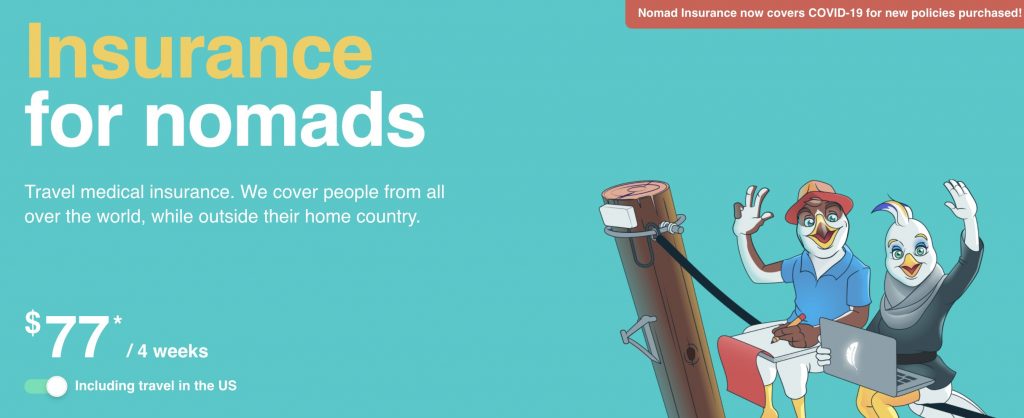
This travel medical insurance is the best option for travelers to U.S. It is also a great choice for both short and long-term tourists or remote workers.
- Safety Wing covers COVID-19 the same way as any other illness as long as it was not contracted before your coverage start date.
- It covers you in your home country as well, as long as your visit there is incidental.
- Since April 15, 2021, it covers quarantine outside your home country of $50/day for up to 10 days. Note that the quarantine can be covered only once a year and if mandated by a physician or governmental authority.
- SafetyWing Nomad Insurance is also pretty affordable . Depending on your age, the prices are as follows for a 4-week period: 10-39 years old: USD 76.72, 40-49 years old: USD 126.56. For other age groups, you can find the prices here.
- Testing for COVID-19 is covered only if deemed necessary by a physician. That is rather inconvenient, as most countries require testing before entry.
- It does not cover citizens from Iran, Syria, North Korea, or Cuba.
If you are new to SafetyWing, the COVID-19 coverage will be added automatically to your plan. On the other hand, if you are already part of SafetyWing, we recommend you reach out to their customer service team, and they will upgrade your plan.
SafetyWing also offers Remote Health insurance which is suitable for long-term nomads. It is more pricey but covers pre-existing conditions, cancer treatment, and you can use it in your home country as well.
What else does this insurance cover?
On top of everything, SafetyWing covers more than 94 recreational activities, including surfing, biking, hiking, and snowboarding.
2. Explore North America® Plus — Coronavirus Travel Insurance

Explore North America Plus travel insurance is a comprehensive medical coverage administered by Seven Corners that offers extensive coverage for Covid19 and other diseases.
This insurance plan also covers Non-U.S. residents and Non-U.S. citizens who are traveling outside their home country to the United States, Mexico, Canada, or all Caribbean countries except Cuba.
Special COVID-19 coverage:
We have chosen Explore North America Plus because of its special benefits when it comes to coronavirus medical expenses.
Most travel insurances that claim to cover COVID-19 medical treatments include a “convenient” fine print that says they won’t cover you if the country you are visiting has a government no-travel alert, which most countries have.
That does not happen with Explore North America® Plus. If you contract COVID-19 on your trip, you’re covered, as simple as that.
- The plan covers medically Usual, Reasonable and Customary (URC) treatment for COVID-19 up to $100,000 or whichever is less.
- Emergency Room Services – (URC) up to medical maximum – $100 copay
- Urgent Care Visit – (URC) up to medical maximum – $20 copay
Other benefits:
- It also covers some onset of pre-existing conditions
- Hospital Indemnity – Only applies to Canada, Mexico and the unrestricted Caribbean countries* – Up to $150 per day, 30-day limit
- Incidental trips on your home country – Up to $10,000
- Dental – Relief of pain – Up to $200
- Dental – Accident – Up to $5,000
- Evacuation and Repatriation – Up to $500,000 (separate from the medical maximum)
- It only covers trips of up to one year
- It does not cover people older than 74
- *The plan does not cover trips to Cuba.
Interested? – Get your quote here !
3. CoverAmerica – Gold Insurance – The Best Benefits
CoverAmerica is perfect for travelers and tourists visiting the U.S. who are not citizens or residents of the country.
- CoverAmerica covers COVID-19 as any other medical condition. However, note that it has to be purchased for at least 30 days to be eligible for the benefit.
- Unlike other travel plans, it has comprehensive coverage for COVID-19 . That means you can get reimbursement for delays, quarantine days, or missed flight connections if you get infected with the coronavirus.
- The coverage limit is up to USD 1,000,000 (conditions may apply).
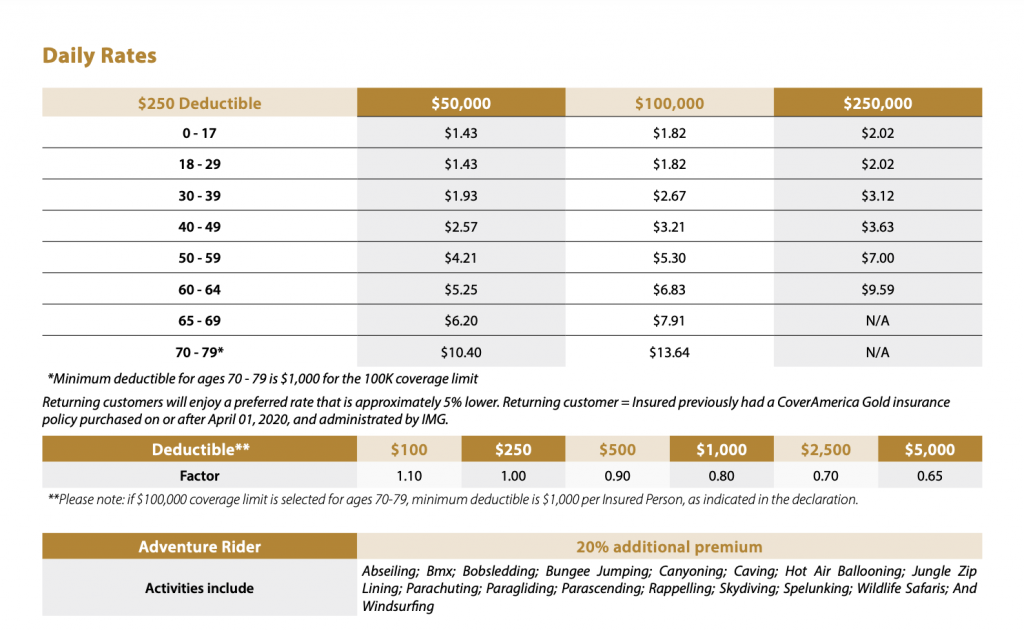
- NOT available for U.S. citizens and residents.
- Citizens from Iran, Syria, the Virgin Islands, Ghana, Nigeria, and Sierra Leone cannot contract this insurance.
- This travel insurance covers emergency treatment of pre-existing conditions, acute dental treatment, and eye exams.
To learn more about CoverAmerica and its plans, click here .
4. Staysure Travel Insurance – BEST FOR U.K. TRAVELERS
Staysure Travel Insurance is the best choice for visitors traveling from the U.K., Spain, France, or Portugal.
- Staysure covers trip cancellations , emergency medical treatment, as well as repatriation expenses if you get affected by COVID-19 (conditions may apply).
- It also offers daily benefits if you have to self-isolate, additional accommodation, and transport, but only if mandated by a health official.
- If your close relative or a member of your household is hospitalized or dies of COVID-19, you can cancel or cut your trip short and claim reimbursement.
- Moreover, it is reasonably priced. To get a quote, visit the website here .
- ONLY for travelers traveling from the U.K., Spain, France, or Portugal.
- You won’t be covered if you have refused any dose of the COVID-19 vaccine.
- Does not cover COVID-19 testing, which is often needed to be able to travel.
What’s covered?
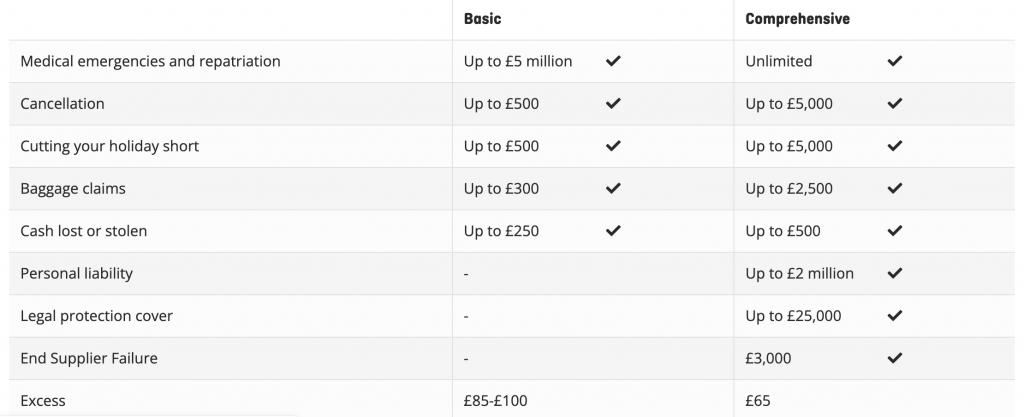
Note that Staysure doesn’t cover you if you travel during government or regional lockdown.
5. Allianz Travel Insurance – Most Trusted
Allianz Travel Insurance is suitable for all types of travelers traveling from Ireland. From digital nomads and remote workers to students and backpackers, they offer a variety of plans in three different levels – bronze, silver, and gold.
Pros:
- This travel insurance covers general COVID-19 medical treatment, as well as additional accommodation , transport , or cancellation of your trip if you contract the virus.
- They offer several insurance plans, such as Single Trip Insurance, Backpacker Travel Insurance, or Annual Multi-Trip Travel Insurance.
- You can cancel or cut your trip short if your close relative or travel companion gets seriously ill from the disease.
- If the DFA (Department of Foreign Affairs) advises against all non-essential travel, you can make your claim only if you provide documentation that you travel for a specific reason, not leisure.
- It is ONLY for citizens and residents of the Republic of Ireland.
- Allianz Travel Insurance offers an extensive Winter Sports and Ski add-on.
Interested in this insurance travel plan? Get your quote .
6. Travel Insurance Select®

This plan is a great fit for American couples, families, and friends traveling together around the country or overseas. Tours, business trips, and those traveling with social groups can also be covered by Travel Insurance Select®
Benefits and non-insurance:
- Trip cancellation coverage – it refunded you up to 100% of the money you invested in your trip.
- Coverage for trip interruption – you can get up to 150% of your trip expenditures back (depending on the coverage you choose).
- Travel Delay – If your trip is delayed for 12 hours or more due to covered circumstances such as carrier-caused delays, lost passports, strikes, or bad weather, you may be eligible for reimbursement for certain extra charges, up to the maximum for the option you chose.
- Missed Connection – Depending on your plan, you may be eligible for reimbursement of up to $1,500.
- Covid Quarantine Benefit: “Travel Insurance Select Elite plan offers coverage for accommodations due to a covered Trip Delay $2,000/$250 per person per day (12 hours) is included in the basic coverage.”
- Emergency support services are available 24/7, so you may get aid whenever you need it.
Example – Quote for a couple in their late 30’s traveling for two weeks from California to Washington :
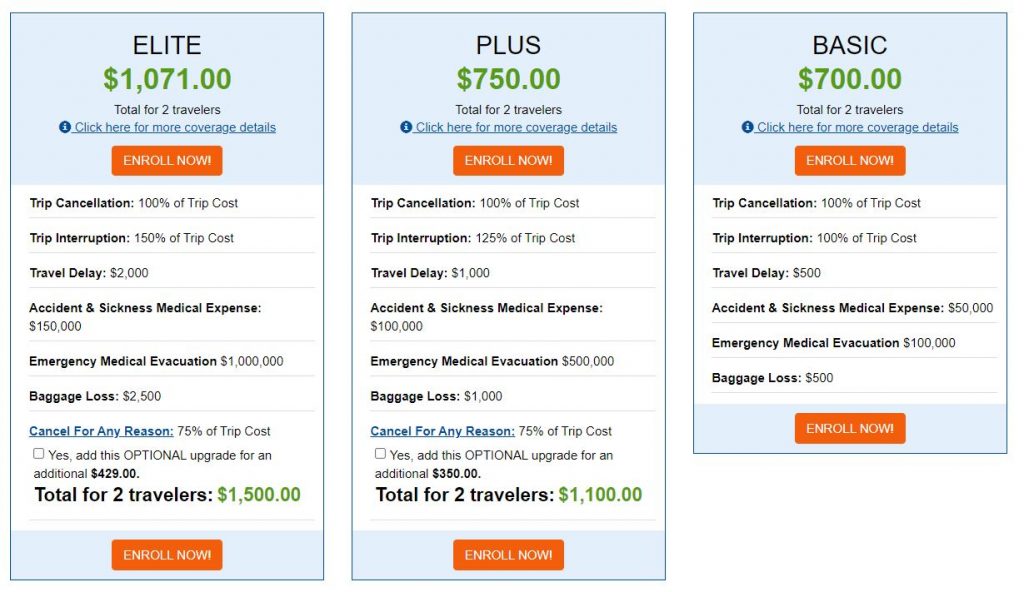
Medical Expense
All plans include emergency medical evacuation, medical repatriation and return of remains.
It can pay reasonable expenses for an emergency medical evacuation ordered by a physician for a covered injury or sickness to the next acceptable medical facility or home, if medically necessary, up to the limit for your preferred option.
Waiver of Pre-Existing Medical Conditions available for the Plus and Elite plans.
Special COVID-19 coverage
COVID-19 is treated as any other illness. Trip Cancellation benefits may be available if you are treated by a legally certified physician.
A person who gets ill while traveling in an affected nation may be eligible for Emergency Medical Expense or Emergency Medical Evacuation benefits.
A person who is required to enter quarantine in their destination due to a positive Covid-19 test can be eligible for Trip Interruption, Travel Delay, or Cancel For Any Reason (CFAR) – this option must be purchased as an upgrade within 21 days of your initial trip deposit/payment.
The basic plan does not cover Cancel for Any Reason.
So, what do you think? Have you chosen your favorite? We hope our comparison has helped you at least a bit, and you will have peace of mind even while traveling during unpredictable times such as the pandemic. Enjoy, stay safe, and see you in the U.S.!
Disclaimer: Most travel insurance companies are still adapting to the “new normal” way to travel the world. We strongly advise you to check with your insurance company before committing to any insurance plan.
- Auto Insurance Best Car Insurance Cheapest Car Insurance Compare Car Insurance Quotes Best Car Insurance For Young Drivers Best Auto & Home Bundles Cheapest Cars To Insure
- Home Insurance Best Home Insurance Best Renters Insurance Cheapest Homeowners Insurance Types Of Homeowners Insurance
- Life Insurance Best Life Insurance Best Term Life Insurance Best Senior Life Insurance Best Whole Life Insurance Best No Exam Life Insurance
- Pet Insurance Best Pet Insurance Cheap Pet Insurance Pet Insurance Costs Compare Pet Insurance Quotes
- Travel Insurance Best Travel Insurance Cancel For Any Reason Travel Insurance Best Cruise Travel Insurance Best Senior Travel Insurance
- Health Insurance Best Health Insurance Plans Best Affordable Health Insurance Best Dental Insurance Best Vision Insurance Best Disability Insurance
- Credit Cards Best Credit Cards 2024 Best Balance Transfer Credit Cards Best Rewards Credit Cards Best Cash Back Credit Cards Best Travel Rewards Credit Cards Best 0% APR Credit Cards Best Business Credit Cards Best Credit Cards for Startups Best Credit Cards For Bad Credit Best Cards for Students without Credit
- Credit Card Reviews Chase Sapphire Preferred Wells Fargo Active Cash® Chase Sapphire Reserve Citi Double Cash Citi Diamond Preferred Chase Ink Business Unlimited American Express Blue Business Plus
- Credit Card by Issuer Best Chase Credit Cards Best American Express Credit Cards Best Bank of America Credit Cards Best Visa Credit Cards
- Credit Score Best Credit Monitoring Services Best Identity Theft Protection
- CDs Best CD Rates Best No Penalty CDs Best Jumbo CD Rates Best 3 Month CD Rates Best 6 Month CD Rates Best 9 Month CD Rates Best 1 Year CD Rates Best 2 Year CD Rates Best 5 Year CD Rates
- Checking Best High-Yield Checking Accounts Best Checking Accounts Best No Fee Checking Accounts Best Teen Checking Accounts Best Student Checking Accounts Best Joint Checking Accounts Best Business Checking Accounts Best Free Checking Accounts
- Savings Best High-Yield Savings Accounts Best Free No-Fee Savings Accounts Simple Savings Calculator Monthly Budget Calculator: 50/30/20
- Mortgages Best Mortgage Lenders Best Online Mortgage Lenders Current Mortgage Rates Best HELOC Rates Best Mortgage Refinance Lenders Best Home Equity Loan Lenders Best VA Mortgage Lenders Mortgage Refinance Rates Mortgage Interest Rate Forecast
- Personal Loans Best Personal Loans Best Debt Consolidation Loans Best Emergency Loans Best Home Improvement Loans Best Bad Credit Loans Best Installment Loans For Bad Credit Best Personal Loans For Fair Credit Best Low Interest Personal Loans
- Student Loans Best Student Loans Best Student Loan Refinance Best Student Loans for Bad or No Credit Best Low-Interest Student Loans
- Business Loans Best Business Loans Best Business Lines of Credit Apply For A Business Loan Business Loan vs. Business Line Of Credit What Is An SBA Loan?
- Investing Best Online Brokers Top 10 Cryptocurrencies Best Low-Risk Investments Best Cheap Stocks To Buy Now Best S&P 500 Index Funds Best Stocks For Beginners How To Make Money From Investing In Stocks
- Retirement Best Roth IRAs Best Gold IRAs Best Investments for a Roth IRA Best Bitcoin IRAs Protecting Your 401(k) In a Recession Types of IRAs Roth vs Traditional IRA How To Open A Roth IRA
- Business Formation Best LLC Services Best Registered Agent Services How To Start An LLC How To Start A Business
- Web Design & Hosting Best Website Builders Best E-commerce Platforms Best Domain Registrar
- HR & Payroll Best Payroll Software Best HR Software Best HRIS Systems Best Recruiting Software Best Applicant Tracking Systems
- Payment Processing Best Credit Card Processing Companies Best POS Systems Best Merchant Services Best Credit Card Readers How To Accept Credit Cards
- More Business Solutions Best VPNs Best VoIP Services Best Project Management Software Best CRM Software Best Accounting Software
- Debt relief Best debt management Best debt settlement Do you need a debt management plan? What is debt settlement? Debt consolidation vs. debt settlement Should you settle your debt or pay in full? How to negotiate a debt settlement on your own
- Debt collection Can a debt collector garnish my bank account or my wages? Can credit card companies garnish your wages? What is the Fair Debt Collection Practices Act?
- Bankruptcy How much does it cost to file for bankruptcy? What is Chapter 7 bankruptcy? What is Chapter 13 bankruptcy? Can medical bankruptcy help with medical bills?
- More payoff strategies Tips to get rid of your debt in a year Don't make these mistakes when climbing out of debt How credit counseling can help you get out of debt What is the debt avalanche method? What is the debt snowball method?
- Manage Topics
- Investigations
- Visual Explainers
- Newsletters
- Abortion news
- Climate Change
- Corrections Policy
- Sports Betting
- Coach Salaries
- College Basketball (M)
- College Basketball (W)
- College Football
- Concacaf Champions Cup
- For The Win
- High School Sports
- H.S. Sports Awards
- Scores + Odds
- Sports Pulse
- Sports Seriously
- Women's Sports
- Youth Sports
- Celebrities
- Entertainment This!
- Celebrity Deaths
- Policing the USA
- Women of the Century
- Problem Solved
- Personal Finance
- Consumer Recalls
- Video Games
- Product Reviews
- Home Internet
- Destinations
- Airline News
- Experience America
- Great American Vacation
- Ingrid Jacques
- Nicole Russell
- Meet the Opinion team
- How to Submit
- Obituaries Obituaries
- Contributor Content Contributor Content
Personal Loans
Best personal loans
Auto Insurance
Best car insurance
Best high-yield savings
CREDIT CARDS
Best credit cards
Advertiser Disclosure
Blueprint is an independent, advertising-supported comparison service focused on helping readers make smarter decisions. We receive compensation from the companies that advertise on Blueprint which may impact how and where products appear on this site. The compensation we receive from advertisers does not influence the recommendations or advice our editorial team provides in our articles or otherwise impact any of the editorial content on Blueprint. Blueprint does not include all companies, products or offers that may be available to you within the market. A list of selected affiliate partners is available here .
Travel insurance
Best travel insurance companies of June 2024
Amy Fontinelle

Heidi Gollub
“Verified by an expert” means that this article has been thoroughly reviewed and evaluated for accuracy.
Updated 2:16 p.m. UTC June 7, 2024
- path]:fill-[#49619B]" alt="Facebook" width="18" height="18" viewBox="0 0 18 18" fill="none" xmlns="http://www.w3.org/2000/svg">
- path]:fill-[#202020]" alt="Email" width="19" height="14" viewBox="0 0 19 14" fill="none" xmlns="http://www.w3.org/2000/svg">
Editorial Note: Blueprint may earn a commission from affiliate partner links featured here on our site. This commission does not influence our editors' opinions or evaluations. Please view our full advertiser disclosure policy .
WorldTrips is the best travel insurance company of 2024 , based on our in-depth analysis of travel insurance policies. Its Atlas Journey Elevate plan gets the top score in our rating because of the extensive coverage it provides for the price. It offers best-in-class emergency medical and evacuation benefits, as well as high limits for baggage insurance.
Best travel insurance of 2024
- WorldTrips : Best travel insurance.
- Travel Insured International : Best for emergency evacuation.
- TravelSafe : Best for missed connections.
- Aegis : Cheapest travel insurance.
- Travelex : Best for families.
- AIG : Best for add-on coverage options.
- Nationwide : Best for cruise itinerary changes.
Why trust our travel insurance experts
Our travel insurance experts evaluate hundreds of insurance products and analyze thousands of data points to help you find the best trip insurance for your situation. We use a data-driven methodology to determine each rating. Advertisers do not influence our editorial content . You can read more about our methodology below.
- 1,855 coverage details evaluated.
- 567 rates reviewed.
- 5 levels of fact-checking.
Best travel insurance companies
Best travel insurance.

Top travel insurance plans
Average cost, medical limit per person, why it’s the best.
If you’re looking for the best travel insurance for international travel , WorldTrips’ Atlas Journey Elevate plan gives you $250,000 in travel medical insurance with primary coverage. This plan is a good option if health insurance for international travel is a priority. It also has $1 million in emergency evacuation coverage.
See our full WorldTrips travel insurance review .
Pros and cons
- $250,000 in primary medical coverage.
- $1 million per person in medical evacuation coverage.
- Primary damage or loss baggage coverage of $500 per item, up to $2,500.
- 5 optional upgrades, including pet care, adventure sports and rental car damage and theft.
- No non-medical evacuation coverage.
Customer reviews
WorldTrips has a rating of 4.27 stars out of 5 on Squaremouth, based on 428 reviews of policies purchased through the travel insurance comparison site since 2008.
Heidi’s expert take: “WorldTrips offers primary coverage for emergency medical expense and for baggage damage or loss. This means the insurer will pay for your claim first and then seek recovery from any responsible third party, such as your health insurance provider, airline or homeowners insurance company (if your belongings are stolen). Travel insurance with secondary medical coverage might be cheaper, but then you’d have to file claims with third parties yourself, before you could turn to your travel insurance for help.” Heidi Gollub, Managing Editor of Insurance, USA TODAY Blueprint
Best travel insurance for emergency evacuation
Travel insured international.

Top travel insurance plan
If you’re traveling to a remote area, consider Travel Insured International’s Worldwide Trip Protector. It has the best travel insurance for emergency evacuation of travel insurance policies in our rating. This top travel insurance plan provides up to $1 million in emergency evacuation coverage per person and $150,000 in non-medical evacuation per person. It also has primary coverage for travel medical insurance benefits.
- Only plan in our rating that offers $150,000 in non-medical evacuation coverage.
- $500 per person baggage delay benefit only requires a 3-hour delay.
- Optional rental car damage benefit up to $50,000.
- Missed connection benefit of $500 per person is only available for cruises and tours.
Travel Insured International has a rating of 4.39 stars out of 5 on Squaremouth, based on 3,402 reviews of policies purchased on the travel insurance comparison site since 2004.
Heidi’s expert take: “The Worldwide Trip Protector plan provides rare non-medical evacuation benefits of up to $150,000. If you’re traveling to an area at risk of a political, security or national disaster, this emergency evacuation coverage could help get you back to safety.” Heidi Gollub, Managing Editor of Insurance, USA TODAY Blueprint
Best travel insurance for missed connections

TravelSafe offers good travel insurance for missed connections , with $2,500 in missed connection coverage for each person on the plan.
- Best-in-class $2,500 per person in missed connection coverage.
- $1 million per person in medical evacuation and $25,000 in non-medical evacuation coverage.
- Generous $2,500 per person baggage and personal items loss benefit.
- Most expensive of our best-rated travel insurance plans.
- No “interruption for any reason” coverage option.
- Weak baggage delay coverage of $250 per person after 12 hours.
TravelSafe has a rating of 4.3 stars out of 5 on Squaremouth, based on 1,506 reviews of policies purchased on the travel insurance comparison site since 2004.
Heidi’s expert take: “If you miss out on prepaid vacation plans because you didn’t make a connecting flight, you’ll be glad for the $2,500 missed connection coverage. Some policies only provide missed connection coverage for cruises and tours, but TravelSafe Classic doesn’t impose that restriction.” Heidi Gollub, Managing Editor of Insurance, USA TODAY Blueprint
Cheapest travel insurance

Go Ready Choice by Aegis has the most affordable travel insurance of the best-rated travel insurance companies in our rating. This is based on the average cost of seven international trips of varying lengths and values for travelers of different ages.
See our full Aegis travel insurance review .
- Cheapest of our best trip insurance plans.
- Pet care benefit of $500 under travel delay benefits.
- Low emergency medical and evacuation limits.
- Low missed connection benefit of $500 per person for cruises and tours only.
- Low baggage and personal items loss benefit of $500 per person.
Aegis has a rating of 4.06 stars out of 5 on Squaremouth, based on 1,111 reviews of policies purchased on the travel insurance comparison site since 2013.
Heidi’s expert take: “If you’re looking for a budget travel insurance policy , Go Ready Choice may fit the bill. It has comparably low coverage limits, but if you have health insurance that will cover you on your trip, its $50,000 in secondary medical coverage may be sufficient.” Heidi Gollub, Managing Editor of Insurance, USA TODAY Blueprint
Best travel insurance for families

Top-scoring plan
Travelex Insurance Services has the best travel insurance for families because you can add kids aged 17 and younger to your Travel Select plan at no additional charge.
See our full Travelex travel insurance review .
- Free coverage for children 17 and under on the same policy.
- Robust travel delay coverage of $2,000 per person ($250 per day) after 5 hours.
- Hurricane and weather coverage after a common carrier delay of any amount of time.
- Low emergency medical coverage of $50,000 per person.
- Non-medical evacuation is not included.
- Low baggage delay coverage of $200 requires a 12-hour delay.
Travelex has a rating of 4.43 stars out of 5 on Squaremouth, based on 2,048 reviews of policies purchased on the travel insurance comparison site since 2004.
Heidi’s expert take: “If you’re traveling with kids, a Travelex policy will cover them, too. The number of children you can add to your policy is unlimited and they’ll get travel protection at no additional cost.” Heidi Gollub, Managing Editor of Insurance, USA TODAY Blueprint
Best travel insurance for add-on coverage options

Travel Guard Preferred from AIG allows you to customize your policy with a host of available upgrades, making it the best traveler insurance for add-on options . These include “cancel for any reason” (CFAR) coverage , rental vehicle damage coverage and bundles that offer additional benefits for adventure sports, travel inconvenience, quarantine, pets, security and weddings.
There’s also a medical bundle that increases the travel medical benefit to $100,000 and emergency evacuation to $1 million. This is a good option if you’re looking for foreign travel health insurance.
See our full AIG travel insurance review .
- Bundle upgrades allow you to customize your travel insurance policy.
- Emergency medical and evacuation limits can be doubled with optional upgrade.
- Base travel insurance policy has relatively low medical limits.
- $300 baggage delay benefit requires a 12-hour delay.
- Optional CFAR upgrade only reimburses up to 50% of trip cost.
Heidi’s expert take: “You can add riders to your AIG travel insurance policy to maximize your coverage. Choose from these bundles: adventure sports, medical, pet, quarantine, security and wedding. You may also want to add “cancel for any reason” coverage and rental vehicle damage coverage.” Heidi Gollub, Managing Editor of Insurance, USA TODAY Blueprint
Best travel insurance for cruise itinerary changes

Nationwide’s Choice Cruise is good travel insurance for cruises . It has a $500 per person benefit if a cruise itinerary change causes you to miss a prepaid excursion.
Choice Cruise also has a missed connections benefit of $1,500 per person after only a 3-hour delay when you’re taking a cruise or tour. But note that this coverage is secondary coverage to any compensation provided by a common carrier.
See our full Nationwide travel insurance review .
- Benefits for cruise itinerary changes, ship-based mechanical breakdowns and covered shipboard service disruptions.
- Non-medical evacuation benefit of $25,000 per person.
- Missed connection coverage of $1,500 per person for tours and cruises, after a 3-hour delay.
- Baggage loss benefits of $2,500 per person.
- Travel medical coverage is secondary.
- Trip cancellation benefit for losing your job requires three years of continuous employment.
- No “cancel for any reason” upgrade available.
Nationwide has a rating of 4.02 stars out of 5 on Squaremouth, based on 570 reviews of policies purchased on the travel insurance comparison site since 2018.
Heidi’s expert take: “This plan has protections for cruisers when it comes to prepaid expenses. But its emergency medical coverage is secondary, which means you’d have to file medical claims with your health insurance company first. Since U.S. health insurance won’t help you at sea, you may want to look for cruise travel insurance with primary medical coverage instead.” Heidi Gollub, Managing Editor of Insurance, USA TODAY Blueprint
Compare the best travel insurance plans

Via Compare Coverage’s website

Heidi’s expert take: “Here are my tips on how to buy travel insurance that gets you the most coverage for the lowest price: Buy early . Getting travel insurance within two weeks of making your first trip deposit may qualify you for coverage of pre-existing medical conditions, and it won’t cost you any extra. Look for primary emergency medical coverage . If you buy a plan with secondary coverage, you’ll have to file a claim with your health insurance first, even if you know it will be denied. Don’t overinsure . Calculate the value of only your prepaid, nonrefundable trip expenses that are not already covered by other insurance (like credit card travel insurance or health insurance, if your coverage extends to where you are traveling). Even if this value is $0, you can still buy travel insurance for the travel medical insurance benefits, and you’ll only be paying for the insurance you need. Understand exclusions . If you are planning to go scuba diving, for instance, make sure this adventure activity is not excluded from a policy’s coverage. If so, you may need to pay for a rider or shop for another plan that offers the coverage you need.” Heidi Gollub, Managing Editor of Insurance, USA TODAY Blueprint
What is the best travel insurance?
The best travel insurance for international travel is sold by WorldTrips, according to our in-depth trip insurance comparison.
The best travel insurance plan for you will depend on the trip you are planning and the coverage areas that are most important to you.
- Best cruise travel insurance
- Best COVID travel insurance
- Best “cancel for any reason” travel insurance
- Best senior travel insurance
Best travel insurance for cruises
The best cruise travel insurance is Atlas Journey Preferred sold by WorldTrips . This plan offers solid travel insurance for cruises for a low rate.

Best travel insurance for COVID-19
The best COVID travel insurance is the Trip Protection Basic plan sold by Seven Corners . It is a relatively low cost travel insurance plan with optional “cancel for any reason” coverage that reimburses up to 75% of your prepaid, nonrefundable trip expenses.

Best travel insurance for “cancel for any reason”
The best “cancel for any reason” (CFAR) travel insurance is Seven Corners’ Trip Protection Basic. Adding CFAR coverage to a RoundTrip Basic plan only increases the cost by about 40%, which is lower than other plans we analyzed. For the extra cost, you get coverage of 75% of your prepaid, nonrefundable trip expenses, as long as you cancel at least 48 hours before your scheduled departure.
Best travel insurance for seniors
The best senior travel insurance is the Gold plan sold by Tin Leg . It is an affordable travel insurance plan with travel medical primary coverage of $500,000 and a pre-existing conditions waiver if you insure the full amount of your trip within 14 days of your first trip deposit.

How much is travel insurance?
The average cost of travel insurance is 5% to 6% of your prepaid, nonrefundable trip costs .
How much you pay for travel insurance will depend on:
- The cost of your trip.
- Your destination.
- The length of your trip.
- The ages of travelers being insured.
- Your state of residence.
- The travel insurance policy you choose.
- The total coverage amounts in your policy.
- Any travel insurance add-ons you select.
Here are average travel insurance rates for a 30-year-old female who is insuring a 14-day trip to Mexico.
Looking to save? Discover cheap travel insurance options.
How much travel insurance should I buy?
Travel insurance companies typically offer several plans with varying maximum limits. The higher the coverage limits, the more you’ll pay for travel insurance.
Squaremouth, a travel insurance comparison site, recommends the following coverage limits for international travel:
- Emergency medical coverage: At least $50,000.
- Medical evacuation coverage: At least $100,000.
If you’re going on a cruise, or to a remote location, Squaremouth recommends:
- Emergency medical coverage: At least $100,000.
- Medical evacuation coverage: At least $250,000.
When evaluating travel insurance plans, our team of insurance analysts considered the best medical travel insurance policies to have at least $250,000 in emergency medical coverage and at least $500,000 in medical evacuation coverage.
When should I buy travel insurance?
The best time to buy travel insurance is within two weeks of making your first nonrefundable travel payment, whether it’s for a plane ticket, hotel stay, cruise or excursion.
Travel insurance costs the same whether you buy it early or last minute, and buying it early has added benefits:
- You may be able to add on “ cancel for any reason” (CFAR) coverage , an upgrade that is typically only available for a limited time after you’ve started paying for your trip.
- You may qualify for a pre-existing medical conditions exclusion waiver, meaning your pre-existing conditions will be covered by travel insurance. This waiver is generally added to your policy automatically, provided you buy the travel insurance within a certain window after your first trip deposit.
- You will be covered over a longer period of time for unforeseen events that could cause you to cancel your trip, such as medical emergencies, inclement weather and natural disasters.
Expert tip: You can buy travel insurance up to the day before you leave on your trip, but waiting may cost you the opportunity to qualify for a pre-existing conditions exclusion waiver or to buy a “cancel for any reason” upgrade.
Where can I buy travel insurance?
You can buy a travel insurance plan:
- Online. Visit a travel insurance company’s website to buy a policy directly or use a comparison website like Squaremouth or Travelinsurance.com to see your options and compare plans. You may also be able to purchase travel insurance online through an airline, cruise, hotel, rental car company or other provider you book a ticket with.
- In person. A travel agent or insurance agent may be able to assist you in buying travel insurance.
Travel insurance trends in 2024
Americans are changing the way they travel and this includes buying travel insurance when they might have skipped it in the past. As spending on trips continues to rise , travelers have more to lose if their plans are disrupted.
Based on travel insurance quote requests on the Squaremouth website last month, these are the main benefits travelers are looking for in a travel insurance policy.
*Source: Squaremouth.com. Travel insurance quote filter usage from April 28 to May 28, 2024.
Methodology
Our insurance experts reviewed 1,855 coverage details and 567 rates to determine the best travel insurance of 2024. For companies with more than one travel insurance plan, we shared information about the highest-scoring plan.
Insurers could score up to 100 points based on the following factors:
- $3,000, 8-day trip to Mexico for two travelers age 30.
- $3,000, 8-day trip to Mexico for two travelers age 70.
- $6,000, 17-day trip to Italy for two travelers age 40.
- $6,000, 17-day trip to Italy for two travelers age 65.
- $15,000, 17-day trip to Italy for four travelers ages 40, 40, 10 and 7.
- $15,000, 17-day trip to France for four travelers ages 40, 40, 10 and 7.
- $15,000, 17-day trip to the U.K. for four travelers ages 40, 40, 10 and 7.
- Medical expenses: 10 points. We scored travel medical insurance by the coverage amount available. Travel insurance policies with emergency medical expense benefits of $250,000 or more per person were given the highest score of 10 points.
- Medical evacuation: 10 points. We scored each plan’s emergency medical evacuation coverage by coverage amount. Travel insurance policies with medical evacuation expense benefits of $500,000 or more per person were given the highest score of 10 points.
- Pre-existing medical condition exclusion waiver: 10 points. We gave full points to travel insurance policies that cover pre-existing medical conditions if certain conditions are met.
- Missed connection: 10 points. Travel insurance plans with missed connection benefits of $1,000 per person or more received full points.
- “Cancel for any reason” upgrade: 5 points. We gave points to travel insurance plans with optional “cancel for any reason” coverage that reimburses up to 75%.
- Travel delay required waiting time: 5 points. We gave 5 points to travel insurance policies with travel delay benefits that kick in after a delay of 6 hours or less.
- Cancel for work reasons: 5 points. If a travel insurance plan allows you to cancel your trip for work reasons, such as your boss requiring you to stay and work, we gave it 5 points.
- Hurricane and severe weather: 5 points. Travel insurance plans that have a required waiting period for hurricane and weather coverage of 12 hours or less received 5 points.
Some travel insurance companies may offer plans with additional benefits or lower prices than the plans that scored the highest, so make sure to compare travel insurance quotes to see your full range of options.
If you’d like to dig in deeper, head over to our travel insurance ratings methodology page.
Best travel insurance FAQs
According to our analysis, WorldTrips has the best trip insurance. Two of its plans — Atlas Journey Explore and Atlas Journey Elevate — get 5 stars in our rating.
The best travel insurance policy for you will depend on what type of coverage you need. With so many different policies and carriers, the policy that was best for your friend’s trip to California might not be ideal for your trip to Japan. If you’re looking for the best travel insurance for international travel, you may be willing to pay more for higher coverage levels.
A comprehensive travel insurance plan bundles several types of travel insurance coverage, each with its own limits. To ensure you have adequate financial protection for your trip, your travel insurance policy should include the following travel insurance coverages:
- Trip cancellation . With trip cancellation insurance , you’re covered if you need to call off your trip because of a reason listed in your policy, such as unexpected illness, injury or death of you, a family member or a travel companion, severe weather, jury duty and your travel supplier going out of business.
- Travel delay. Once your trip has started, travel delay insurance reimburses you for unexpected expenses you incur after a minimum delay, such as five hours. It can cover needs like airport meals, transportation and even overnight accommodation.
- Trip interruption. If you need to cut your trip early for a reason listed in your policy, trip interruption insurance can reimburse you for any prepaid, nonrefundable payments you’ll lose by leaving early. It can also pay for a last-minute one-way ticket home.
- Travel medical . Emergency medical benefits are especially important if you need international health insurance for travel outside of the country. Your domestic health insurance may provide limited coverage once you leave the U.S. The best travel medical insurance pays for ambulance service, doctor visits, hospital stays, X-rays, lab work and prescription medication you may require while traveling.
- Emergency medical evacuation. If you’re traveling to a remote area, or planning excursions such as boating to an island, emergency medical evacuation coverage is a good idea. This coverage pays to transport you to the nearest adequate medical facility if you are injured or sick while traveling.
- Baggage delay. After a certain waiting period, such as six or 12 hours, this coverage will reimburse you for necessities you need to buy to tide you over while you wait for your bag to arrive. Be sure to save your receipts and look at your coverage limit, as some caps are low, like $200.
- Baggage loss. Baggage insurance can reimburse you if your bag never arrives, or if your personal belongings are stolen during your travels. Coverage limits apply here, as well as exclusions for certain items such as electronics.
“Typically, travelers are expected to pay their expenses out of pocket, and then file a claim for reimbursement,” said James Clark, spokesperson for Squaremouth. “However, there are medical situations in which a provider may be required to pre-authorize payment to make sure the policyholder receives the treatment they need.”
According to Clark, “Providers can pre-authorize payment for medical care and emergency evacuations. With that said, every circumstance is unique, and providers will handle each situation on a case-by-case basis.”
Travel insurance covers your prepaid, nonrefundable trip costs — as well as extra money you may need to spend due to unforeseen circumstances and emergencies — both before and during your trip.
Travel insurance coverage varies by plan, but in general travel insurance covers costs associated with these problems:
- Bankruptcy of a travel insurance company, such as your airline or tour operator.
- Dangerous weather conditions.
- Delayed and lost luggage.
- Illness or death in your family that requires you to stay home or cut your trip short.
- Illness that needs medical attention.
- Injury requiring medical evacuation.
- Jury duty.
- Travel delays and missed connections.
- Theft of your personal belongings while traveling.
- Unexpected job loss.
Travel insurance policies often exclude or limit “foreseeable” losses. Typical travel insurance exclusions include:
- Accidents or injuries caused by drinking or drug use.
- Canceling your trip because you changed your mind.
- Ending your trip early because you changed your mind.
- Losses caused by intentional self harm, including suicide.
- Losses due to war, civil disorder or riots.
- Medical tourism.
- Medical treatment for pre-existing conditions.
- Mental health care.
- Natural disasters that begin before you buy travel insurance.
- Non-medical evacuation.
- Normal pregnancy.
- Medical treatment related to high-risk activities.
- Routine medical care, such as physicals or dental care.
- Search and rescue.
Your U.S. health insurance may provide little or no coverage in foreign countries. Check with your health insurance company to see if you have any global benefits and ask how they work. If your health care does extend across the border, the benefits it provides abroad may not be the same benefits it provides domestically.
Medicare usually won’t pay for health care outside of the United States and its territories, so older travelers planning an international trip should look into the best senior travel insurance with robust medical benefits.
The best time to buy travel insurance is immediately after booking your trip and making a nonrefundable payment — in other words, as soon as you’re at risk of losing money. This way, you’ll know the total cost that you need to insure and you’ll have the longest window to take advantage of your policy’s benefits if something goes wrong.
You can’t wait until something goes wrong and then buy travel insurance to get reimbursed for your loss. Travel insurance only covers unexpected losses.
Travel insurance companies can decline to cover travel to certain countries. For example, you may find that some trip insurance companies don’t offer coverage to countries with a Level 4: Do Not Travel advisory from the U.S. State Department.
Travel insurance policies also frequently exclude certain risks that you’re more likely to encounter in Level 4 or Level 3 countries. For example, your policy may not cover losses related to declared or undeclared wars or acts of war or losses related to known or foreseeable conditions or events.
Some credit cards , such as the Chase Sapphire Preferred® Card , offer benefits such as trip cancellation and interruption insurance, baggage delay insurance and trip delay reimbursement when you use your card to pay for your trip.
Ask your credit card issuer for your card’s benefits guide to see what coverage you may have. Keep in mind that it may not cover all the risks you want to protect against, such as the cost of international health care or emergency medical evacuation .
Business travel insurance makes sense if you are self-employed and paying for your own travel expenses, or if you are traveling internationally and want medical coverage abroad.
You might also consider buying travel insurance for a business trip if your company won’t cover extra expenses if your flight is delayed or you need to head home early.
Cruise travel insurance can help protect you financially if you need emergency medical care in a remote location, or if a delayed flight causes you to miss embarkation and you need to pay extra to catch up to your cruise.
Experts caution that travel insurance you buy through a cruise line may not be as comprehensive as plans you can buy directly from travel insurance companies.
Some travel insurance plans cover rental cars as an optional upgrade, for an additional cost. The 5-star rated travel insurance companies in our rating offer these optional rental car benefits:
- Travel Insured International — Rental car damage and theft coverage of $50,000.
- WorldTrips — Rental car damage and theft coverage of $50,000 with a $250 deductible.
Travel insurance typically only covers a single trip, although your insured trip can have multiple destinations.
If you’re looking to insure several trips in the same year, annual travel insurance may be a good option for you.
Travel insurance may be required, depending on the country you plan to visit. But it’s smart to consider buying a travel insurance policy for international travel, even when it is not required. A good travel insurance policy can protect you financially if you need emergency medical assistance when traveling, or if you need to cut your trip short and buy a last-minute plane ticket home because an immediate family member is ill.
Wondering if travel insurance is worth it? What travel insurance covers
Editor’s Note: This article contains updated information from previously published stories:
- Spirit Airlines scrubs 60% of its Wednesday flights, says cancellations will drop ‘in the days to come.’
- 'Just a parade of incompetency': Spirit Airlines passengers with 'nightmare' stories want more than apology, $50 vouchers
- ‘This is not our proudest moment’: Spirit Airlines CEO says more flight cancellations expected this weekend
- Hurricane Irma: Flight cancellations top 12,500; even more expected
- Is an annual travel insurance policy right for you?
- How 2020 and COVID-19 changed travel forever – and what that means for you
- COVID-19 or delta variant have you ready to scrap your trip? Here’s how to cancel like a pro
- Sunday: Snow is over, but flight cancellations top 12,000
- After nearly 13,000 Harvey cancellations, Irma is new threat to airline flights
- What’s the difference between travel insurance and trip ‘protection’?
- How to choose the right travel insurance for your next vacation
- Travel insurance can save the day
- Angry passengers brawl after Spirit cancels flights
- What to do when travel insurance doesn’t work
- How lockdowns, quarantines and COVID-19 testing will change summer travel in 2021
- Travelers will pay and worry more on summer vacation this year. But they won’t cancel
- How to find a hotel with COVID testing and quarantine facilities wherever you travel
- Yearning to travel in 2022? First, figure out your budget – then pick a destination
- Pro tips for surviving a long flight during a pandemic: Get the right mask, bring a pillow
- Want to steer clear of contracting COVID-19 on your next vacation? Follow these guidelines
- Post-pandemic travel: Is it OK to ask another passenger’s vaccine status or request they mask up?
- These days, forgetting these important travel items could cost you thousands of dollars
- International travel hacks: When to book flights and hotels, how to deal with COVID-19 rules
- Traveling post-coronavirus: How do you book your next trip when so much remains uncertain?
- The COVID-19 guide to holiday travel – and the case for why you shouldn’t go this year
- Should you travel during the holidays? Americans struggle with their decision
- ‘There’s still pent-up demand’: What you should know about fall travel
- Planning for life after coronavirus: When will we know it’s safe to travel again?
- ‘Busiest camping season’: Travelers choose outdoor recreation close to home amid COVID-19 pandemic
- Considering a camping trip this summer? Tips to make sure your gear is good to go
- RVing for the first time? 8 tips for newbies I wish I’d known during my first trip
- Five myths about travel agents
- Should I buy travel insurance?
- Is travel insurance stacked against you?
- Five myths about travel insurance and terrorism
- These eight things could get your travel insurance claims rejected
- There’s a good chance that your credit card already gives you some kind of travel insurance coverage
- How to avoid a hotel cancellation penalty
- Change fees and travel insurance continue to rise
Blueprint is an independent publisher and comparison service, not an investment advisor. The information provided is for educational purposes only and we encourage you to seek personalized advice from qualified professionals regarding specific financial decisions. Past performance is not indicative of future results.
Blueprint has an advertiser disclosure policy . The opinions, analyses, reviews or recommendations expressed in this article are those of the Blueprint editorial staff alone. Blueprint adheres to strict editorial integrity standards. The information is accurate as of the publish date, but always check the provider’s website for the most current information.

Amy Fontinelle has more than 15 years of experience helping people make informed decisions about their money, whether they’re refinancing a mortgage, buying insurance or choosing a credit card. As a freelance writer trained in journalism and specializing in personal finance, Amy digs into the details to explain the products and strategies that can help (or hurt) people seeking greater financial security and wealth. Her work has been published by Forbes Advisor, Capital One, MassMutual, Investopedia and many other outlets.
Heidi Gollub is the USA TODAY Blueprint managing editor of insurance. She was previously lead editor of insurance at Forbes Advisor and led the insurance team at U.S. News & World Report as assistant managing editor of 360 Reviews. Heidi has an MBA from Emporia State University and is a licensed property and casualty insurance expert.

Survey: 20% of Americans have had a life-changing experience while traveling
Travel insurance Timothy Moore

10 worst US airports for flight cancellations this week
Travel insurance Heidi Gollub

10 worst US airports for flight cancellations last week

Our travel insurance ratings methodology

AXA Assistance USA travel insurance review 2024
Travel insurance Jennifer Simonson

Cheapest travel insurance of June 2024
Travel insurance Mandy Sleight

Average flight costs: Travel, airfare and flight statistics 2024

John Hancock travel insurance review 2024

HTH Worldwide travel insurance review 2024

Airfare at major airports is up 29% since 2021

USI Affinity travel insurance review 2024

Trawick International travel insurance review 2024

Travel insurance for Canada

Travelex travel insurance review 2024

Best travel insurance for a Disney World vacation in 2024

Search Smartraveller
Choice travel insurance buying guide.

Do you need travel insurance? How do you choose the right cover? What are you covered for?
CHOICE answers all the questions you need to know before leaving the country.
Download the CHOICE travel insurance buying guide [PDF 3.52MB] Download the CHOICE travel insurance cheat sheet [PDF 587KB] Who is CHOICE? Set up by consumers for consumers, CHOICE is the independent consumer advocate that provides Australians with information and advice, free from commercial bias. Visit choice.com.au .
Why travel insurance?
- Does travel insurance cover COVID-19?
How to get travel insurance
Before you buy, how to save money on travel insurance.
- How to read the product disclosure statement
What are you covered for?
- Credit card insurance
How to make a complaint
If you’re leaving Australia, travel insurance is just as essential as a passport.
Holidays don’t always go as planned.
If you’re leaving Australia, travel insurance is just as essential as a passport. Medical expenses are the number one reason to get insurance, but sometimes other things can go wrong, such as trip cancellations, delays, lost luggage or even the big stuff like natural disasters and pandemics. If you end up out of pocket because of these things, insurance can make up for that.
The Australian Government won’t pay your medical bills.
In an emergency, the Australian Government can only help so much. The Consular Services Charter describes what the government can and can’t do to help Australians overseas.
If you end up injured or sick while overseas, you’ll be footing the hospital bill and the cost of flying home. If you’re really unlucky, that could cost you or your family hundreds of thousands of dollars.
68% of travellers mistakenly believe the Australian Government would ensure they get medical treatment if they need it overseas, and 43% believe the government would pay their medical bills.
Some countries won’t let you in if you don’t have insurance.
Singapore and the UAE require you to have travel insurance. Not to mention all 26 European countries in the Schengen Area if you’re applying for a visa to visit. Read the Smartraveller travel advice for information about your destination.
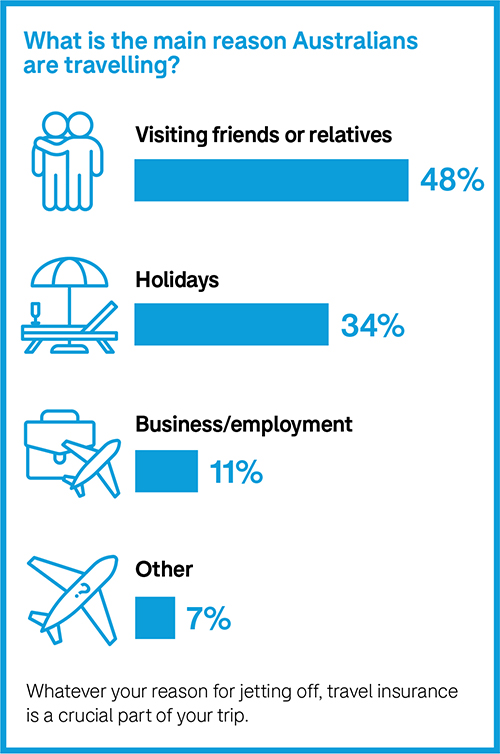
Reciprocal healthcare Australia has reciprocal healthcare agreements with several countries: Belgium, Finland, Italy, Malta, the Netherlands, New Zealand, Norway, the Republic of Ireland, Slovenia, Sweden and the United Kingdom. If you have Medicare, you can get subsidised treatment for essential services only in these countries, which often leads people to ask whether they still need travel insurance. The answer is yes, for the following reasons. You’re usually only covered for urgent care that can’t wait until you get home. If you’re very ill, travel insurance can pay for a medical escort to bring you home to Australia. You still may have to pay fees for treatment and medication. For example, in New Zealand reciprocal health care doesn’t cover you for free or subsidised care by a general practitioner or ambulance. Travel insurance can cover you for cancellations, delays, stolen items and more.
Remember to take your Medicare card with you. You’ll need it, along with your passport, to prove you’re eligible for reciprocal health care. For more information, visit servicesaustralia.gov.au .
Marco* had breathing difficulties on his way home from Europe, causing his flight to be diverted to the UAE. Hospitals in the UAE won’t admit you unless you have insurance or can pay an upfront fee. Marco’s family had to pay thousands of dollars for his treatment. *To protect privacy we have changed names and some details
Do you need domestic travel insurance?
Most of us already have medical cover at home, be it Medicare or private health insurance or both. But there are still a few key reasons to consider domestic travel insurance.
- Cancellation: If you’ve spent a lot on your holiday, then it’s not too much extra to buy travel insurance in case of the unforeseen.
- Baggage cover: If you’re travelling with valuables, think about whether you want them covered for theft, loss or damage.
- Car hire excess: You can save money using travel insurance to cover your collision damage excess, rather than paying the car hire company’s extra charge.
Does international travel insurance cover COVID-19?
Many travel insurers now offer limited cover for COVID-19, but the available cover varies quite a lot. Some policies only cover medical and repatriation costs if you get COVID-19 overseas, while other policies provide limited cover for cancellation costs in addition to medical and repatriation costs.
You should always check the details of your insurance coverage, particularly how it applies to COVID-19 and travel disruptions.
Over 90% of travellers will look for insurance that covers them for cancellation and medical expenses caused by COVID-19.
If you’re planning to go on a cruise, be extra careful. Some travel insurers may not offer COVID-19 cover for multi-night cruises or they may restrict the cover provided on cruises.
Also, don’t rely on the travel insurance on your credit card unless you check it closely – it may not cover claims related to COVID-19.
There are cooling-off periods for COVID-19 cancellation cover, so it’s best to buy your travel insurance at the same time as you book your trip. Some insurers may only cover cancellation if you test positive to COVID-19 and the policy was purchased more than 21 days before your scheduled departure date.
Make your travel plans COVID-safe
You need to be prepared for your travel plans to be interrupted at short notice. As travel insurance may not protect you from government border closures, general lockdowns or quarantine requirements in your destination country, the key is to book only with providers that allow you flexibility should things change.
- Check the rules for travelling to your destination. For example, are there any entry requirements? What are the vaccination requirements? And what type of travel insurance do you need?
- Read the terms and conditions of your airline, accommodation and travel tours before you book. Will they refund you if you can’t travel due to COVID-19? If they only offer a reschedule or a credit, will you be in a position to redeem the credit in future?
- You can book flexible tickets for flights but be aware you usually have to pay the difference between the prices for the tickets you bought and the new tickets. So changing your flight dates at short notice can be very expensive.
- If you book through a travel agent or booking site, what are their terms and conditions? Will they refund you or provide a credit? Are there cancellation fees?
- If you pay by credit or debit card (and you selected ‘credit’ when you paid), you may have access to credit card chargebacks if something goes wrong.
- Keep on top of the latest travel advice and requirements at smartraveller.gov.au . Travel restrictions can change at short notice.
- If you do have to cancel, your travel insurer will ask you to claim what you can back from travel providers first. Read the CHOICE advice on how to get your money back on travel cancellations and ask your travel insurer if you can get a refund or partial refund of your travel insurance premium.
You can buy travel insurance from a travel insurer, travel agent, insurance broker, credit card provider, or even from your health, home or car insurer.
You can buy travel insurance online (direct from the insurer’s website, from a comparison site or through an airline booking site), over the counter or over the phone.
Buy travel insurance as soon as you know your travel dates. That way you’re covered if your trip is cancelled before you even leave or if you’re unable to travel at all.
You can certainly buy travel insurance quicker than it will take you to read this guide, but do you know what you’ll be covered for? Will you be covered if you trip over after having a drink? If you crash your scooter in Thailand? If you lose your wallet during a stopover? If you need to isolate because you contract COVID-19?
There are a lot of ‘what ifs’ to consider, depending on where you’re going and what you’ll be doing, so it’s worth reading the product disclosure statement (PDS) first to make sure you’ll be covered.
Will you use it? Hopefully not, but research by Smartraveller found that one in 4 Australian travellers experienced an insurable event on their last overseas trip. Most common insurable events Flight or tour cancelled Flight delayed more than 12 hours Received medical treatment Lost, damaged or stolen luggage Missed a connecting flight Lost, damaged or stolen cash or personal items Forced to cancel trip before departure What if the insurers don’t pay out? Australian travellers lodged almost 300,000 insurance claims in 2018–19, the last financial year before COVID-19 travel bans. Almost 90% of those were paid out. Top four reasons for declined claims Due to policy exclusions, or not included in the policy conditions Claim amount was below the excess Claim was due to a pre-existing medical condition Claim was for an item that was stolen while it was unattended
1. Where are you going?

The level of cover and the cost of travel insurance can vary depending on the region you’re travelling to, and some risks may be of greater concern than others. Not all travel insurance policies cover COVID-19 and other pandemics or epidemics such as SARS. And not all policies cover you for changing your plans due to a riot or civil commotion, for example. Travel insurance also may not be available for countries with travel alerts.
- Look up your destination on smartraveller.gov.au and make sure you’re aware of any risks or safety advice.
- Buy a policy that covers you for every country you’re travelling to or transiting through. If you’re going to Europe via a one-night stopover in the US, then get cover for the US and Europe. Usually a worldwide policy will cover this.
86% of travellers say they’re more cautious after the COVID-19 pandemic about travelling to places where it could prove harder to return home in a crisis.
You need different cover for different regions
Insurers sometimes apply policies to regions rather than having a policy for each destination.
Asia Pacific: Destinations such as New Zealand, Bali, Fiji and Papua New Guinea.
Asia: Destinations such as India, Indonesia, Thailand, Singapore and Malaysia.
Europe: Destinations such as the United Kingdom, Ireland and Western Europe.
Worldwide: All of the above as well as regions such as North America, South America, Japan and Africa.
These definitions differ for each insurer. For example, several insurers cover travel to Bali under their Pacific policy, while some will only cover travel to Bali under their Asian region policy.
2. How long are you going for?

Just a quick trip? Simply buy a standalone travel insurance policy for a set number of days.
Travel often? Consider an annual multi-trip policy or a credit card with complimentary travel insurance, but make sure it gives you the cover you need.
Tip: Annual multi-trip policies and credit card policies can restrict the length of each trip you take – anywhere from 15 to 365 days depending on your policy. Some allow you to pay for extra days.
3. What are you going to do there?

Cruising the open road on a moped? Carving up the ski slopes? Partying at a wedding? These things aren’t necessarily included in a travel insurance policy.
Scan the insurer’s list of included activities and those that you’ll have to pay extra for. And take it easy on the grog – if your alcohol or drug intake is the cause of an adverse event, it won’t be covered by your policy.
4. Are you taking any valuable items?

Do you need cover for a digital SLR camera or an expensive tablet or laptop? Cover for such valuables can vary from a few hundred dollars to thousands, and higher cover will often mean a higher premium.
Consider adding cover for portable valuables to your home insurance policy instead, but check on the excess and if the policy will cover you worldwide and not just in Australia.
Policies also vary when it comes to how they cover valuable items. Valuables in your check-in luggage often aren’t covered, while cover for baggage stored in your hire car is inconsistent. And baggage left unattended is never covered, which can include a bag that is stolen from the seat beside you in a restaurant while you’re looking the other way.
Make sure you have receipts for your valuables as travel insurance will not pay if you can’t prove you own them.
5. Do you have any medical conditions?

If you have a medical condition that existed before you bought your policy, it may not be covered. This can range from something as common as allergies or asthma through to diabetes, heart conditions and knee replacements.
If you’re not sure, the best thing to do is contact the insurer to ask whether they’ll cover your condition automatically or whether you need to do an assessment.
The Massoud family* was holidaying in Singapore when 13-year-old Nazreen had a recurrence of severe bronchitis, which had affected her in Australia before their trip. The family’s travel insurer refused to pay any hospital bills as Nazreen’s bronchitis was a pre-existing medical condition. As a result, the Massouds had to ask their friends to transfer the $17,000 they needed to cover Nazreen’s hospital expenses, additional accommodation and the cost of changing flights. *To protect privacy we have changed names and some details
It’s important to compare policies for cost and cover. Some travel insurance premiums increased by as much as 30% between March and June 2022.
Three-quarters (77%) of travellers are willing to pay more for insurance that covers pandemic-related claims.
The further out from your departure date that you buy travel insurance, the more you’re likely to pay for it, but you’ll be covered from the moment you buy your policy. For example, if you buy insurance 2 months before you fly, you effectively have cheap cover for any events that affect your travel plans in those 2 months.
If you pay for your trip in full 6 months in advance, but you only buy an insurance policy 2 weeks before you depart, you may not be covered for any cancellation costs if you contract COVID-19.
Left it until the last minute, or even later? Only a few insurers let you buy insurance once you’re already overseas (look for the ‘Have you already left Australia?’ checkbox when viewing policy options).
While not all policies offer online discounts, plenty do. Make sure you understand the policy and what it covers. Sometimes (but not always) a reduced price may mean reduced cover.
Tip: Check asic.gov.au/afslicensing to find out whether the agent has an Australian financial services (AFS) licence or is an authorised representative of a licence holder. Take the usual precautions when giving your credit card and other details over the internet.
Member discounts
Does your health, car or home insurance provider also sell travel insurance? Some companies give 10–15% discounts to existing members.
Shop around
Trying to negotiate with a website will probably get you nowhere, but if you’re buying over the phone or through a travel agent, give it a go. Travel agents pocket a commission when they sell you insurance, so if you find a better deal elsewhere, ask them if they can beat it.
Almost two-thirds (62%) of overseas travellers who buy insurance do so on or before the day of booking travel.
Use your credit card
Some credit cards come with ‘free’ travel insurance when you use them to buy a ticket, pay for other travel expenses or otherwise activate it (we say ‘free’ because you’ll pay a premium in fees for the card itself).
This type of insurance can sometimes be a money-saver, and the level of cover can be just as good or even better than standard insurance, but make sure it gives you the cover you need.
Compromise on cover
While good medical cover is always essential, you could save money on your premium by choosing a policy with lower or variable cover for cancellation, delays and lost baggage, especially if you aren’t spending big on your holiday or taking expensive items with you.
Have you read the Product Disclosure Statement (PDS)? According to research conducted in 2022, of those who bought travel insurance: 45% have skim-read the PDS 43% have read the PDS in detail 8% have left the PDS to another person on the policy to read 2% have not and will not read the PDS 2% don’t know
About that fine print
You’re about to click ‘buy’, so you may as well just tick this ‘I acknowledge I’ve read the product disclosure statement’ checkbox and bon voyage…
But wait – have you checked the fine print? In the insurance world, that ‘fine print’ is contained in the product disclosure statement, or PDS (that thing you said you’d read).
How to read the PDS
There are hundreds of policies out there and if you tried to read all the paperwork that comes with each policy, you’d have to extend your holiday just to recover.
If you don’t have time to read the whole PDS cover to cover, at least look for the following.
- The table of benefits is an overall summary of your cover.
- The policy cover section is essential reading and is generally split into ‘what we will pay for’ and ‘what we won’t pay for’.
- General exclusions are also essential reading – these are events that aren’t covered by any section of the policy.
- Pre-existing conditions can remind you of forgotten ailments and are essential reading for anyone with any kind of medical condition, no matter how mild.
- The word definition table might contain a few surprises – it’s a good place to check on the definition of a ‘relative’ or a ‘moped’, for example.
- The claims section lists some further pointers to be aware of (e.g. it’s a good idea not to admit fault or liability in the case of an accident) and the paperwork you may need to collect while you’re away if you need to make a claim, such as police reports.
- COVID-19 cover section – many policies have a special section listing medical, cancellation and other cover available for COVID-19.
- The 24-hour emergency assistance contact number (write it down and keep it handy).
The Weaver* family was relieved to have travel insurance when they needed to cancel their holiday. The family wanted to go skiing in New Zealand, but a few days before they were due to depart, 12-year-old Ruby had cold symptoms. A COVID-19 test showed she was positive. Ruby and her whole family had to isolate and their travel insurance paid their cancellation costs. *This is a fictitious but realistic example
The list of travel insurance disputes taken to the Australian Financial Complaints Authority (AFCA) reveals a battlefield of unread or misinterpreted terms and conditions. Between 1 July 2020 and 30 June 2021, AFCA received more than 2,000 travel insurance complaints related to COVID-19.
Not all travel insurance policies are the same, and the wrong policy can be almost as bad as none at all.
Peter* and his business partner had booked a business trip to South Korea and Japan from 21 February 2020 to 2 March 2020. On 20 February, Peter cancelled the trip on advice of his GP who said that due to the uncertainty of the extent of the COVID-19 outbreak, he should postpone the trip until it is safe to travel. Peter’s travel insurer denied his claim, saying the policy does not provide cover for cancellation due to medical advice. Peter made a complaint and AFCA ruled in his favour as COVID-19 had been publicly announced as an epidemic prior to Peter cancelling the trip and the doctor’s advice not to travel was prudent and reasonable. *To protect privacy we have changed names and some details
Checklist – Are you covered for COVID-19? Are your medical costs covered if you contract COVID-19? Are your extra expenses such as accommodation covered if you can’t travel or your stay gets extended because you or your travelling companion tests positive to COVID-19? What happens if you were going to stay with someone but they’ve contracted COVID-19? Or your accommodation or tour company gets closed down because of COVID-19? Are your additional expenses covered? If the Smartraveller alert level is raised to ‘Reconsider your need to travel’ or ‘Do not travel’ due to a COVID-19 outbreak at your destination after you took out travel insurance, are you covered if you cancel your trip? Are your cancellation costs covered if you can’t travel or can’t return on your booked flights because you or your travelling companion contracted COVID-19? Are you covered for cancellation costs if your business partner or a relative back home gets sick with COVID-19 and you need to return earlier than planned? If you’re planning to go on a cruise, be extra careful. Some travel insurers may not offer COVID-19 cover for multi-night cruises. Are you covered for claims caused by government travel bans, border closures, or mandatory quarantine or self-isolation requirements at your destination?
And what are the catches?
Cancellations, baggage and personal items, sports and activities.
This is the number one reason to buy international travel insurance. Look for the insurer’s benefits table, usually on the quotes screen online or near the front of their PDS, for a quick overview of what they’re offering. Most policies have an ‘unlimited’ sum insured.
Pre-existing conditions
Some insurers don’t cover pre-existing conditions at all. Some will only cover pre-existing conditions with an extra fee and sometimes a medical assessment. Some automatically cover pre-existing conditions listed in their PDS, although few will cover mental illnesses such as depression or anxiety.
Insurers exclude cover for certain pre-existing medical conditions and generally don’t provide cover for any illnesses or incidents that arise from these. This includes terminal illness or any illness that shortens your life expectancy as well as organ transplants.
Minor pre-existing medical conditions such as asthma, hypertension, diabetes, epilepsy, osteopenia and more are usually covered if:
the condition has been stable for more than 12 months
there is no planned surgery
you have not received treatment in the past 12 months.
Pre-existing condition spoiling your holiday plans? findaninsurer.com.au lists insurers that may provide cover for pre-existing conditions. Still having trouble finding cover? Enlist the help of an insurance broker.
Examples of conditions that usually need to be assessed before getting cover are coronary problems, lung disease, epilepsy, stroke or any surgeries in the last 2 years.
If in doubt, declare your condition to your insurer.
A disability shouldn’t prevent you from buying travel insurance, but it might make finding a good policy trickier and more expensive.
Is a disability a pre-existing condition?
It depends on the disability and the insurer. Many insurers will automatically cover travellers with limited mobility, cognitive impairments or vision/hearing impairments. But in some cases, this cover may come at an extra cost.
Check with the insurer, as some conditions will need to be assessed on a case-by-case basis.
Having trouble getting cover?
Under the Disability Discrimination Act, insurers must assess the actual risks, rather than make assumptions about disabilities. If you’re having trouble getting insurance, a letter from a medical professional might help, particularly if they can state that you’re not likely to need medical or hospital treatment while on your trip.
Cover for your equipment
If you’re travelling with a wheelchair, mobility aid or hearing aid, you’ll need to insure that as well. Check single item limits, which are usually between $750 and $1,000 per item. If you have a piece of medical equipment that exceeds this, you’ll need to specify it and insure it separately.
Many insurance policies exclude hearing aids, so check the fine print and take out extra insurance if necessary.
Cover for your carer
If you’re travelling with a carer, it’s a good idea to be on the same policy in case travel plans change for either of you – that way you’re both covered. If you have a paid carer, ask your insurer whether they’ll cover the cost of a replacement carer should yours be unable to travel.
Babymooning
If you’re travelling while pregnant, be sure to check the following.
- Are you covered for pregnancy complications? Some insurers don’t cover pregnancy at all.
- Up until which stage of pregnancy? Pregnancy complications are usually only covered up until a certain stage (often between 23 and 32 weeks, depending on the insurer).
- Childbirth: Not all insurers will cover childbirth. A premature birth in the US with intensive care and treatment could end up costing hundreds of thousands of dollars.
- IVF: Not all insurers will cover IVF pregnancies.
- Do you have to pay extra to be covered?
- Do you need medical approval to be covered?
Mental health
Many travel insurers won’t provide cover of any kind for hospitalisation, medication or missed travel caused by a mental health condition, whether that’s depression, anxiety or a psychotic episode.
Others will provide cover if you declare mental illness as a pre-existing condition and pay a higher premium. Check the PDS carefully; insurers may use different terms to describe the same mental health conditions, giving them wriggle room to deny a claim.
Insurers are highly unlikely to pay a mental health-related claim if they discover it was a pre-existing condition that you didn’t declare. The trouble is, an insurer might view a single visit to a therapist many years ago because of work stress, for example, as a pre-existing mental health condition.
Mental health and travel insurance have been a contentious issue for consumer rights groups including CHOICE – and it’s one that’s still evolving from a legal standpoint.
To find out if a travel insurance product includes mental health cover, check choice.com.au/travelinsurance , filtering for ‘mental illness related claims’. Then put the PDS under the microscope.
A woman in Victoria won a court case against her insurer after they declined her claim for the cancellation of an overseas trip due to depression. ‘We took out the travel insurance well in advance of the travel, and well before my depression. I was certainly under the impression that I was covered,’ she told CHOICE. ‘They just sent back a letter that said no.’ But her win (the Victorian Civil and Administrative Tribunal awarded her $4,292 for economic loss and a further $15,000 for non-economic loss) was an isolated ruling. It’s still being debated whether or not a general exclusion for mental health claims is legal.
Most policies have an age limit, ranging right up to the 100-year-old seasoned adventurer. There are quite a few catches for older travellers, though.
- Higher premiums: Insurers often charge older travellers more, and in some cases ‘older’ can be as young as 50.
- Higher excess: Travellers as young as 60 but more commonly over 80 may be subject to a higher excess because of their age. The normal excess of around $100 to $200 is often increased to an excess of $2,000 to $3,000 for travellers 80 years and over for claims that relate to injury or illness.
- Restricted conditions: Subject to medical assessment’, ‘reduced medical cover limits’, ‘reduced travel time’, ‘policy to be purchased 6 months in advance’ – all of these conditions can apply to travellers over a certain age.
You’ll probably want to be covered if your travel plans are cancelled for any reason, but be aware that insurers will come up with plenty of excuses to avoid paying up.
- Terrorism: Most insurers cover medical expenses but very few cover cancellation expenses in the event of terrorism.
- Pandemic or epidemic: Commonly excluded.
- Military action: Commonly excluded.
- Natural disaster: Covered more often than not.
- Travel provider/agent insolvency: Commonly excluded.
- Cancellation due to travel provider’s fault: Insurers commonly exclude cover for delays or rescheduling caused by the transport provider.
John* and his partner’s scheduled train service was delayed, seriously diverted, then terminated, which meant they missed their flight home by several hours. Re-booking fees, emergency accommodation and related fees cost them between $1,000 and $1,500, but the insurer wouldn’t pay the claim as it wasn’t in the policy. *To protect privacy we have changed names and some details
‘Unforeseen’
When an insurer refers to cover for ‘unforeseen circumstances’, it means something that wasn’t publicised in the media or official government websites when you bought the policy. Check the Smartraveller travel advice when you buy your travel insurance. If it became known before you bought the policy, you’re not covered. So the earlier you buy travel insurance, the more likely you are to be covered for the unexpected.
Exclusions and inclusions
When the Australian Financial Complaints Authority (AFCA) looks at a complaint about an insurer, they expect you to prove the claim is covered by the policy, while the insurer must prove the claim is excluded by the policy. Specifically, AFCA expects you to ‘establish on the balance of probabilities that you suffered a loss caused by an event to which the policy responds’. That is, do you have a valid claim?
This means that you need to understand if your claim is covered under the listed events of the policy, or that it is not specifically excluded by the policy.
If, for example, you have cover for COVID-19, you aren’t covered for every event caused by the pandemic, but just by what is specifically stated in the PDS.
Margaret and Peter* booked a cruise departing from Darwin in March 2021. Shortly before departure, the Northern Territory Government issued a directive no longer allowing cruises to depart from the NT. Margaret and Peter’s cruise company arranged for the cruise to depart from Broome and flew the passengers to Broome for a cost of $300 per person. As Margaret had bought a policy that included some cover for COVID-19, she made a claim for $600. But this was denied by her travel insurer and her subsequent complaint to AFCA was unsuccessful. AFCA said, ‘The cause of the loss was a government directive to not permit the cruise to operate through the NT port. The insurer’s policy provides no cover for these circumstances. It also excludes losses arising from government intervention, prohibition or regulation.’ *To protect privacy we have changed names and some details
Travel insurance and Smartraveller advice Smartraveller, managed by the Department of Foreign Affairs and Trade (DFAT), assigns an overall advice level to more than 175 destinations. This advice level can affect your travel insurance cover. The advice levels are: Level 1 – Exercise normal safety precautions. COVERED. Level 2 – Exercise a high degree of caution. COVERED. Level 3 – Reconsider your need to travel. CHECK. Level 4 – Do not travel. USUALLY NOT COVERED. Travel warnings can work in your favour. If an insurer excludes cover for an event, they may still cover you to change your plans in response to updated advice from Smartraveller. But beware when travelling to a destination that has a ‘Do not travel’ warning. Most standard policies won’t cover you for ‘Do not travel’ destinations, including for COVID-19. A week after a volcanic eruption made world news, Sameer* booked a trip to Bali. He assumed the emergency would be over by the time he was due to fly a month later. Unfortunately, the volcano continued to erupt and Sameer’s flight was cancelled. His insurer declined his claim because he’d bought the flight and insurance after Smartraveller issued a travel alert about the volcanic eruption, and after it had been in the news. *To protect privacy we have changed names and some details
Delays can be expensive, particularly if you have to pay for alternative transport or accommodation. And those extra expenses won’t always be covered.
- Transport delay is only covered after a certain number of hours, usually 6, but you may have to wait as long as 12 hours before your cover kicks in.
- Cover limits for transport delays are typically lower than other cover limits and are often limited per 24-hour period.
- Insurers often exclude cover for rescheduling caused by the transport provider but some may cover additional accommodation and travel expenses in this scenario for travellers who are en route.
Baggage cover varies widely, with travel insurance policies ranging from $0 to $30,000. So, if you’re not carrying expensive items, you may be able to save on your premium by selecting a policy that provides lower coverage.
- Individual items are subject to sub-limits that range from around $250 to as much as $5,000.
- Higher item limits usually apply for electronic items like laptops, cameras, smartphones and tablets.
- You can pay extra to specify items you want extra cover for (insurers are always happy for you to pay extra).
- Valuables locked in a car or checked in on an airline, train or bus may not be covered.
- Generally, any items left unattended may be excluded from cover, so keep your belongings close.
Jing* sat down to try on a pair of shoes in a busy London shoe shop, placing her handbag next to her on the seat. When she stood up to leave, she discovered her bag was gone. Her insurer refused to pay up because she had left her bag unattended in a public place. *To protect privacy we have changed names and some details
Lost luggage
If an airline loses your luggage temporarily and doesn’t compensate you for that loss, you may be able to claim expenses for clothing, toiletries and other necessities, depending on your policy.
- Cover usually only applies to luggage lost for more than 12 hours, though the minimum time limit varies per insurer, as does the level of cover.
- If your policy has an excess (a fee that’s deductible from your payout), remember that this applies once per claimed event, and items below the excess level can’t be claimed.
Angelo and Diane* tried to claim $112 for meals and drinks when their connecting flight to Hawaii was delayed by 8 hours. Although their policy technically covered them for the cost, they were liable for an excess of $250, so their claim was denied. *To protect privacy we have changed names and some details
If you don’t feel like paying the ‘extra insurance’ the car hire company charges, then use the collision damage excess cover in your travel insurance.
Tip: Stick with recognised car rental companies in this case since this cover only applies if the car hire company already has its own comprehensive insurance.
Do you have the right licence?
Some countries require you to have an international driving permit. If you have an accident while driving on the wrong licence (or breaking that country’s law in any other way), you may not be covered.
Cruise-specific insurance
Cruises aren’t automatically included in all travel insurance policies. If you’re going on a cruise, make sure you have the right cover.
The Department of Health says: ‘Cruise ships carry a higher risk for spreading disease compared to other non-essential activities and transport modes. COVID-19, influenza and other infectious diseases such as gastroenteritis spread easily between people living and socialising in close quarters.’
Check travel insurance policies to make sure medical cover for COVID-19 is included, as some policies exclude this cover. Erica* stumbled and broke her femur during stormy seas while on a cruise. Her insurer covered the cost of evacuation and a partial hip replacement at a hospital in Noumea. They also organised and paid for her son to fly to Noumea to help her recover and return home to Australia. Five months later, the well-travelled 82-year-old was boarding a plane to Croatia for her next (fully insured) adventure. *To protect privacy we have changed names and some details
Not leaving Australian waters?
You still need insurance. Doctors working on cruise ships don’t need Medicare provider numbers, so if they treat you, you can’t claim on Medicare or your private health insurance, even if you’re still in Australian waters.
Domestic travel insurance doesn’t cover medical costs, so you need either international travel insurance (check that it covers domestic cruises) or a domestic cruise policy.
Kerry* thought she’d done the right thing buying an annual multi-trip international travel insurance policy for a number of upcoming holidays, one of which was a round-trip cruise departing from and returning to Fremantle, Western Australia, with no port stops. When she had to cancel due to ill health, she discovered her policy wouldn’t cover her because the trip wasn’t considered an international one. *To protect privacy we have changed names and some details
When CHOICE compares travel insurers, we look at who covers which sports and adventure activities, such as skiing, ballooning, bungee jumping and scuba diving, to name a few.
But as always with insurance, the PDS may include some surprises. For example, several insurers we’ve reviewed will cover canyoning but they won’t cover abseiling, often a necessity in canyoning. Other policies in our comparison will cover abseiling, but not into a canyon.
If you’re planning on doing anything adventurous, check to make sure you’re covered. It’s not enough to simply look for the tick next to your chosen activity – you also need to check the definitions in the PDS.
Motorcycles and mopeds
Hiring a motorcycle or moped? Depending on which country you’re in, you might need a local or international motorcycle licence. You probably won’t be covered if you aren’t obeying the local law. And even if you are doing the right thing under local law, some policies still won’t cover you unless you have a motorcycle licence.
Are you wearing a helmet? Most countries say you need one by law, but that doesn’t mean it will be included in your hire. No helmet means no cover (in more ways than one).
Nhung* was injured after she rented a moped in Thailand only to find out the engine size was not covered by her insurance policy. Most insurers adopt the national standard for the definition of a moped – an engine capacity under 50cc. If the engine is bigger than that, it’s a motorcycle and you’ll need an Australian motorcycle licence. *To protect privacy we have changed names and some details
Skiing and snowboarding
Some insurers cover skiing, often for an extra premium, but not so many cover skiing off-piste (away from the groomed runs). So, if you’re tempted to slide off the beaten path next time you hit the slopes, make sure you have a policy that covers off-piste ski runs (or pay for the optional extra cover).
Otherwise, if you run into a tree and have to be evacuated from the mountains, you may need to think about selling your home to pay for it.
It’s worth remembering that travel insurance only covers overseas costs. So if you break a leg while you’re abroad, your insurer will likely pay your hospital fees, but they won’t cover your ongoing physiotherapy once you’re back home.
Marianna* fractured her leg in 3 places while skiing with her partner and children in Japan. Because the family had bought additional cover for winter sports, they were reimbursed $35,466 for medical expenses, additional transport and accommodation, the cost of a nanny to look after the children, and business class flights back to Australia. *To protect privacy we have changed names and some details
Alcohol and drugs
Overdoing it on vodka and float-tubing down a river isn’t likely to be covered by any policy. Insurers simply won’t pay for costs arising from you being under the influence of alcohol or drugs (except where taken under the advice of a doctor).
Even one or 2 drinks could be enough of an excuse for insurers to get out of paying.
Relatives can be relative Many policies cover the costs to travel home if one of your relatives dies or becomes sick. Bear in mind: an insurer’s definition of a ‘relative’ may differ from yours cover is usually dependent on the age of that relative, so the death of your 84-year-old grandma may not be covered your relatives are subject to the same pre-existing condition exclusions as you, so if your 84-year-old grandma died from a known heart condition, you may not be covered. you may be able to apply for your relative’s pre-existing condition to be assessed before you buy the policy. cover is limited to relatives that live in Australia, or in some cases New Zealand. So if your 84-year-old grandma is in China, you won’t be covered to fly there for her funeral. Amanda* and her husband had booked an overseas diving trip, but shortly before the trip Amanda’s mum passed away from pneumonia. They cancelled their trip and incurred cancellation costs and lost deposits of nearly $13,000. As the death of a parent was covered in their policy, Amanda made a claim. Their insurer denied the claim as Amanda’s mum lived in the United States and was undergoing treatment for lung cancer, so the insurer concluded that her death was caused by a pre-existing condition. *To protect privacy we have changed names and some details
So you’ve booked and paid for your holiday through a travel agent, but then the travel agent goes broke. You’ll get your money back, right? Not necessarily.
Only a few insurers will cover you for the insolvency of a travel provider, and that includes hotels, airlines and other transport companies that might go broke overnight (remember Ansett?). But there are a few ways to safeguard your hard-earned holiday.
- Check whether your insurer covers you for insolvency.
- Check whether your travel agent has insolvency insurance (this isn’t compulsory, so only some will have it).
- Pay with your credit card. Some banks allow a chargeback if you pay for something on your credit card and don’t end up actually getting it.
Tip: Don’t accept any dodgy contract terms that require you to give up your chargeback rights.
2 out of 3 travellers assume their travel insurance will cover insolvency, but in 2017 less than a third of insurers actually provided this cover.
Credit card travel insurance
Some credit cards come with complimentary travel insurance. They’ll cover you for all the usual things like medical emergencies, cancellation and protection for baggage and items. But they do differ from standalone policies, so it’s essential you check the fine print.
- Fees: You’ll pay a premium for these credit cards, usually between $100 and $450 per year.
- Excess: The excess on credit card policies tends to be fixed at a higher rate (usually around $250), whereas it’s more variable on standalone policies.
- Age limits: Some credit card policies have no age limit, which can be handy for older travellers.
- Regions: Credit card travel insurance is not based on location, which means you can travel from Europe to the US without having to worry if your policy covers both areas. Bear in mind though that some regions (such as countries under United Nations embargo) may be excluded, and sometimes with US underwriters, travel to Cuba is excluded.
- Baggage cover: Credit card insurance often offers higher coverage for baggage loss and damage.
- Trip duration: Credit card insurance policies vary in how many days of coverage they’ll give you per trip – anywhere from a few weeks to 365 days – so check your limit if you’re going on a long holiday.
- Pre-existing conditions: Chances are your credit card insurance won’t automatically cover your pre-existing condition. You’ll need to call your insurer and see if you need to pay an extra fee or premium.
- Domestic travel: Credit card insurance doesn’t apply to domestic travel, although some cards will reimburse expenses associated with domestic flight delays and missed connections to international flights.
- Making a claim: You may not be able to claim reimbursement unless you pay for purchases (such as emergency items after a baggage delay) with the same credit card.
27% of travellers who plan to buy travel insurance will get it through their credit card.
Is it activated?
Credit card insurance usually activates when you buy your air tickets (or sometimes other transport or accommodation expenses) using your card.
- Policies require a minimum spend to activate – usually around $500. So if you scored your tickets on sale for $499, you won’t be covered.
- If you want cover for your spouse or dependants, you must also buy their tickets on your card.
- Some policies only activate if you book a return ticket. A one-way flight, or even 2 one-way flights, will leave you uninsured.
- Some banks require you to notify them in order to get full coverage for each trip. While base coverage will still give you emergency medical treatment, you might not get coverage for property damage or luggage delays. Check whether you need to do anything to activate any extra features.
- Some cards will cover you if you use rewards points to buy your tickets. Others won’t.
Is it worth it?
If you already have a credit card and use it regularly, the free comprehensive travel insurance on your card can save you money. And if you’re a regular traveller without a credit card, it’s worth considering if you travel at least once a year or every second year internationally.
David* booked a trip to North America for himself and his family, including his 11-year-old daughter Petra. The trip was cancelled because Petra got pneumonia. Unfortunately, David only activated his credit card travel insurance about an hour before the family was scheduled to fly out of Australia. The travel insurer denied his claim for cancellation costs because he knew about his daughter’s illness when he activated the policy. *To protect privacy we have changed names and some details
Have you been knocked back on an insurance claim and want to dispute it?
Internal dispute resolution
Complain to the insurer first. They’ll usually keep you up to date about the progress of your complaint every 10 business days.
Once you’ve lodged your case and all the supporting information and documents, the insurer has 45 days to complete its internal dispute resolution process.
External dispute resolution
If you aren’t happy with the insurer’s decision, you can take your complaint to the Australian Financial Complaint Authority (AFCA). They’ll handle your case for free.
- The AFCA will mediate between you and the insurer to find a resolution.
- If mediation is unsuccessful, they may make a preliminary assessment or give a determination straight away on your dispute.
- A determination is legally binding on the insurer but not on you.
- There’s no appeal process with AFCA.
- For more information, visit afca.org.au .
Legal action
If you’re unhappy with the AFCA determination, you might want to consider taking legal action against the insurance company.
Keep your travel insurance details with you at all times while on your trip and share them with family or friends before you leave.
Related content
No matter who you are, where you're going and what you're doing, get travel insurance. Learn how to choose a policy that's right for you.
This page provides mature travellers with information to prepare for a hassle-free journey. Properly preparing before you travel will help you have a safe trip.
Browse our general advice pages on a range of travel topics, to learn what you need to know before you go.
Key benefits of travel medical insurance
- Travel medical insurance coverage
- Who needs medical travel insurance?
Choosing the right travel medical insurance
How to use travel medical insurance, is travel medical insurance right for your next trip, travel medical insurance: essential coverage for health and safety abroad.
Affiliate links for the products on this page are from partners that compensate us (see our advertiser disclosure with our list of partners for more details). However, our opinions are our own. See how we rate insurance products to write unbiased product reviews.
- Travel medical insurance covers unexpected emergency medical expenses while traveling.
- Travelers off to foreign countries or remote areas should strongly consider travel medical insurance.
- If you have to use your travel medical insurance, keep all documents related to your treatment.
Of all the delights associated with travel to far-flung locales, getting sick or injured while away from home is low on the savvy traveler's list. Beyond gut-wrenching anxiety, seeking medical treatment in a foreign country can be exceedingly inconvenient and expensive.
The peace of mind that comes with travel insurance for the many things that could ail you while abroad is priceless. As options for travel-related insurance abound, it's essential to research, read the fine print, and act according to the specifics of your itinerary, pocketbook, and other needs.
Travel insurance reimburses you for any unexpected medical expenses incurred while traveling. On domestic trips, travel medical insurance usually take a backseat to your health insurance. However, when traveling to a foreign country, where your primary health insurance can't cover you, travel medical insurance takes the wheel. This can be especially helpful in countries with high medical care costs, such as Scandinavian countries.
Emergency medical evacuation insurance
Another benefit that often comes with travel medical insurance, emergency medical evacuation insurance covers you for any costs to transport you to an adequately equipped medical center. Emergency medical evacuation insurance is often paired with repatriation insurance, which covers costs associated with returning your remains to your home country if the worst happens.
These benefits are for worst-case scenarios, but they might be more necessary depending on the type of trips you take. Emergency medical evacuation insurance is helpful if you're planning on traveling to a remote location or if you're traveling on a cruise as sea to land evacuations can be costly. Some of the best travel insurance companies also offer non-medical evacuations as part of an adventure sports insurance package.
It's also worth mentioning that emergency medical evacuation insurance is required for international students studying in the US on a J Visa.
Types of coverage offered by travel medical insurance
The exact terms of your coverage will vary depending on your insurer, but you can expect most travel medical insurance policies to offer the following coverages.
- Hospital room and board
- Inpatient/outpatient hospital services
- Prescription Drugs
- COVID-19 treatment
- Emergency room services
- Urgent care visits
- Local ambulance
- Acute onset of pre-existing conditions
- Dental coverage (accident/sudden relief of pain)
- Medical care due to terrorist attack
- Emergency medical evacuation
- Repatriation of mortal remains
- Accidental death and dismemberment
Travel medical insurance and pre-existing conditions
Many travel insurance providers will cover pre-existing conditions as long as certain conditions are met. For one, travelers need to purchase their travel insurance within a certain time frame from when they placed a deposit on their trip, usually two to three weeks.
Additionally, travel insurance companies usually only cover stable medical conditions, which are conditions that don't need additional medical treatment, diagnosis, or medications.
Who needs travel medical insurance?
Even the best-laid travel plans can go awry. As such, it pays to consider your potential healthcare needs before taking off, even if you are generally healthy. Even if well-managed, preexisting conditions like diabetes or asthma can make a medical backup plan even more vital.
Having what you need to refill prescriptions or get other care if you get stuck somewhere other than home could be essential to your health and well-being. That's without counting all the accidents and illnesses that can hit us when away from home.
Individuals traveling for extended periods (more than six months) or engaging in high-risk activities (think scuba diving or parasailing) should also consider a solid medical travel plan. Both scenarios increase the likelihood that medical attention, whether routine or emergency, could be needed.
In the case of travel via the friendly seas, it's also worth considering cruise trip travel insurance . Routine care will be available onboard. But anything beyond that will require transportation to the nearest land mass (and could quickly become extremely expensive, especially if you're in another country).
Like other types of insurance, medical travel insurance rates are calculated based on various factors. Failing to disclose a preexisting health condition could result in a lapse of coverage right when you need it, as insurers can cancel your policy if you withhold material information. So honesty is always the best policy.
Even the best-laid travel plans can go awry. As such, it pays to consider your potential healthcare needs before taking off, even if you are generally healthy. Making the right choice when shopping for travel medical insurance can mean the difference between a minor hiccup in your travels and a financial nightmare.
When a travel insurance company comes up with a quote for your policy, they take a few factors into consideration, such as your age, your destination, and the duration of your trip. You should do the same when assessing a travel insurance company.
For example, older travelers who are more susceptible to injury may benefit from travel medical insurance (though your premiums will be higher). If you're traveling for extended periods throughout one calendar year, you should look into an annual travel medical insurance plan . If you're engaging in high-risk activities (think scuba diving or parasailing), you should seek a plan that includes coverage for injuries sustained in adventure sports.
In the case of travel via the friendly seas, it's also worth considering cruise trip medical travel insurance. Routine care will be available onboard. But anything beyond that will require transportation to the nearest land mass (and could quickly become extremely expensive, especially if you're in another country).
Travel medical insurance isn't just for peace of mind. If you travel often enough, there's a good chance you'll eventually experience an incident where medical treatment is necessary.
Before you submit your claim, you should take some time to understand your policy. Your travel medical insurance is either primary (you can submit claims directly to your travel medical insurance provider) or secondary (you must first submit claims to your primary insurance provider). In the case of secondary travel medical insurance, a refusal notice from your primary insurance provider, even if it does not cover medical claims outside the US, is often required as evidence of protocol.
On that note, you should be sure to document every step of your medical treatment. You should keep any receipts for filled prescriptions, hospital bills, and anything else documenting your medical emergency.
As many people have found out the hard way, reading the fine print is vital. Most travel insurance policies will reimburse your prepaid, nonrefundable expenses if you fall ill with a severe condition, including illnesses like COVID-19.
Still on the fence about whether or not travel insurance is worth it ? It's worth noting that many travel insurance plans also include medical protections, so you can also protect against trip cancellations and other unexpected developments while obtaining travel medical insurance.
While short, domestic trips may not warrant travel medical insurance, it may be a good idea to insure longer, international trips. You should also consider travel medical insurance for trips to remote areas, where a medical evacuation may be expensive, and more physically tasking trips.
While shopping for travel medical insurance may not be fun, a little advance leg work can let you relax on your trip and give you peace of mind. After all, that is the point of a vacation.
Medical travel insurance frequently asked questions
Trip insurance covers any unexpected financial losses while traveling, such as the cost of replacing lost luggage, trip interruptions, and unexpected medical expenses. Travel medical insurance just covers those medical expenses without the trip interruption or cancellation insurance.
Travel insurance companies usually offer adventure sports as add-on coverage or a separate plan entirely. You'll likely pay more for a policy with adventure sports coverage.
Many travel medical insurance policies now include coverage for COVID-19 related medical expenses and treat it like any other illness. However, you should double-check your policy to ensure that is the case.
- Main content

IMAGES
VIDEO
COMMENTS
Don't let COVID-19 concerns break the bank on your next vacation. A COVID-19 travel insurance plan can help cover costs of testing, quarantine and treatment.
Travel Insured, WorldTrips and Seven Corners are the best Covid-19 travel insurance companies, based on our analysis. Most travel insurance policies cover Covid-related issues like any other ...
Many insurers offer travel insurance policies with this kind of coverage. This is the shortlist of the best travel insurance for COVID options: Berkshire Hathaway Travel Protection. IMG. John ...
AXA Travel Insurance. AXA offers three travel insurance plans starting at $16. Its silver plan, the lowest tier of coverage, offers high limits for emergency medical expenses at $25,000 and up to ...
Travel insurance comparison site Squaremouth (a NerdWallet partner) is one of the very few comparison sites that allows you to filter by policies that offer coronavirus coverage. To find a policy ...
The best travel insurance companies are PrimeCover, Travel Insured International and WorldTrips, based on our analysis of 42 policies. We evaluated costs and a variety of coverage features to find ...
The best travel insurance companies are: Travelex, Allianz, HTH and Tin Leg. ... Read more about the best COVID-19 travel insurance ... Where a primary policy can be used right away to cover ...
Why we chose it: We chose Seven Corners as the best travel insurance for large groups because it insures parties of 10 or more travelers through comprehensive policies that cover medical expenses and evacuations.. Seven Corners' simple and budget-friendly Trip Protection Choice plan covers trip cancellation, interruption or delays for specific reasons, including COVID-19 for groups of 10 or ...
Some offer cancellation cover if you're diagnosed with Covid-19 within a fortnight of departure, including emergency Covid-related medical expenses while abroad and repatriation, as well as cover in the event of a travelling companion contracting the disease. And you can find insurers that offer cover for medical expenses resulting from Covid ...
Cathay Pacific includes free COVID-19 travel insurance with every booking through the end of the year; Japan Airlines through Jan. 10, 2022; and Etihad through March 31, 2022. Hotel groups like ...
Foster says Trawick's travel insurance plans that cover COVID-19 would cover the expenses if you could not pass your pre-health inspection. Also, the plan would cover the costs of the failure of your PCR test to return to the United States, such as having to quarantine abroad. It's important to note that the actual cost of the PCR test is ...
Updated: Jun 13, 2024. Written by Sarah Horvath. Edited by Tori Addison. According to our research, the best travel insurance companies offering COVID-19 coverage are Faye and Travelex. While some ...
Coronavirus medical and repatriation cover To cover you if you're infected when you're away. Coronavirus cancellation cover You'll need this if you want to be able to claim on insurance for refunds if Covid stops you travelling for any reason. Our ratings will tell you how much Covid cover an insurer has. Scheduled airline failure insurance ...
Our picks for the best COVID travel insurance of 2024; ... Some countries even require you to have international travel insurance that covers COVID-19, whereas others leave the choice up to you.
Explore our selection of the top travel insurance policies that include Covid-19 cover. Travel Insurance With Covid Cover (2024) ... it comes down to picking the best travel cover at the right price.
Best travel insurance companies. Best for lost baggage and personal belongings: AXA Assistance USA travel insurance. Best for customization: Travel Guard travel insurance. Best for cancellation ...
Almost all travel insurance policies have a "fear of travel" clause. According to AIG, one of the world's largest travel insurance providers, "Trip cancellation for concern or fear of travel ...
Fiji requires travel insurance to cover potential treatment for Covid-19, and makes it available from about $30. Some destinations, such as Anguilla , recommend rather than require travel insurance.
What Travel Insurance Does Not Cover ... Best Covid-19 Travel Insurance Plans Of 2024 By Michelle Megna Lead Editor, Insurance More from Travel Insurance. May 22, 2024 ...
CoverAmerica - Gold Insurance - The Best Benefits. Staysure Travel Insurance - Best for U.K. Travelers. Allianz Travel Insurance - Most Trusted. Travel Insurance Select® - Best for couples and Families. 1. SafetyWing Travel Insurance - BEST RATED. This travel medical insurance is the best option for travelers to U.S.
Best travel insurance of 2024. WorldTrips: Best travel insurance. Travel Insured International: Best for emergency evacuation. TravelSafe: Best for missed connections. Aegis: Cheapest travel ...
There are cooling-off periods for COVID-19 cancellation cover, so it's best to buy your travel insurance at the same time as you book your trip. Some insurers may only cover cancellation if you test positive to COVID-19 and the policy was purchased more than 21 days before your scheduled departure date. Make your travel plans COVID-safe
Some of the best travel insurance companies also offer non-medical evacuations as part of an adventure sports insurance ... Does travel medical insurance cover COVID-19 related medical expenses?
Why we chose it: We chose Seven Corners as the best travel insurance for large groups because it insures parties of 10 or more travelers through comprehensive policies that cover medical expenses and evacuations.. Seven Corners' simple and budget-friendly Trip Protection Choice plan covers trip cancellation, interruption or delays for specific reasons, including COVID-19 for groups of 10 or ...
TravelSafe Basic plan: This travel insurance plan has trip cancellation up to $10,000, and coverage for missed connections of $500, travel delay of $500, accident and sickness medical expense of ...